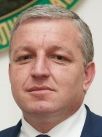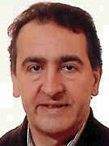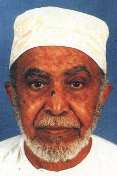Rulers
Index Ba
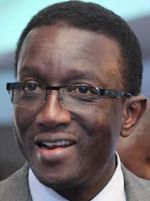
A. Ba |
Ba, Amadou (b. May 17, 1961, Dakar, Senegal), economy and finance minister (2013-19), foreign minister (2019-20), and prime minister (2022- ) of Senegal.
Ba, Amadou Moustapha (b. Aug. 6, 1965, Nioro du Rip, Senegal), finance minister of Senegal (2022- ).

B. Ba |
Ba, Babacar (b. June 14, 1930, Kaolack, Senegal - d. Dec. 13, 2006, Dakar, Senegal), finance and economic affairs minister (1971-78) and foreign minister (1978) of Senegal.
Ba, Ibrahima, finance minister of Mauritania (1977-78). He was also minister of planning (1975-77), crafts and tourism (1977), and commerce (1978).
Ba, Ousmane (b. 1919, Ségou, French Sudan [now Mali] - d. Oct. 24, 1999), foreign minister of Mali (1964-68). He was also minister of civil service of Upper Volta (1957-58), minister of labour, civil service, and social security of the Mali Federation (1959-60), and minister of civil service and social laws (1961-62) and interior, information, and tourism (1962-64) of Mali. Arrested after the 1968 coup, he was released in 1975.
Ba, Ousmane, Mauritanian politician. He was minister of primary education (2013-14) and national education (2014-16), ambassador to The Gambia (2016-17), and permanent representative to the United Nations (2017-19).
Ba Maw (b. Feb. 8, 1893, Maubin, Burma [now Myanmar] - d. May 29, 1977, Rangoon, Burma [now Yangon, Myanmar]), Burmese politician. He first came to prominence in 1931 as defense lawyer for the Burmese rebel leader Saya San in the colonial courts. He became a prominent opponent of Britain's plan to separate Burma from India, since he believed that a separate Burma would receive a much smaller measure of self-rule than India as a result, but he reversed his position in 1934, agreeing to support the pro-separationists in a coalition government. That year he was made minister of education. In 1936 he founded the Sinyetha (Poor Man's) Party. When the new constitution, providing for separation of Burma from India, went into effect on April 1, 1937, he became the first premier. He attended the coronation of King George VI and held office until he was defeated by a coalition in February 1939. After his defeat, Ba Maw allied with other Burmese leaders to form the Freedom Bloc, which opposed Burma's participation with the Allies in World War II. In August 1940 he was arrested by the British for sedition and remained in prison until the Japanese invasion in 1942. During the Japanese occupation, he was adipati (head of state) of a theoretically independent Burma (1943-45), although the country was actually a Japanese satellite. He fled to Japan when the Allies reentered Burma. Eventually captured, he was imprisoned by the Americans in Sugawo prison in Tokyo from December 1945 to July 1946. Returning to Burma after his release, he founded the Mahabama (Greater Burma) Party but this had little success. He was again jailed from August to December 1947 on suspicion of complicity in the assassinations of Aung San and other leading ministers in July 1947.
Ba Swe (b. Oct. 7, 1915, Onbinkwin, Burma [now Myanmar] - d. December 1987), defense minister (1952-58) and prime minister (1956-57) of Burma.
Ba U (b. May 26, 1887, Bassein, Burma [now Myanmar] - d. Nov. 9, 1963), president of Burma (1952-57). He was also chief justice of the Supreme Court (1948-52). He was knighted in 1947 but upon becoming president became known as Dr. Ba U rather than Sir Ba U.
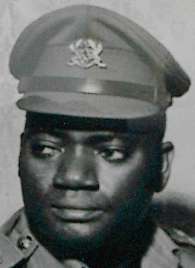
K.R.M. Baah |
Baah, Kwame R.M. (b. May 21, 1938, Dormaa Ahenkro, Brong Ahafo region, Gold Coast [now in Ghana] - d. 1997), foreign minister of Ghana (1972-75).
Baah Wiredu, Kwadwo (b. June 3, 1952 - d. Sept. 24, 2008, Pretoria, South Africa), finance minister of Ghana (2005-08). He was also minister of local government and rural development (2001-03) and education, youth, and sports (2003-05).
Baako, Kofi (b. April 1926, Saltpond, Gold Coast [now in Ghana] - d. Oct. 4, 1984, Accra, Ghana), defense minister of Ghana (1961-66). He was also minister of education (1959), information (1959-60), and parliamentary affairs (1960-61).
Baal, Jan van (b. Nov. 25, 1909, Scheveningen, Zuid-Holland, Netherlands - d. Aug. 9, 1992, Doorn, Utrecht, Netherlands), governor of Netherlands New Guinea (1953-58). He was also known as an anthropologist.
Baali, Abdallah (b. Oct. 19, 1954, Guelma, Algeria), Algerian diplomat. He was ambassador to Indonesia, Australia, New Zealand, and Brunei (1992-96) and the United States (2008-15) and permanent representative to the United Nations (1996-2005). In 2019 he was appointed ambassador to France but did not take up the post.
Baaro, Makurita (b. Feb. 17, 1957), Kiribati diplomat. She was permanent representative to the United Nations (2013-17) and ambassador to the United States (2014-17).
Baars, Karl August, also called Kaarel Baars (b. March 13, 1875, Iigaste, Tartu county, Russia [now in Estonia] - d. Feb. 27, 1942, Kirov oblast, Russian S.F.S.R.), finance minister of Estonia (1920-21, 1924). He was also acting minister of justice (1921) and trade and industry (1924).
Baarspul, Jan Christoffel (b. Feb. 25, 1910, Utrecht, Netherlands - d. Oct. 15, 1988, Utrecht), acting governor of Netherlands New Guinea (1958).
Baati, Moncef (b. June 11, 1953), Tunisian diplomat. He was chargé d'affaires in Sweden (2002-05), ambassador to South Korea (2005-07), and permanent representative to the United Nations (2019-20).
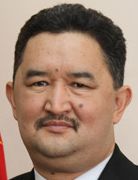
Baatyrbekov | 
T. Baba |
Baatyrbekov, Almazbek (Baatyrbekovich) (b. Oct. 16, 1970, At-Bashi, Kirgiz S.S.R. [now in Naryn oblast, Kyrgyzstan]), first deputy prime minister (2020) and acting prime minister (2020) of Kyrgyzstan.
Baba, Eiichi (b. Oct. 5, 1879, Tokyo, Japan - d. Dec. 21, 1937, Tokyo), finance minister (1936-37) and home affairs minister (1937) of Japan.
Baba, Tupeni (Labaivalu) (b. June 14, 1942, Fiji), foreign minister of Fiji (1999-2000).
Baba Ammi, Hadji (b. Feb. 3, 1944, Beni Isguen, Algeria), finance minister of Algeria (2016-17).
Baba Hassane, Mahamat Saleh, byname Aboudiguine Baba Hassane (b. Jan. 25, 1933, Bongor, Chad), foreign minister of Chad (1971-73). He was also minister of social affairs (1957-58), animal husbandry (1958-59), economy (1959), justice (1960), economy and transport (1960-62), and tourism, information, and traditional affairs (1973-75) and ambassador to Nigeria (1967-71).
Babac, Branko (b. May 28, 1939, Zara, Italy [now Zadar, Croatia] - d. Aug. 11, 2012, Zagreb, Croatia), justice minister of Croatia (1990-91). He was also ombudsman (1993-96).

Babacan |
Babacan, Ali (b. 1967, Ankara, Turkey), foreign minister of Turkey (2007-09). He was also economy minister (2002-07) and a deputy prime minister (2009-15).
Babakuliyev, Dzhorakuly, Turkmen Joraguly Babagulyýew (b. 1946, Amu-Darya, Chardzhou oblast, Turkmen S.S.R. [now Lebap velayat, Turkmenistan]), a deputy prime minister of Turkmenistan (1992-94).
Babalola, Remi (b. Sept. 8, 1964, in present Oyo state, Nigeria), Nigerian politician; acting minister for the Federal Capital Territory (2008).
Babamine, Cheikh Sid'Ahmed Ould (b. 1946, Tichitt, Mauritania), interior minister (1980) and foreign minister (1984) of Mauritania. Between 1985 and 2005 he was ambassador to Nigeria, Benin, Algeria, China, South Korea, and the United Arab Emirates.
Baban, Ahmad Mukhtar (b. 1900, Baghdad, Iraq - d. 1976, Germany), prime minister of Iraq (1958). He was also minister of social affairs (1942-43, 1946), justice (1943-46), education (acting, 1957), and defense (1957), deputy prime minister (1954, 1955-57), and minister without portfolio (1954-55). After the overthrow of the monarchy in 1958, he was arrested, tried, and condemned to death, but the sentence was commuted; he was released in 1961.
Baban, Jalal (b. 1892 - d. ...), defense minister (1933) and finance minister (1943, 1949) of Iraq. He was also minister of works (1932-33, 1937-38, 1939-40, 1941, 1948, 1949), education (1934), and social affairs (1948-49).

Babangida |
Babangida, Ibrahim (Badamasi) (b. Aug. 17, 1941, Minna, Niger state, Nigeria), military leader of Nigeria (1985-93). After holding various military commands, in 1975 he was sworn in as a member of Murtala Mohammed's Supreme Military Council (SMC). He played a vital role in suppressing the attempted coup of Feb. 13, 1976, when, unarmed, he walked into the rebel-held radio station. During the 30-month civil war he distinguished himself as an able frontline soldier. Babangida was generally credited with masterminding the coup that overthrew Pres. Alhaji Shehu Shagari at the end of 1983, and he supported Muhammadu Buhari as the new head of state. Under Buhari he was chief of army staff and a member of the SMC. Babangida took power in Nigeria's sixth military coup, on Aug. 27, 1985. He was a very different soldier from the austere and remote Buhari. Major General Babangida was a tough character, with a reputation for personal courage and decisiveness, who enjoyed the respect and loyalty of the soldiers who were the basis of his power. He made a virtual clean sweep of the old faces, retaining only six of Buhari's ministers. He told his new ministers that they had been selected on their merits and not for regional or tribal reasons and stated that he intended to run "a government of action committed to a program with clear economic and social goals." He insisted that it had to be an open government; ministers did not know all the answers, and they should be ready to consult with others. He was also determined to defend human rights, and one of his first actions was to release political detainees. He was OAU chairman in 1991-92. He allowed presidential elections in 1993, but annulled the results. He stepped down and handed power over to a nonelected interim government.
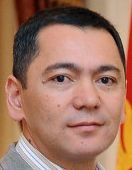
Babanov |
Babanov, Omurbek (Toktogulovich) (b. May 20, 1970, Shymkent village, Talas oblast, Kirgiz S.S.R.), prime minister of Kyrgyzstan (2011-12). He was a presidential candidate in 2017.
Babar, Naseerullah Khan (b. 1928, Ismail Khel, North-West Frontier Province, India [now Khyber Pakhtunkhwa province, Pakistan] - d. Jan. 10, 2011, Peshawar, Khyber Pakhtunkhwa, Pakistan), governor of the North-West Frontier Province (1976-77) and interior minister of Pakistan (1993-96).
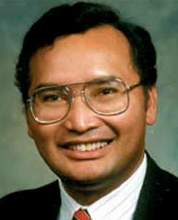
Babauta | 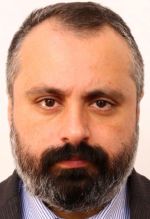
D. Babayan |
Babauta, Juan N(ekai) (b. Sept. 7, 1953, Tanapag, Saipan, Northern Mariana Islands), governor of the Northern Mariana Islands (2002-06).
Babayan, David (Klimovich) (b. April 5, 1973, Stepanakert, Nagorno-Karabakh autonomous oblast, Azerbaijan S.S.R.), foreign minister of Artsakh (2021- ).
Babayan, Samvel (Andranikovich) (b. March 5, 1965, Stepanakert, Nagorno-Karabakh autonomous oblast, Azerbaijan S.S.R.), defense minister of Nagorno-Karabakh (1994-99). He rose to prominence during the military phase of the Nagorno-Karabakh conflict, in 1991-94. He became commander of the Self-Defense Forces in 1993 and in this capacity co-signed the Moscow ceasefire agreement between Armenia, Azerbaijan, and Nagorno-Karabakh in May 1994. He additionally became defense minister in December 1994. With the region on a war footing, he had considerable power and autonomy, with little oversight from the civilian authorities. As long as Robert Kocharyan was in power in Karabakh, Babayan was under control, although he appeared to use his position to acquire land, enterprises, and tax and customs privileges for himself and his cronies. Once Kocharyan left to become prime minister of Armenia in March 1997, Babayan began to assert his influence over the civilian government in Stepanakert in a more overt fashion, again evidently abusing his office for personal aggrandizement. In 1998 he opposed Armenian president Levon Ter-Petrosyan, who eventually resigned; and he also forced Karabakh prime minister Leonard Petrosyan to resign. Armenian leaders then joined forces to restrain his influence and he lost the defense portfolio and the commander position in 1999. After an assassination attempt on the Nagorno-Karabakh president Arkady Gukasyan in 2000, he was arrested and in 2001 found guilty of masterminding the attack and sentenced to 14 years in prison. After his early release in 2004, Babayan relocated to Yerevan, where he set up a political party that fared poorly in the 2007 Armenian parliamentary elections, and then emigrated to Russia in 2011. He returned to Armenia in May 2016, citing what he said was the increased risk of renewed war with Azerbaijan over Nagorno-Karabakh and the neighboring regions that the separatists control.
Babayan, Semyon (Amayakovich) (b. 1932, Baku, Azerbaijan S.S.R.), chairman of the Executive Committee of Nagorno-Karabakh autonomous oblast (1988-91).
Babayev, Aloviddin (Ishanovich) (b. Nov. 5, 1931 - d. Dec. 15, 1994, Khujand, Tajikistan), first secretary of the Communist Party committee of Gorno-Badakhshan autonomous oblast (1978-82). He was also minister of agriculture of the Tadzhik S.S.R. (1982-85).
Babayev, Chary, Turkmen diplomat; grandson of Khivali Babayev. He was ambassador to the United Kingdom (1999-2003).
Babayev, Khivali (Babayevich) (b. 1902, Kazandzhik, Zakaspiyskaya oblast, Russia [now Bereket, Turkmenistan] - d. Aug. 30, 1941, Ashkhabad, Turkmen S.S.R. [now Ashgabat, Turkmenistan]), chairman of the Central Executive Committee (1937-38) and of the Presidium of the Supreme Soviet (1938-41) of the Turkmen S.S.R.
Babayev, Maksat (Mamedsaparovich), Turkmen Maksat (Mämmetsaparowiç) Babaýew (b. 1974, Ashkhabad, Turkmen S.S.R. [now Ashgabat, Turkmenistan]), a deputy prime minister of Turkmenistan (2017-18). He was also minister of state and chairman of Turkmengaz State Concern (2017).
Babayev, Serdar (Myatiyevich) (b. 1956, Ashkhabad, Turkmen S.S.R. [now Ashgabat, Turkmenistan]), Turkmen politician; grandson of Khivali Babayev. He was head of Balkan velayat (1997-99), minister of agriculture and water economy (1999-2000), and a deputy prime minister (1999-2000).
Babayev, Sukhan (Babayevich) (b. Dec. 25 [Dec. 12, O.S.], 1910, Yuzbash, Zakaspiyskaya oblast, Russia [now in Turkmenistan or Kazakhstan] - d. Nov. 28, 1995), chairman of the Council of People's Commissars/Ministers (1945-51) and first secretary of the Communist Party (1951-58) of the Turkmen S.S.R. He was also people's commissar of state control and a deputy premier (1941) and first secretary of the party committee of Chardzhou oblast (1943-45).
Babbah, Mohameden Ould (b. 1935, Akjout, western Mauritania), defense minister of Mauritania (1978). He was also minister of higher education (1971-73), national education (1973-75), basic education (1975-77), and industry, commerce, and transport (1977-78).
Babbitt, Bruce (Edward) (b. June 27, 1938, Los Angeles, Calif.), governor of Arizona (1978-87) and U.S. secretary of the interior (1993-2001). He was a candidate for the 1988 Democratic presidential nomination.
Babcock, Tim M(ilford) (b. Oct. 27, 1919, Littlefork, Minn. - d. April 7, 2015, Helena, Mont.), governor of Montana (1962-69).
Babel, Jean (Baptiste) (b. Nov. 6, 1921, Petit-Lancy, Genève, Switzerland - d. Nov. 20, 2005, Onex, Genève), president of the Council of State of Genève (1969-70, 1975-76).
Babenko, Vladimir (Dmitriyevich) (b. Jan. 20, 1931 - d. April 24, 1996), head of the administration of Tambov oblast (1991-95).
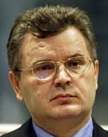
Babic | 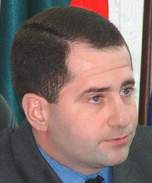
M. Babich |
Babic, Milan (b. Feb. 26, 1956, Kukar village, Sinj municipality, Croatia - d. March 5, 2006, The Hague, Netherlands), president (1991-92) and prime minister (1995) of Krajina. On June 29, 2004, he was sentenced to 13 years' imprisonment by the war crimes tribunal in The Hague for inflaming an ethnic cleansing campaign of "ruthlessness and savagery." He committed suicide in his cell.
Babich, Mikhail (Viktorovich) (b. May 12, 1969, Moscow, Russian S.F.S.R.), prime minister of Chechnya (2002-03) and plenipotentiary of the Russian president in Privolzhsky federal district (2011-18). In 2018-19 he was Russian ambassador to Belarus.
Babich, Vasily (Ivanovich) (b. 1912 - d. 1988), first secretary of the Communist Party committee of the Kabardian A.S.S.R. (1949-56).
Babichev, Vladimir (Stepanovich) (b. Jan. 11, 1939, Sadovoye, Kalmyk A.S.S.R., Russian S.F.S.R. - d. Dec. 15, 2010), head of the Government Apparatus (1994-98) and a deputy prime minister (1996-97) of Russia. He was also ambassador to Kazakhstan (2003-06).
Babikian, Khatchik (Diran) (b. Oct. 5, 1924, Larnaca, Cyprus - d. Nov. 4, 1999, Beirut, Lebanon), Lebanese politician. He was minister of state in charge of administrative reform (1960-61) and minister of health (1969), tourism (1969-70), information (1972-73), planning (1973), and justice (1980-82, 1990-92).
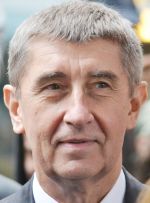
Babis | 
Babiuch |
Babis, Andrej (b. Sept. 2, 1954, Bratislava, Czechoslovakia [now in Slovakia]), finance minister (and a deputy prime minister) (2014-17) and prime minister (2017-21) of the Czech Republic. He was a presidential candidate in 2023.
Babiuc, Victor (b. April 3, 1938, Rachiti, Botosani county, Romania - d. Feb. 25, 2023), justice minister (1990-91), interior minister (1991-92), and defense minister (1996-98, 1998-2000) of Romania.
Babiuch, Edward (Mikolaj) (b. Dec. 28, 1927, Grabocin village, Bedzin county, Slaskie województwo, Poland - d. Feb. 2, 2021), prime minister of Poland (1980).
Babkin, Ivan (Petrovich) (b. Jan. 4, 1885, Moscow, Russia - d. 1940), acting chairman of the Council of People's Commissars of the Karelo-Finnish S.S.R. (1940).
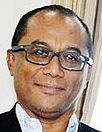
Babo |
Babo (Soares), Dionísio (da Costa) (b. Aug. 16, 1966, Ermera, Portuguese Timor [now Timor-Leste]), foreign minister of Timor-Leste (2018-20). He was also justice minister (2012-15) and minister of state, coordinator of administrative affairs, and minister of state administration (2015-17).
Babu, Sheikh Abdulrahman Muhammad, Arabic Shaykh `Abd al-Rahman Muhammad Babu (b. Sept. 22, 1924, Zanzibar - d. Aug. 5, 1996, London, England), foreign and defense minister of Zanzibar (1964). He was also minister of commerce and cooperatives (1965-67), health (1967), land settlement and water development (1967-68), commerce and industry (1968-70), and economic affairs and development planning (1970-72) of Tanzania.
Baburin, Sergey (Nikolayevich) (b. Jan. 31, 1959, Semipalatinsk, Kazakh S.S.R. [now Semey, Kazakhstan]), Russian politician. He has been chairman of the Russian People's Union (1991- ) and a minor presidential candidate (2018).
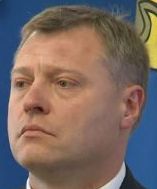
Babushkin |
Babushkin, Igor (Yuryevich) (b. April 5, 1970, Rybinsk, Yaroslavl oblast, Russian S.F.S.R.), governor of Astrakhan oblast (2019- ).
Baca (Aguilar), Francisco (Antonio Abad) (b. Jan. 18, 1822, León, Nicaragua - d. May 17, 1901), provisional president in dissidence of Nicaragua (1869).
Baca, Francisco, hijo, in full Juan Francisco Baca Ycaza (b. Feb. 4, 1855, León, Nicaragua - d. July 5, 1917), minister of interior, police, justice, and ecclesiastical affairs (1893-94) and acting president in dissidence (1896) of Nicaragua; son of Francisco Baca.
Baca, Jim, byname of James R. Baca (b. September 1945, Albuquerque, N.M.), mayor of Albuquerque (1997-2001). He was also director of the U.S. Bureau of Land Management (1993-94).
Baca Calderón, Esteban, original name Esteban Baca Ojeda (b. May 6, 1876, Real de Acuitapilco, Santa María del Oro municipality, Jalisco [now in Nayarit], Mexico - d. March 29, 1957, Nuevo Laredo, Tamaulipas, Mexico), interim governor of Colima (1914-15) and Nayarit (1928-29).
Baca Campodónico, Jorge (Francisco) (b. June 22, 1950, Chiclayo, Peru), finance minister of Peru (1998-99).
Baca Carbo, Raúl (Oswaldo) (b. June 29, 1931, Quito, Ecuador - d. May 7, 2014, Quito), interior minister of Ecuador (2003-04). He was also governor of Guayas (1975-77), mayor of Guayaquil (1977-78), president of the Chamber of Representatives (1980-82), the Andean Parliament (1982-83), and the National Congress (1984-85), minister of social welfare (1988-91) and energy and mines (1997-98), and a presidential candidate (1992).

Bacar |
Bacar, Mohamed (b. May 5, 1962, Barakani, Anjouan, Comoros), president of Anjouan (2001-07, 2007-08). The commander of the Anjouan gendarmerie from 1997, Bacar became the head of state of the secessionist island after overthrowing Said Abeid in August 2001. In December, he was promoted to the rank of colonel. Under the new federal constitution, he was elected president of the autonomous island in 2002, but his new election in 2007 - which he organized himself after the presidency was declared vacant by the Federal Constitutional Court - was not recognized by the union government and a military operation ended his regime. He fled to Mayotte, where he sought political asylum from France. He was transferred to Réunion pending a decision. He was denied asylum, but extradition was rejected and he was expelled to Benin. In 2015 Comoros president Ikililou Dhoinine signed a reconciliation decree allowing him to return, though he did not immediately do so.
Baccar, Taoufik (b. July 4, 1950, Chenini village, southern Tunisia), finance minister of Tunisia (1999-2004). He was a senior civil servant at the planning and finance ministry from 1982 until his appointment as minister for economic development in 1995. In 2004-11 he was head of the central bank.
Baccelli, Guido (b. Nov. 25, 1830, Rome, Papal State [now in Italy] - d. Jan. 10, 1916, Rome), Italian politician. A renowned physician, he was minister of education (1881-84, 1893-96, 1898-1900) and agriculture, industry, and commerce (1901-03).

Bacciocchi | 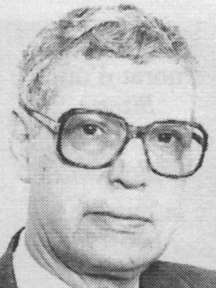
H. Baccouche |
Bacciocchi, Antonello (b. Nov. 2, 1957, San Marino), captain-regent of San Marino (1999, 2005-06). He was also secretary of state for labour and cooperation (2006-07) and tourism, sport, telecommunications, and economic cooperation (2007-08).
Baccouche, Hédi, Arabic al-Hadi al-Bakkush (b. Jan. 15, 1930, Hammam-Sousse, Tunisia - d. Jan. 21, 2020), prime minister of Tunisia (1987-89). He was also governor of Bizerte (1964-67), Sfax (1967-69), and Gabès (1969-70), ambassador to Switzerland and the Vatican (1981-82) and Algeria (1982-84), and social affairs minister (1987).
Baccouche, Slaheddine, Arabic in full Salah al-Din ibn Muhammad al-Bakkush (b. Aug. 14, 1883 - d. Dec. 24, 1959), prime minister of Tunisia (1943-47, 1952-54).
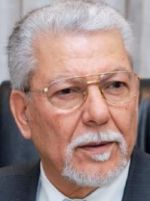
T. Baccouche |
Baccouche, Taieb, Arabic al-Tayyib al-Bakkush (b. April 13, 1944, Jemmal, Tunisia), foreign minister of Tunisia (2015-16). He was also education minister (2011). In 1981-84 he was secretary-general of the main labour union UGTT.
Bacelar, José de Abreu Barbosa (b. May 19, 1866, Beja, Portugal - d. Nov. 30, 1946, Lisbon, Portugal), acting governor-general of Angola (1921).
Bacellar, Pedro de Alcântara (b. June 29, 1875, Feira de Santana, Bahia, Brazil - d. April 21, 1927, Manaus, Amazonas, Brazil), governor of Amazonas (1917-21).
Bach, Alexander Freiherr von (b. Jan. 4, 1813, Loosdorf, Niederösterreich, Austria - d. Nov. 12, 1893, Unterwaltersdorf [now part of Ebreichsdorf], Niederösterreich), justice minister (1848) and interior minister (1849-59) of Austria. He was also ambassador to the Papal State (1859-67).
Bach, Eduard Freiherr von (b. Dec. 21, 1814, Loosdorf, Niederösterreich, Austria - d. Feb. 8, 1884, Vienna, Austria), Statthalter of Oberösterreich (1851-62); brother of Alexander Freiherr von Bach.
Bach, Jacques (Frédéric Gabriel) (b. Jan. 14, 1927, Nantes, France - d. March 18, 2016, Paris, France), administrator-superior of Wallis and Futuna (1968-71).
Bache, Richard (b. Sept. 12, 1737, Settle, Yorkshire, England - d. July 29, 1811, Bucks county, Pa.), U.S. postmaster general (1776-82); son-in-law of Benjamin Franklin.
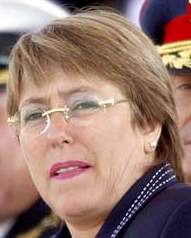
Bachelet |
Bachelet (Jeria), (Verónica) Michelle (b. Sept. 29, 1951, Santiago, Chile), president of Chile (2006-10, 2014-18). After the coup of 1973 that put Gen. Augusto Pinochet in power, her father, Gen. Alberto Bachelet, who was the head of the air forces during Salvador Allende's government, died in prison in March 1974, a victim of torture. In January 1975 she was herself, together with her mother, taken to the notorious Villa Grimaldi torture centre; they were set free less than a month later and went into exile, first to Australia and then (May 1975) to East Germany. In February 1979 she returned to Chile to do political underground work for the Socialist Party. After the restoration of democracy in 1990, she became health minister (2000-02) and defense minister (2002-04); her popularity skyrocketed as she pushed for a reconciliation between the country's civilians and the military. She was the successful candidate of the centre-left Concertación coalition in the December 2005-January 2006 presidential election, becoming the country's first female president. Although her approval rating plunged in 2007 to a low point of 35% as her government was hurt by discontent over the troubled implementation of a mass transit system for the capital Santiago, it started to rebound in 2008 as voters applauded the extensive social policies and able handling of the local economy amid the global financial crisis. Constitutionally barred from reelection after four years, she left office with 84% approval ratings. However, her huge personal popularity could not be transferred to the Concertación presidential candidate in the 2009-10 election, Eduardo Frei, and Chileans instead elected Sebastián Piñera, who lost to Bachelet in 2006, as the first right-wing president in 20 years. In September 2010 she was appointed head of the new UN Entity for Gender Equality and the Empowerment of Women. In 2013 she was again elected president in a landslide victory over right-wing candidate Evelyn Matthei. In 2018-22 she was UN high commissioner for human rights.
Bachmann, Michele (Marie), née Amble (b. April 6, 1956, Waterloo, Iowa), U.S. politician. She was a representative from Minnesota (2007-15) and a candidate for the 2012 Republican presidential nomination.

Bachtobji |
Bachtobji, Sabri (b. Oct. 3, 1963, Menzel Temime, Tunisia), acting foreign minister of Tunisia (2019-20). He was also ambassador to Brazil (2013-16).
Bachvarova, Rumyana (Gencheva) (b. March 13, 1959, Shipka, Stara Zagora, Bulgaria), a deputy prime minister (2014-17) and interior minister (2015-17) of Bulgaria. She has also been ambassador to Israel (2019- ).
Bacílek, Karol (Jozef) (b. Oct. 2, 1896, Chotánky, Austria [now in Czech Republic] - d. March 19, 1974, Bratislava, Slovakia), Czechoslovak politician. He was minister of state control (1951-52) and state security (1952-53) and a deputy premier (1953) of Czechoslovakia and first secretary of the Communist Party of Slovakia (1953-63).
Baciocchi Bonaparte, Elisa, née Maria Anna Bonaparte (b. Jan. 3, 1777, Ajaccio, Corsica [now in France] - d. Aug. 6, 1820, near Trieste, Austria [now in Italy]), governor-general of Tuscany (1809-14); sister of Napoléon I; wife of Felice.
Backe, Otto (b. March 14, 1874, Botne [now part of Holmestrand municipality], Jarlsberg og Larvik amt [now in Vestfold og Telemark fylke], Norway - d. July 7, 1928), governor of Troms (1921-28).
Backer, Albert Johan (b. May 31, 1899, Groningen, Netherlands - d. ...), provincial commissioner of Noord-Holland (1941-45).
Backer, Alfredo Augusto Guimarães (b. 1851, Macaé, Rio de Janeiro, Brazil - d. Dec. 25, 1937, Niterói, Rio de Janeiro, Brazil), president of Rio de Janeiro (1906-10).
Backer, Cornelis (b. Nov. 20, 1798, Groningen, Batavian Republic [now Netherlands] - d. June 30, 1864, Zwolle, Netherlands), king's commissioner of Overijssel (1850-64).
Backes, Yuriko (b. Dec. 22, 1970, Kobe, Japan), finance minister of Luxembourg (2022- ). She was also marshal of the Grand-Ducal Court (2020-22).
Backis, Ricardas (b. Oct. 23, 1934, Kaunas, Lithuania), Lithuanian diplomat; son of Stasys Backis. He was ambassador to France (1994-98).
Backis, Stasys (Antanas) (b. Feb. 10, 1906, Joniskelis, Russia [now in Lithuania] - d. Nov. 10, 1999, Vilnius, Lithuania), head of the Lithuanian diplomatic service in exile (1983-87).
Bäckström, (Nils) Birger (b. Feb. 10, 1937, Luleå, Norrbotten, Sweden - d. Oct. 23, 2016), governor of Skaraborg (1991-97). He was also director-general of the Swedish Agency for Government Employers (1983-91).
Bäckström, Lars (Christer) (b. March 16, 1953, Uddevalla, Göteborg och Bohus [now in Västra Götaland], Sweden), governor of Västra Götaland (2008-17).
Baco de la Chapelle, René Gaston (b. April 28, 1751, Nantes [now in Loire-Atlantique département], France - d. Dec. 30, 1800), mayor of Nantes (1792-93) and co-agent of Guadeloupe (1799-1800).

J. Bacon | 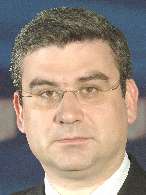
Baconschi |
Bacon, Jim, byname of James Alexander Bacon (b. May 15, 1950, Melbourne, Vic. - d. June 20, 2004, Hobart, Tas.), premier of Tasmania (1998-2004).
Bacon, Robert (b. July 5, 1860, Jamaica Plain, near Boston, Mass. - d. May 29, 1919, New York City), U.S. secretary of state (1909). He was also ambassador to France (1909-12).
Baconschi, Teodor (Anatol) (b. Feb. 14, 1963, Bucharest, Romania), foreign minister of Romania (2009-12). He was ambassador to the Holy See (1997-2001), Portugal (2002-04), and France (2007-09). He was dismissed as foreign minister after he called anti-government protesters "inept and violent slum dwellers."

Badal |
Badal, Parkash Singh (b. Dec. 8, 1927, Abul Khurana village, Faridkot district, Punjab, India), chief minister of Punjab (1970-71, 1977-80, 1997-2002, 2007-17). His active participation in political life goes back to the days before independence. He joined the Shiromani Akali Dal (SAD) party in 1947. He was elected to the Punjab State Assembly for the first time in 1957, again in the mid-term poll of 1969, and again in 1972. In 1969 he was taken into the cabinet as development minister. After his first term as chief minister (1970-71), he was leader of the opposition in the Assembly from 1972 to July 1975. From July 9, 1975, to Jan. 19, 1977, he was detained during the state of emergency. In March 1977, he was elected to the Indian parliament from Faridkot. He was union minister for agriculture and irrigation from March 26 to June 17, 1977, then became chief minister of Punjab again. In 1980 and 1985 he was again elected to the State Assembly, where he was leader of the opposition. After the February 1997 state election, he became chief minister a third time, in alliance with the Bharatiya Janata Party (BJP). After leading his alliance to a stunning victory in the 2007 elections, he took over as chief minister for a record fourth time at the head of another SAD-BJP coalition ministry. He inducted four of his relatives into the ministry: his son-in-law Adesh Partap Singh Kairon, nephew Manpreet Singh Badal, his son Sukhbir's brother-in-law Bikram Singh Majithia, and another close relative, Janmeja Singh Sekhon.
Badamdorj, Chin Van (d. 1920), interior minister (1915-19) and prime minister (1919) of Mongolia.
Badamyan, Suren (Mirzoyevich) (b. 1895 - d. af. 1975), chairman of the Executive Committee of Nagorny Karabakh (1935?-37).
Badarou, Daouda (b. 1929, Porto-Novo, Dahomey [now Benin]), foreign minister of Dahomey (1968-69, 1970-71). He was also minister of health (1965-67) and ambassador to France (1971-73).
Badawi, Abdel Halim (b. July 26, 1930), Egyptian diplomat. He was ambassador to Portugal (1978-80) and permanent representative to the United Nations (1986-90).
Badawi Pasha, Abdelhamid (b. March 13, 1887, Mansoura, Egypt - d. Aug. 4, 1965), finance minister (1940-41) and foreign minister (1945-46) of Egypt. He was also a judge at the International Court of Justice in 1946-65.
Badayev, Aleksey (Yegorovich) (b. Nov. 16 [Nov. 4, O.S.], 1883, Yuryevo, Oryol province, Russia - d. Nov. 3, 1951, Moscow, Russian S.F.S.R.), chairman of the Presidium of the Supreme Soviet of the Russian S.F.S.R. (1938-44). He was also a member of the Russian State Duma (1912-14) and people's commissar of food industry (1937-38).
Baddon, Ken(neth Ian), acting governor of Saint Helena (2011).
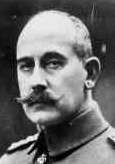
Baden |
Baden, Max(imilian Alexander Friedrich Wilhelm) Prinz von (b. July 10, 1867, Baden-Baden, Baden [Germany] - d. Nov. 6, 1929, Schloss Salem, Baden, Germany), chancellor of Germany (1918). The son of Prince Wilhelm of Baden (brother of Grand Duke Friedrich I), Max in 1907 became heir presumptive to the grand duchy because his cousin Grand Duke Friedrich II (d. 1928) had no children. Entering politics, he became president of the upper chamber of the Baden Diet in 1910. In the first years of World War I he devoted himself to the Red Cross and specialized in the care of prisoners of war. It was he who, in 1915, suggested the German-Russian prisoners of war conference. He was a moderating influence on the policy of the annexationists in Germany, but he was not consulted until Oct. 3, 1918, when Germany was on the verge of collapse and he was made chancellor of the empire and prime minister of Prussia in succession to Georg Hertling. He was appointed because his humanitarian reputation made the emperor Wilhelm II think him capable of bringing the war expeditiously to an end. He hastily superintended the constitutional changes whereby a genuine parliamentary system was at last brought into being in Germany, began negotiations for an armistice, and secured the dismissal of Army Chief of Staff Erich Ludendorff - but too late to save the monarchy. When Wilhelm II would give no definite answer to Max's demands that he should abdicate in the face of the danger of Communist revolution, Max finally himself announced the abdication of the emperor on Nov. 9, 1918. He then resigned the chancellery to the leader of the Majority Social Democratic Party, Friedrich Ebert. He was asked by Ebert to remain as regent, but refused. He also renounced all claim to the throne of Baden.
Badeni, Kasimir Felix Graf (Count), Polish Kazimierz Feliks hrabia Badeni (b. Oct. 14, 1846, Surochów, Galicia, Austria [now in Poland] - d. July 9, 1909, near Krasne, Galicia), Statthalter of Galicia (1888-95) and prime minister and interior minister of Austria (1895-97).
Badens, Pierre de (b. Jan. 3, 1847, Castelsarrasin, Tarn-et-Garonne, France - d. [drowned] July 10, 1897, Lo river, near Ha Giang, northern Tonkin [now in Vietnam]), provisional resident-general of Cambodia (1885-86).
Badeyev, Iosif (Isaakovich), original surname Suslik (b. January 1880, Orgeyev, Bessarabia province, Russia [now Orhei, Moldova] - d. [executed] Oct. 11, 1937), executive secretary of the Communist Party committee of the Moldavian A.S.S.R. (1924-28).
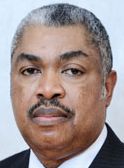
Badibanga |
Badibanga (Ntita), Sam(bad)y (b. Sept. 12, 1962, Léopoldville [now Kinshasa], Congo), prime minister of Congo (Kinshasa) (2016-17).
Badinter, Robert (b. March 30, 1928, Paris, France), justice minister of France (1981-86). He was also president of the Constitutional Council (1986-95).
Badiyev, Aleksandr (Alekseyevich) (b. March 24, 1925, Nukuty, Irkutsk oblast, Russian S.F.S.R. - d. Dec. 17, 1995, Ulan-Ude, Buryatia, Russia), chairman of the Presidium of the Supreme Soviet of the Buryat A.S.S.R. (1984-87).
Badji, Paul (b. April 28, 1952, Ziguinchor, Senegal), Senegalese diplomat. He was ambassador to Germany and Austria (2002-03), Belgium (2010-13), and France (2013-15) and permanent representative to the United Nations (2004-10).
Badlani, K(ishanchand) G(obindram) (b. July 1921, Rohri, Sind, India [now in Sindh, Pakistan] - d. Dec. 1, 1997), administrator of Dadra and Nagar Haveli (1960-62).
Badmakhalgayev, Lag (Tsaganmandzhiyevich) (b. Dec. 8, 1935, Shokha, Kalmyk A.S.S.R., Russian S.F.S.R.), chairman of the Council of Ministers of the Kalmyk A.S.S.R. (1974-89).

Badnarik | 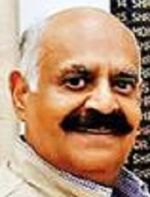
Badnore |
Badnarik, Michael (James) (b. Aug. 1, 1954, Hammond, Ind. - d. Aug. 11, 2022, San Antonio, Texas), U.S. Libertarian Party presidential candidate (2004).
Badnore, V.P. Singh (b. May 12, 1948, Badnore [now in Bhilwara district, Rajasthan], India), governor of Punjab (2016-21).
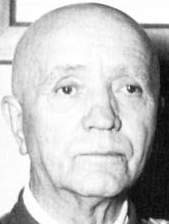
Badoglio |
Badoglio, Pietro, (from 1929) marchese del Sabotino, (from 1936) duca di Addis Abeba (b. Sept. 28, 1871, Grazzano Monferrato [now Grazzano Badoglio], Piemonte, Italy - d. Oct. 31, 1956, Grazzano Badoglio), prime minister of Italy (1943-44). He entered the Italian Army in 1890 as an artillery officer and saw hard service in the East African campaign of 1896 in which the Ethiopians defeated the Italians. He also fought in the Libyan campaign of 1911-12. In World War I he distinguished himself by directing the capture of Monte Sabotino (Aug. 6, 1916); later he conducted the armistice talks for the Italians. He was chief of the Italian general staff in 1919-21. Initially lukewarm to Benito Mussolini, he served briefly as ambassador to Brazil (1924-25) before Mussolini named him chief of staff once again on May 4, 1925. He was made a field marshal on May 26, 1926. From 1929 to 1933 he was governor of Tripolitania. He was placed in command of the Italian forces in Ethiopia on Nov. 15, 1935, conducted the operations against the poorly armed Ethiopians with ruthless competence, and in May 1936 he captured Addis Ababa, where he remained for a short time as viceroy. During 1940 he differed with Mussolini over Italy's preparations for entering World War II. On Dec. 4, 1940, in the midst of Italy's disastrous campaign in Greece, he resigned as chief of staff and disavowed responsibility for Mussolini's acts. Upon Mussolini's downfall (July 25, 1943), which he had been instrumental in organizing, Badoglio became prime minister; he arranged for an armistice with the Allies on September 3. On September 8 Italy's unconditional surrender to the Allies was announced. On October 13 Italy declared war on Nazi Germany. In June 1944 he resigned to allow the formation of a new cabinet in liberated Rome.
Badr (ibn Abdul Aziz Al Saud) (b. 1933 - d. April 1, 2013), Saudi prince; son of Abdul Aziz. He was minister of communications (1960-61) and governor of Riyadh (1961-62).
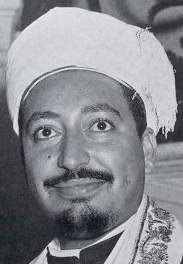
Badr |
Badr, (Saif al-Islam) Muhammad (al-Mansur Billah) al- (b. Feb. 25, 1929, Hajjah, northwest Yemen - d. Aug. 6, 1996, London, England), king of Yemen (1962). After succeeding to the throne, he was almost immediately overthrown during an Egyptian-backed coup that established a republic. He then fled to Mabyan (near Hajjah) to launch a rebellion to restore the monarchy, and much of the country remained under royalist control for years. He left his headquarters and installed his government in al-Ta´if, Saudi Arabia, in 1967. The civil war ended in 1970; following the end of Saudi Arabia's support and its recognition of the republican government on July 23 that year he left Saudi Arabia and went into exile to England.
Badr ibn Saud (ibn Abdul Aziz Al Saud) (b. 1935? - d. July 2004, outside Saudi Arabia), Saudi prince; son of Saud; grandson of Abdul Aziz. He was governor of Riyadh (1963).
Badr ibn Sultan (ibn Abdul Aziz Al Saud) (b. 1980), Saudi prince; son of Sultan; grandson of Abdul Aziz. He was governor of al-Jawf (2018).
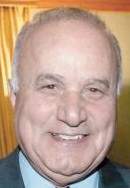
A. Badran |
Badran, Adnan, Arabic `Adnan Badran (b. Dec. 15, 1935, Jerash, Jordan), prime minister and defense minister of Jordan (2005); brother of Mudar Badran. He was also minister of agriculture (1989) and education (1989).
Badran, (Seyyid) Mudar (Muhammad Ayesh), Arabic (Sayyid) Mudar (Muhammad `Ayish) Badran (b. 1934, Jerash, Jordan), prime minister (1976-79, 1980-84, 1989-91), foreign minister (1976-79), and defense minister (1976-79, 1980-84, 1989) of Jordan. He was also minister of education (1973-74) and chief of the royal court (1974-76, 1989).
Badran, Nuri al- (b. 1943, Basra, Iraq), interior minister of Iraq (2003-04). He was counsellor in Iraq's embassy in Moscow before breaking with Pres. Saddam Hussein in 1990 over the invasion of Kuwait. After fleeing Iraq he joined the exiled opposition group Iraqi National Accord. He returned to Iraq after the fall of Saddam Hussein in 2003 and became interior minister. A Shi`ite Muslim, he resigned because the U.S.-led administration wanted a Sunni Muslim in the position following the appointment of a defense minister who was also a Shi`ite. Badran quoted U.S. administrator Paul Bremer as telling him, "That will cause an imbalance, and we in the coalition cannot accept that. The solution is for you to step down from your position."
Badri, Abdul Basit (Abdul Qadir) al- (b. 1978?), Libyan diplomat; son of Abdul Qadir al-Badri. He was ambassador to Saudi Arabia (2016-17); in 2021 he was named ambassador to Jordan.
Badri, Abdul Qadir al- (b. 1921, Tripolitania [now in Libya] - d. Feb. 13, 2003), prime minister of Libya (1967). He was also minister of agriculture (1960), economy (1960-61), health (1961-62), industry (1964-65), and housing and state property (1967).
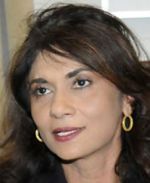
Badrising |
Badrising, Niermala (Hindori-) (b. July 4, 1962, Paramaribo, Suriname), foreign minister of Suriname (2015-17). She was also ambassador to the United States (2017-22).
Baduel, Raúl (Isaías) (b. July 6, 1955, Guárico state, Venezuela - d. Oct. 12, 2021, Caracas, Venezuela), defense minister of Venezuela (2006-07). He was also army commander (2004-06).
Baduri, Ahmed Tahir (b. Oct. 23, 1946, Hirgigo, Eritrea), Eritrean diplomat. He was permanent representative to the United Nations (2001-05).
Bae, Ole (b. Aug. 18, 1902, Nordmøre, Romsdals amt [now in Møre og Romsdal fylke], Norway - d. Sept. 28, 1972), governor of Nord-Trøndelag (1964-71).
Baels, Henri (Louis) (b. Jan. 18, 1878, Ostend, Belgium - d. June 14, 1951, Knokke, Belgium), interior minister of Belgium (1929-31). He was also governor of West-Vlaanderen province (1933-40).
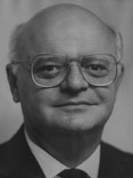
Baena |
Baena Soares, João (Clemente) (b. May 14, 1931, Belém, Brazil), secretary-general of the Organization of American States (1984-94).
Baende (Etafe Eliko), Jean-Claude (b. May 24, 1963, Basankusu, Congo [Léopoldville] [now Congo (Kinshasa)]), governor of Équateur (2009-13).
Baependy, Braz Carneiro Nogueira da Costa e Gama, conde de (b. May 22, 1812, Rio de Janeiro, Brazil - d. May 12, 1887, Rio de Janeiro province [now state], Brazil), president of Rio de Janeiro (acting, 1858-59) and Pernambuco (1868-69); son of Manuel Jacinto Nogueira da Gama, visconde, conde e marquês de Baependy. He was also president of the Senate of Brazil (1885-87). He was made count in 1858.
Baependy, Manuel Jacinto Nogueira da Gama, visconde, conde e marquês de (b. Sept. 8, 1765, São João del Rei, Minas Gerais, Brazil - d. Feb. 15, 1847, Rio de Janeiro, Brazil), finance minister of Brazil (1823, 1826-27). He was also president of the Senate (1838-39). He was made viscount in 1824, count in 1825, and marquess in 1826.

Baerbock |
Baerbock, Annalena (Charlotte Alma) (b. Dec. 15, 1980, Hannover, West Germany), foreign minister of Germany (2021- ). She was co-chairman (2018-22) and chancellor candidate (2021) of the Greens.
Baeriswyl, Pascale (b. April 4, 1968, Bern, Switzerland), Swiss diplomat. She has been permanent representative to the United Nations (2020- ).
Baev, Svetlomir (Velev) (b. March 19, 1947, Burgas, Bulgaria), Bulgarian diplomat. He was permanent representative to the United Nations (1991-92) and ambassador to Israel (1992-99).

B. Báez |
Báez (Méndez), Buenaventura (b. July 14, 1812, Rincón Neyba, Santo Domingo [now Cabral, Dominican Republic] - d. March 14, 1884, Hormiguero, Mayagüez, Puerto Rico), president of the Dominican Republic (1849-53, 1856-58, 1865-66, 1868-74, 1876-78). He began his political career in 1843 by helping lead the revolt that established the independence of the Dominican Republic from Haiti, with which it shares the island of Hispaniola. At this time, Báez believed that his nation could maintain its independence only by becoming a French protectorate, and to secure that end he was sent to Europe in 1846; the French, however, were not interested. During his first term as president, Báez tried unsuccessfully to have his country annexed by the United States (1850). His second term ended when his government was overthrown by a coup d'état because of his involvement in corrupt financial transactions. He then invited Spain to occupy the Dominican Republic, and in return he was exiled to a comfortable life in Europe, financed by the Spaniards. When Spain abandoned the Dominican Republic in 1865, Báez returned to begin a third presidential term, but in May 1866 he was removed by another coup. In 1868 he was again made president, this time determined to gain annexation by the United States. He succeeded in persuading the United States to send warships, ostensibly to protect his country from Haiti; in reality he sought to protect his own business interests. But the U.S. Senate refused to ratify the annexation treaty, and in 1874 Báez again was forced to leave office. He served his last term in 1876-78 and was then exiled permanently to Puerto Rico. Báez has been described as a thoroughly corrupt tyrant who had no regard for the lives or property of his people.
Báez (González), Cecilio (b. Feb. 1, 1862, Asunción, Paraguay - d. June 18, 1941, Asunción), foreign minister (1905, 1906-08, 1911, 1937-38) and provisional president (1905-06) of Paraguay. He was also minister to Mexico (1901-02, 1903-04), the United States (1903-04), and the U.K., France, Italy, and Spain (1918-20).
Baeza (Sotomayor), Francisco (b. 1830, Rancagua, Chile - d. Jan. 9, 1911, Santiago, Chile), war and marine minister of Chile (1902-03). He was also minister of industry and public works (1896).
Baeza (Terrazas), José Reyes (b. Sept. 20, 1961, Delicias, Chihuahua, Mexico), governor of Chihuahua (2004-10). He was also mayor of Chihuahua city (1998-2001).
Baeza Meléndez, Fernando (b. June 23, 1942, Delicias, Chihuahua, Mexico), governor of Chihuahua (1986-92). He was also Mexican ambassador to Costa Rica (2014-17).
Bafarawa, (Alhaji) Attahiru (Dalhatu) (b. Oct. 4, 1954, Bafarawa village [now in Sokoto state], Nigeria), governor of Sokoto (1999-2007). He was a minor Nigerian presidential candidate in 2007.
Bafia, Jerzy (Mieczyslaw) (b. May 5, 1926, Plociczno, Poland - d. July 4, 1991, Warsaw, Poland), justice minister of Poland (1976-81). He was also chairman of the Supreme Court (1972-76).
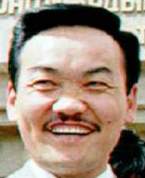
Bagabandi |
Bagabandi, Natsagiyn (b. April 22, 1950, Yaru soum [district], Dzavhan aymag [province], Mongolia), president of Mongolia (1997-2005). He was active in politics since 1980 and during 1980-84 he worked as a propagandist and after that as a Head of Department of the Central Committee of the Mongolian People's Revolutionary Party (MPRP). In 1992 he became a member of the State Great Khural and then was appointed its chairman (1992-96). He was reelected as a member of the State Great Khural following the general election of 1996. He was first chairman of the MPRP in 1996-97. He won the presidential election on May 18, 1997.
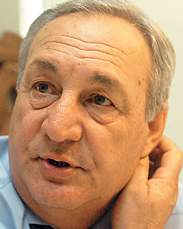
Bagapsh |
Bagapsh, Sergey (Vasilyevich) (b. April 4, 1949, Sukhumi, Abkhaz A.S.S.R., Georgian S.S.R. - d. May 29, 2011, Moscow, Russia), prime minister (1997-99) and president (2005-11) of Abkhazia. He was a candidate in disputed presidential elections in October 2004 and won a new election in January 2005.
Bagaragaza, Thaddée (b. June 6, 1936, Muvumo, Rwanda), foreign minister of Rwanda (1965-69). He was also minister of social affairs and information (1961-63), plan, cooperation, and technical aid (1963-65), and national education (1973-75) and president of the National Assembly (1969-73).
Bagautdinov, Anvar (Badretdinovich) (b. Nov. 27, 1925, Emikeyevo, Tatar A.S.S.R., Russian S.F.S.R. - d. Oct. 25, 2002, Kazan, Tatarstan, Russia), chairman of the Presidium of the Supreme Soviet of the Tatar A.S.S.R. (1983-86). He was also first secretary of the party committee of Almetyevsk city (1979-83).

Bagaya |
Bagaya (Nyabongo), Elizabeth (Christobel Edith), also spelled Bagaaya (b. Feb. 9, 1936, Fort Portal, Kabarole district, Uganda), foreign minister of Uganda (1974). A princess of Toro (daughter of King George David Matthew Kamurasi Rukidi III), she was Batebe (princess royal) to her brother, King Patrick David Matthew Rwamuhokya Olimi III Kaboyo II. She was Ugandan ambassador at-large (1969-73) and to Egypt and Ethiopia (1973-74), the United States (1986-88), Germany (2006-08), and the Vatican (2006-07), permanent representative to the United Nations (1974), and high commissioner to Nigeria (2008-10).
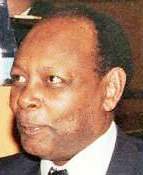
Bagaza |
Bagaza, Jean-Baptiste (b. Aug. 29, 1946, Murambi, Ruanda-Urundi [now in Burundi] - d. May 4, 2016, Brussels, Belgium), president of Burundi (1976-87). A Tutsi army officer who had become assistant to the head of the armed forces, he led a 1976 coup that overthrew Pres. Michel Micombero and became chairman of a Supreme Revolutionary Council and soon afterwards president. He introduced a civilian constitution (1981) under which single-party elections were held in 1982, the sole legal party being the Union for National Progress (UPRONA); he was elected president, unopposed, in 1984. Bagaza is credited with land reforms, the abolition of a hated poll tax, and infrastructure investments, but his human rights record was poor; in particular, he ruthlessly pursued the Roman Catholic Church, to which more than 60% of the population belonged. He was himself overthrown by Maj. Pierre Buyoya in 1987 while attending a meeting of Francophone leaders in Canada. He then lived in exile until 1993, mostly in Libya. In 1994 he launched a new party, the Party for National Recovery (PARENA). He fled to Uganda in 1998 after Buyoya put him under house arrest for allegedly plotting another coup. He returned in June 2002, promising to contribute to the troubled central African country's future. He was released after six months of house arrest on April 4, 2003. As part of a 2005 peace process that ended a 12-year civil war, former presidents, including Bagaza, were named senators for life. He stepped down as the head of PARENA in 2014.
Bagbeni Adeito Nzengeya, original name Augustin René Bagbeni (b. Jan. 12, 1941, Stanleyville, Belgian Congo [now Kisangani, Congo (Kinshasa)]), foreign minister of Zaire (1991-92). He was also ambassador to the Netherlands (1971-72), Ethiopia (1972-75), and India (also responsible for Indonesia, Singapore, and Sri Lanka) (1983-85) and permanent representative to the United Nations (1985-91).
Bagchi, B(hupal) P(rasad) (b. July 2, 1917), chief commissioner of Chandigarh (1969-72).
Bagé, Paulo José da Silva Gama, (2º) barão de (b. Rio Grande do Sul captaincy [now state], Brazil - d. Aug. 20, 1869, Lisbon, Portugal), president of Pará (1828-30). He was made baron in 1825.
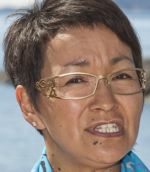
Bagger |
Bagger, Ane Lone (b. Feb. 25, 1966, Ilulissat, Greenland), foreign minister of Greenland (2018-20). She was also minister of education, culture, and church (2018-20).
Baghdadi, Abdel-Latif al-, Arabic `Abd al-Latif al-Baghdadi (b. September 1917, Shawa, Mansoura province, Egypt - d. Jan. 8, 1999), Egyptian politician. A leading member of the Free Officers movement that ousted the Egyptian monarchy in 1952, he was one of the closest supporters of Pres. Gamal Abdel Nasser. He held a number of top offices under Nasser. Baghdadi presided over the 1953 court that tried pre-revolutionary politicians, was minister of war in 1953-54, and was junior vice president of the United Arab Republic, the short-lived union of Egypt and Syria. He was minister of planning and finance in 1961-62 and served on the Presidency Council, an executive body within the government, in 1962-64. Soon after that he withdrew from government over policy differences with Nasser. However, a rapprochement between the two men was arranged before Nasser's death in 1970.
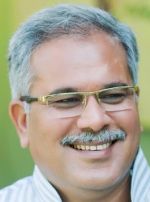
Baghel |
Baghel, Bhupesh (b. Aug. 23, 1961, Durg district, Madhya Pradesh [now in Chhattisgarh], India), chief minister of Chhattisgarh (2018- ).
Bagirov, Kyamran (Mamed ogly) (b. 1933 - d. Oct. 25, 2000), first secretary of the Communist Party of the Azerbaijan S.S.R. (1982-88). He was also first secretary of the party committee of Sumgait city (1974-82).
Bagirov, Mir Dzhafar (Abbas ogly) (b. Sept. 17 [Sept. 5, O.S.], 1896, Kuba, Russia [now in Azerbaijan] - d. [executed] May 7, 1956, Baku, Azerbaijan S.S.R.), chairman of the Council of People's Commissars/Ministers (1932-33, 1953) and first secretary of the Communist Party (1933-53) of the Azerbaijan S.S.R. He was also people's commissar of interior (1921-27) and first secretary of the party committee of Baku city (1933-50).
Bago, Slavo (b. Sept. 29, 1959, Bosanski Samac [now in Republika Srpska], Bosnia and Herzegovina), premier of Bosnian Posavina (1998-2001).
Bagot, Sir Charles (b. Sept. 23, 1781, Blithfield Hall, Staffordshire, England - d. May 19, 1843, Kingston, Canada West [now Ontario]), governor of Canada (1842-43); knighted 1820. He was also British minister to the United States (1815-20) and ambassador to Russia (1820-24) and the Netherlands (1824-32).
Bagration, Knyaz (Prince) Pyotr (Romanovich) (b. Oct. 6 [Sept. 24, O.S.], 1818, Kizlyar [now in Dagestan], Russia - d. Jan. 29 [Jan. 17, O.S.], 1876, St. Petersburg, Russia), governor of Tver (1862-68) and governor-general of Livonia, Estonia, and Courland (1870-76); great-great-grandson of Iese.
Bagration-Imeretinsky, Knyaz (Prince) Aleksandr (Konstantinovich) (b. Jan. 5, 1838 [Dec. 24, 1837, O.S.], Moscow province, Russia - d. Nov. 30 [Nov. 17, O.S.], 1900, Warsaw, Poland, Russian Empire), governor-general of Warsaw (1897-1900); grandson of Davit`.
Bagration-Mukhransky, Knyaz (Prince) Ivan (Konstantinovich) (b. Dec. 7, 1812 - d. March 11, 1895, Tiflis, Russia [now Tbilisi, Georgia]), military governor of Kutaisi (1853-56); great-grandson of Irakli II.
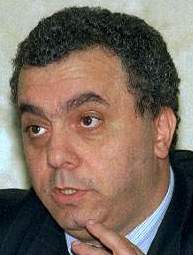
Bagratyan |
Bagratyan, Hrant (Ararati) (b. Oct. 18, 1958, Yerevan, Armenian S.S.R.), prime minister of Armenia (1991 [acting], 1993-96). He was also first deputy prime minister (1990-93), economy minister (1992-93), and a presidential candidate (2013).
Bagrianov, Ivan (Ivanov) (b. Oct. 17, 1891, Razgrad, Bulgaria - d. [executed] Feb. 1, 1945, Sofia, Bulgaria), prime minister and foreign minister of Bulgaria (1944). He was also minister of agriculture (1938-41).
Bagueri, Hassan (b. 1918, Oum-Hadjer, Chad), Chadian politician. He was minister of civil service (1960), social affairs (1960), and animal husbandry (1960-62).
Baguidy, Joseph D(amien) (b. Sept. 18, 1916, Jérémie, Haiti - d. April 8, 2000, Port-au-Prince, Haiti), foreign minister of Haiti (1960-61). He was also ambassador to Switzerland (1964-68, 1971-80?).
Baguska, Petras (b. July 24, 1941, Pasvalys district, Lithuania), justice minister of Lithuania (2006-08).
Bagyidaw (b. July 23, 1784 - d. Oct. 15, 1846, Amarapura, Kingdom of Awa [now in Myanmar]), king of Awa (1819-37). He was the grandson of King Bodawphaya, who had narrowly avoided war with the British over the frontier between Bengal and Arakan. Bagyidaw was an ineffectual king, but his general, Maha Bandula, influenced him to follow Bodawphaya's policy of aggressive expansion in northeastern India. He conquered Assam and Manipur, making them tributaries. The border with British India thus extended from Arakan on the Bay of Bengal northward to the foot of the Himalayan Mountains. The British, angered over Awa border raids in pursuit of rebel forces, launched a war on March 5, 1824. Bagyidaw's armies were driven out of Assam, Arakan, and Manipur. British forces occupied southern Awa and advanced toward the capital, Amarapura (near present-day Mandalay). On Feb. 24, 1826, the Treaty of Yandabo was signed; it provided for the cession of Tenasserim and Arakan to the British, payment of an indemnity equivalent to £1,000,000, and renunciation of all Awa claims in Assam and Manipur, which became British protectorates. During the remaining years of his reign, he attempted to mitigate the harsh terms of the treaty. In 1826 he negotiated a commercial treaty with the British envoy, John Crawfurd, but refused to establish formal diplomatic relations unless he could deal on an equal basis with the British sovereign, rather than through the East India Company at Calcutta. He failed to persuade the British to return Tenasserim, but a deputation that he sent to Calcutta in 1830 successfully reasserted the Awa claim to the Kale-Kabaw Valley, which had been occupied by the Manipuris. After 1831 he became increasingly susceptible to attacks of mental instability, and in 1837 he was succeeded by his brother, Prince Tharawadi Min.
Bah, Abdallahi Ould (b. 1935, Boutilimit, Mauritania), defense minister of Mauritania (1975-77). He was also minister of health and social affairs (1971-75) and rural development (1977).
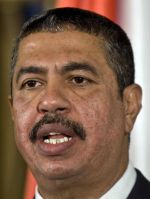
Bahah |
Bahah, Khaled (Mahfoudh Abdullah) (b. 1965), prime minister (2014-16; from 2015 in counter-government) and vice president (2015-16; counter-government) of Yemen. He was also minister of oil and minerals (2006-08), ambassador to Canada (2009-14), and permanent representative to the United Nations (2014).
Bahamonde (Rivera), Ruperto A(ntonio) (b. Sept. 20, 1862, Concepción, Chile - d. March 7, 1926, Santiago, Chile), foreign minister of Chile (1918). He was also rector of the University of Chile (1924-26).
Bahamonde Ruiz, (Luis) Enrique (b. May 30, 1892, Concepción, Chile - d. Dec. 25, 1980, Santiago, Chile), acting defense minister of Chile (1961); son of Ruperto A. Bahamonde. He was also minister of lands and colonization (1960-61).
Bahdon, Ali Hassan (b. April 17, 1967), defense minister of Djibouti (2016-19). He has also been minister of equipment and transport (2008-11), labour (2011-13), communications (2013-16), and justice (2019- ).
Bahemuka, Judith (Mbula) (b. May 5, 1942, Makueni district, Kenya), Kenyan diplomat. She was permanent representative to the United Nations (2003-06) and high commissioner to Canada and ambassador to Cuba (2006-09).
Bahnini, Ahmed, Arabic Ahmad Bahnini (b. 1909 - d. July 10, 1971, Skirat palace, near Rabat, Morocco), prime minister of Morocco (1963-65). He was also president of the Supreme Court. He was killed during an attempted coup d'état against King Hassan II; it was badly organized by the high military hierarchy and turned into a carnage when soldiers shot into a crowd of guests who celebrated the king's birthday.
Bahnson, Jesper J(espersen) (b. Nov. 18, 1827, Tårup, near Viborg, Denmark - d. Aug. 26, 1909, Frederiksberg, Denmark), war minister of Denmark (1884-94).
Baholli, Sami (b. Nov. 28, 1919, Elbasan, Albania), Albanian diplomat. He was permanent representative to the United Nations (1970-72).
Bahonar, Hojatolislam Mohammad Javad (b. 1933, Kerman, Iran - d. Aug. 30, 1981, Tehran, Iran), Iranian politician. Bahonar was imprisoned for his opposition to the shah's regime, but after the overthrow of the shah in 1979, he helped draft the new constitution. In March 1981 he was appointed minister of education and carried on the work started by Mohammad Ali Raja´i in purging the universities of Western cultural influences. He succeeded Ayatollah Mohammad Hossein Beheshti, who died in an explosion in June 1981, as a leader of the Islamic Republican Party. After the fall of Pres. Abolhassan Bani-Sadr in June 1981 and Raja´i's election as president in July, Bahonar was appointed prime minister. He was in the midst of trying to restore stability to the country in the face of armed attacks by opponents of the Islamic regime when he and Raja´i were killed in a bomb blast.
Bahous, Sima Sami (b. June 1956), Jordanian diplomat. She has been permanent representative to the United Nations (2016-21) and executive director of UN Women (2021- ).
Bahr al-Uloum, Muhammad (Ali Hadi) (b. Jan. 17, 1927, Najaf, Iraq - d. April 7, 2015, Najaf), president of the Governing Council of Iraq (2003 [acting], 2004).
Bahr al-Uloum, Muhammad Hussein Ali (b. April 20, 1958), Iraqi diplomat; son of Muhammad Bahr al-Uloum. He has been ambassador to Kuwait (2010-16) and permanent representative to the United Nations (2017- ).
Bahrami, Tariq Shah (b. 1967, Chahar Bagh village, Laghman province, Afghanistan), defense minister of Afghanistan (2017-19). He was also ambassador to Jordan (2019-21).
Bahrov, Mykola (Vasylyovych), Russian Nikolay (Vasilyevich) Bagrov (b. Oct. 26, 1937, Novotroitskoye, Ukrainian S.S.R. [now Novotroitske, Kherson oblast, Ukraine] - d. April 21, 2015), first secretary of the Communist Party committee of Crimea oblast (1989-91) and chairman of parliament of the Crimean republic (1991-94).
Bahuguna, Hemwati Nandan (b. April 25, 1919, Budhani village, India [now in Pakistan] - d. March 20, 1989), chief minister of Uttar Pradesh (1973-75) and finance minister of India (1979-80).
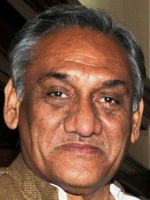
V. Bahuguna |
Bahuguna, Vijay (b. Feb. 28, 1947, Allahabad, United Provinces [now Prayagraj, Uttar Pradesh], India), chief minister of Uttarakhand (2012-14); son of Hemwati Nandan Bahuguna.
Bai Qingcai (b. 1932, Wutai county, Shanxi, China - d. Nov. 6, 2016, Shanxi), governor of Shaanxi (1990-94).

Bai Wenwei |
Bai Wenwei, also appearing as Bo Wenwei (b. 1875/76, Shou county, Anhui, China - d. April 26, 1947, Shanghai, China), governor of Anhui (1912-13). He devoted himself to anti-Qing activities and later joined the Chinese Revolutionary Alliance (which became the Kuomintang). Under his persuasion, the 9th Division of the Qing Modern Army (stationed in Jiangsu) launched a raid and took Nanjing in 1911. He was removed from his gubernatorial office as a Kuomintang member together with Jiangxi Gov. Li Liejun in 1913 by Pres. Yuan Shikai, which led to the "Second Revolution." He was named the commander of the 33rd Army in the south in 1924 and subsequently elected member of the Kuomintang Central Political Committee, as well as councillor in the government.
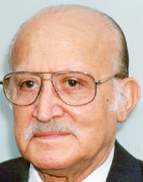
Baidani |
Baidani, Abdul Rahman (Abdo Rabbo al-Muradi) al- (b. 1925?), vice president and foreign minister of Yemen (1962-63).
Baidh, Ali Salim al- (b. 1939/42), foreign minister of Yemen (Aden) (1969-71), vice president of Yemen (1990-94), and president of the secessionist Democratic Republic of Yemen (1994). He was also minister of defense (1967-68), planning (1973-75), and local government (1975-78, 1985-86) and a deputy prime minister (1980-81) of Yemen (Aden). He was secretary-general of the Yemen Socialist Party from 1986 to 1994; after its defeat in the 1994 civil war, he went into exile and in 1998 was sentenced to death in absentia.
Baig, M(irza) O(sman) A(li) (b. Jan. 9, 1904, Bombay [now Mumbai], India - d. ...), secretary-general of the Central Treaty Organization (1959-61). He was also Pakistani chargé d'affaires in the United States (1947), foreign secretary (1951-52), and high commissioner to Canada (1953-59).
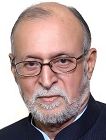
Baijal |
Baijal, Anil (b. Oct. 16, 1946, Kota [now in Rajasthan], India), lieutenant governor of Delhi (2016-22).

P. Bailhache |
Bailhache, Sir Philip (Martin) (b. Feb. 28, 1946, Jersey), bailiff of Jersey (1995-2009). In 1972 he was elected to the States of Jersey as deputy of Grouville and served on a number of committees. He resigned as deputy in 1975, when he was appointed solicitor general for Jersey. In January 1986 he was appointed attorney general for Jersey and in 1989 was made a queen's counsel. In January 1994 he was appointed deputy bailiff and in February 1995 he became bailiff of Jersey. He was knighted in 1996. On Jan. 31, 1996, the queen appointed Bailhache as a judge of the Court of Appeal of Guernsey. The Courts of Appeal for each bailiwick are separate but are served by a common panel of judges, normally from the United Kingdom, in addition to the bailiffs of Jersey and Guernsey. Since 1961, when courts of appeal were established in the Channel Islands, it has been the practice to appoint the bailiff of each bailiwick as a judge of appeal in the other. He later became assistant chief minister for external relations (2011-13) and external relations minister (2013-18).
Bailhache, Sir William (James) (b. 1953, Jersey), bailiff of Jersey (2015-19); knighted 2017; brother of Sir Philip Bailhache. He was attorney general in 2000-09 and deputy bailiff in 2009-15.
Baillet-Latour, Henri, comte de (b. March 1, 1876 - d. Jan. 6, 1942), president of the International Olympic Committee (1925-42).
Baillet von Latour, Theodor Graf (b. June 15, 1780, Linz, Austria - d. [lynched] Oct. 6, 1848, Vienna, Austria), war minister of Austria (1848).
Baillie, Alastair Turner (b. Dec. 24, 1932, Newcastle-upon-Tyne, England - d. Nov. 18, 2009, Melrose, Borders region, Scotland), governor of Anguilla (1983-87).
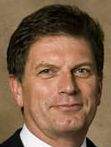
Baillieu |
Baillieu, Ted, byname of Edward Norman Baillieu (b. July 31, 1953, Melbourne, Vic.), premier of Victoria (2010-13).
Bailly, Camille (Victor) (b. Feb. 4, 1907, Amiens, Somme, France - d. Aug. 21, 1984), governor of Senegal (1950-52), French Sudan (1952), Ivory Coast (1952-54), and French Polynesia (1958).
Baing, Andrew (b. Dec. 23, 1950), deputy prime minister of Papua New Guinea (1997 [acting], 2003). He was also minister of education (1992-94), transport (1994-95), forests (1995-97), agriculture and livestock (1997), culture and tourism (1999-2000), justice (2000), and fisheries (2002-03).
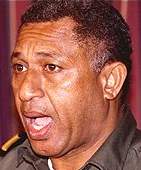
Bainimarama |
Bainimarama, (Josaia) Voreqe, byname Frank Bainimarama (b. April 27, 1954, Bau island, Fiji), Fijian military and political leader. He enlisted with the Fiji navy on July 26, 1975. He went through the ranks from able seaman in August 1976 to midshipman in December of the same year. He was commissioned sub-lieutenant in 1978 and lieutenant six years later. He took his first command appointment in February 1985 when he assumed the command of the HMFS Kikau. He was promoted temporary lieutenant commander in early 1986, and later that year served a tour with the Multi-National Forces and Observers in the Sinai. From 1988 to 1997 he held the post of commander, Fiji Naval Division, and in 1995 was promoted captain, which is equivalent to the military rank of a full colonel. He was appointed acting chief of staff in November 1997 and confirmed in April 1998. He was named commander of the army on Feb. 25, 1999, to replace Brig.Gen. Ratu Epeli Ganilau, who resigned to enter politics. At that time he was also promoted commodore. In May 2000 he took power as head of an Interim Military Government, ten days after rebels led by George Speight seized control of the parliament building and took the government hostage. In July he signed an agreement with Speight that ended the crisis. Speight was arrested and charged with treason. But just four months later, soldiers in the army who had stayed loyal to Speight staged a bloody mutiny at the army's barracks. Eight men were killed and Bainimarama fled for his life. In 2006 Bainimarama demanded the resignation of Prime Minister Laisenia Qarase because of the latter's support for a controversial bill that would offer amnesty to some of those involved in the 2000 coup. When Qarase refused, Bainimarama himself staged a coup to remove him. A month later (January 2007) he gave up the presidential powers he had taken and became interim prime minister. In 2009 the Appeal Court ruled his government illegal, but the president then disbanded the court and reappointed him. In 2014 he handed over the reins of the military, formed the FijiFirst party, then ran for election under a new electoral system and won, as he did again in 2018 before being defeated in 2022. He was also foreign minister (2008-09, 2016-19, 2020-22).

Baïpo-Temon | 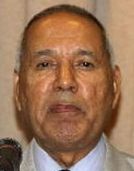
Baira |
Baïpo-Temon, Sylvie (b. June 13, 1975, Bangui, Central African Republic), foreign minister of the Central African Republic (2018- ).
Baira, Abu Bakr (Mustafa) (b. 1942, Benghazi, Libya), acting president of the House of Representatives of Libya (2014).
Bairamov, Nurberdy (b. July 15 [July 2, O.S.], 1912, Baba-Daykhan, Zakaspiyskaya oblast, Russia [now in Turkmenistan] - d. April 1, 1986), chairman of the Presidium of the Supreme Soviet of the Turkmen S.S.R. (1959-63). He was also chairman of the Executive Committee of Ashkhabad oblast (1953-58).
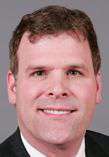
J. Baird | 
M. Baird |
Baird, John (Russell) (b. May 29, 1969, Nepean, Ont.), foreign minister of Canada (2011-15). He was also environment minister (2007-08 and [acting] 2010-11) and transport minister (2008-10).
Baird, Mike, byname of Michael Bruce Baird (b. April 1, 1969), premier of New South Wales (2014-17).
Baird, Spencer F(ullerton) (b. Feb. 3, 1823, Reading, Pa. - d. Aug. 19, 1887, Woods Hole, Mass.), U.S. commissioner of fish and fisheries (1871-87) and secretary of the Smithsonian Institution (1878-87).
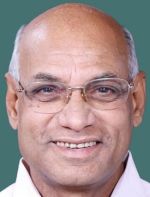
R. Bais | 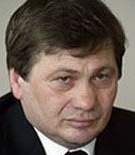
Baisultanov |
Bais, Ramesh (b. Aug. 2, 1948, Raipur, Central Provinces and Berar [now in Chhattisgarh], India), governor of Tripura (2019-21), Jharkhand (2021-23), and Maharashtra (2023- ). He was also Indian minister of state (independent charge) for mines (2003-04) and environment and forests (2004).
Bais, Tony, justice minister of Papua New Guinea (1982-85).
Baisultanov, Odes (Khasayevich) (b. Jan. 17, 1965), prime minister of Chechnya (2007-12).
Baja, Lauro L(iboon), Jr. (b. May 2, 1937, Alangilan, Batangas, Philippines), Philippine diplomat. He was ambassador to Brazil (1986-93) and Italy (1997-98) and permanent representative to the United Nations (2003-07).
Bajaji: see under Pachachi.
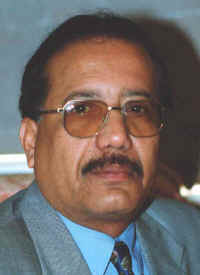
Bajamal |
Bajamal, Abdul Qader (Abdul Rahman), Arabic `Abd al-Qadir `Abd al-Rahman Ba-Jammal (b. Feb. 18, 1946, Hadhramaut region, Eastern Aden Protectorate [now in Yemen] - d. Sept. 7, 2020), foreign minister (1998-2001) and prime minister (2001-07) of Yemen. He was also minister of industry (1980-85) and energy and minerals (1985) of Yemen (Aden) and deputy prime minister (1994-97, 1998-2001) and minister of planning and development (1994-98) of Yemen.

Bajnai | 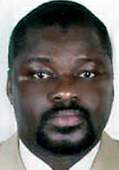
Bajo |
Bajnai, (György) Gordon (b. March 5, 1968, Szeged, Hungary), prime minister of Hungary (2009-10). He was also minister of local government and regional development (2007-08) and national development and economy (2008-09).
Bajo, Lamin Kaba (b. Nov. 10, 1964, Brikama, western Gambia), interior minister (1995-97, 2012) and foreign minister (2005-06) of The Gambia. He was also minister of local government and lands (1998-2000) and fisheries, water resources, and National Assembly matters (2010-12) and ambassador to Saudi Arabia (2002-05), Iran (2007-09), Qatar (2009-10), and Morocco (2012-14).
Bajpai, Sir Girja Shankar (b. April 3, 1891, Lucknow, India - d. Dec. 5, 1954, Bombay [now Mumbai], India), governor of Bombay (1952-54); knighted 1935. He was also agent-general of India in the United States (1941-47) and secretary-general of the Indian Ministry of External Affairs (1947-52).
Bajpai, Kayatyani Shankar (b. March 30, 1928, Jaipur, India - d. Aug. 30, 2020, New Delhi, India), Indian political officer in Sikkim (1970-74); son of Sir Girja Shankar Bajpai. He was also ambassador to the Netherlands (1975), Pakistan (1976-80), China (1980-82), and the United States (1984-86).
Bajpai, Rajendra Kumari (b. Feb. 8, 1925, Laluchak, Bhagalpur district, Bihar, India - d. July 17, 1999, Allahabad [now Prayagraj], Uttar Pradesh, India), Indian politician; granddaughter of Ravi Shankar Shukla; niece of Shyama Charan Shukla. She took part in the Quit India Movement in 1942 and was jailed for burning the union jack at the Zila Kutchery in Munger. She took the plunge into politics when she came into contact with Indira Gandhi immediately after the partition. Gandhi, who became the president of the Allahabad Congress Committee in 1956, chose her as her general secretary; thus began a political career spanning nearly four decades - first in Uttar Pradesh, the cradle of Indian politics, and then at the national level. She entered the U.P. assembly in 1962, became president of the U.P. Congress Committee during the early '70s and also served as a minister. Known for tremendous administrative and organizational capabilities, she streamlined the party and strengthened grass-roots level contacts in the state. When the Congress split in 1969, she took a clear line in favour of Gandhi and against the "syndicate." She remained steadfast in her support of Gandhi till the latter's assassination. In January 1980, she was elected to the Lok Sabha from Sitapur after representing Allahabad in the state assembly thrice from 1962 to 1977. She was appointed general secretary of the All-India Congress Committee in the same year. She held the charge of organizing the party in the northeast, West Bengal, Assam, Gujarat, and Karnataka. Later, Gandhi inducted Bajpai into her cabinet as minister for welfare. An MP till 1990, she was appointed lieutenant governor of Pondicherry in 1995, a post she relinquished in 1998 when the Bharatiya Janata Party came to power at the Centre.
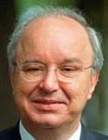
Bajuk |
Bajuk, Andrej (b. Oct. 18, 1943, Ljubljana, Yugoslavia [now in Slovenia] - d. Aug. 15/16, 2011), prime minister of Slovenia (2000). Bajuk spent most of his life abroad. His family left Slovenia in 1945 after the Communists came to power in Yugoslavia at the end of World War II. He grew up in Argentina. In May 2000 Bajuk replaced Janez Drnovsek, who was premier of Slovenia's centre-left government for the past eight years but lost a confidence vote in parliament. In his programme, Bajuk emphasized preparations for European Union membership as his main task. Bajuk also planned to liberalize the economy by phasing out state intervention, abolishing monopolies, and trying to attract more foreign investment. In recent years, he had advised both the centre-right Social Democrats and the conservative Christian Democrats. He only joined the Christian Democrats in April 2000. He became deputy president of the newly established SLS+SKD Slovenian People's Party, which was formed by a merger of the People's Party and the Christian Democrats. SLS+SKD also formed an alliance with the Social Democrats, commanding the support of 44 out of 90 parliamentary seats. Bajuk was elected by 46 votes to 44; in two previous rounds of voting he failed to win enough support. His government soon broke down over whether to move away from the system of election by proportional representation, and new elections were won by a centre-left coalition led again by Drnovsek. In 2004-08 Bajuk was finance minister.
Bakala, Adrien (b. 1935, Mouyondzi, French Congo [now Congo (Brazzaville)]), Congo (Brazzaville) diplomat. He was permanent representative to the United Nations (1969-70) and ambassador to Egypt (1971-73) and Italy (1973-75).
Bakalli, Mahmut (b. Jan. 19, 1936, Djakovica [Gjakovë], Banovina of Zeta, Yugoslavia [now in Kosovo, Serbia and Montenegro] - d. April 14, 2006, Pristina, Kosovo), secretary of the Central Committee of the League of Communists of Kosovo (1971-81). He stepped down following disagreements with the central body of the Yugoslav Communist Party over the handling of unrest by ethnic Albanian students. During the Kosovo war in 1998-99, he was part of a five-man delegation that met with Serbian strongman Slobodan Milosevic in a failed bid to end the conflict. Years later, he was the first witness to testify against Milosevic at his war crimes trial at the UN tribunal in The Hague, Netherlands. Bakalli was also part of the Kosovo Albanian delegation to the failed Rambouillet peace talks in France in 1999 and argued international mediation was needed before the negotiation process even started. When the talks in France failed, he talked of the importance behind NATO's coming to Kosovo, long before the bombings even began. He helped Ramush Haradinaj - a former rebel commander who became Kosovo's prime minister in 2005 and resigned after being indicted for war crimes by the UN tribunal - with organizing a political party, mostly because he believed people in Kosovo needed a third choice. At the time of his death, he was an adviser to Kosovo Prime Minister Agim Çeku.
Bakar, Zainal (b. Aug. 6, 1940, Pariaman, Netherlands East Indies [now in Sumatera Barat, Indonesia] - d. July 31, 2012, Padang, Sumatera Barat), governor of Sumatera Barat (2000-05).
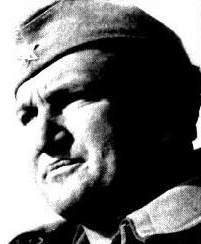
Bakaric |
Bakaric, Vladimir (b. March 8, 1912, Velika Gorica, near Zagreb, Austria-Hungary - d. Jan. 16, 1983, Zagreb, Yugoslavia), Yugoslav politician. He was a member of the Communist Party from 1933. During World War II he helped organize partisan resistance in his native Croatia, and in 1945 he headed the first postwar government of the Croatian national republic within the Yugoslav federation. In 1971-72 he supported Tito's moves to suppress Croatian nationalism. A Marxist theoretician who was, nevertheless, strongly opposed to the Soviet system, Bakaric helped frame the 1974 federal constitution designed to promote decentralization. He was the last survivor of Marshal Tito's World War II compatriots to retain high office within the party hierarchy, being a member of the Presidium of the League of Communists of Yugoslavia and vice-president of the federal republic's collective Presidency. Under the system of rotation of offices instituted by Tito, Bakaric would have succeeded Petar Stambolic as head of state in May 1983.
Bakary, Djibo (b. 1922, Soudouré, Niger - d. April 16, 1998, Niamey, Niger), Nigerien politician. A devoted socialist, he was a trade union leader until 1956 when he became the first elected mayor of the capital Niamey. The radical politician and nationalist campaigned for a "No" vote in a referendum for a French West African federation in 1958. His party, Sawaba (Hausa for independence), and the Democratic Party of Guinea under the late leader Ahmed Sékou Touré voted against the French federation, setting the stage for Guinea's acrimonious break with Paris. Bakary's party was in the minority in Niger, and he fled into exile after the "Yes" vote prevailed there. He launched a failed invasion against the independence government in 1964 with a band of commandos. He returned to Niger after the army seized power in 1974 but was arrested two years later and jailed for plotting. He was freed in 1987 after the death of military ruler Seyni Kountché.
Bakary, Yaou Sangaré (b. Nov. 7, 1964), Nigerien diplomat. He has been ambassador to Cuba (2021-22) and permanent representative to the United Nations (2023- ).
Bakatin, Vadim (Viktorovich) (b. Nov. 6, 1937, Kiselyovsk, Kemerovo oblast, Russian S.F.S.R. - d. July 31, 2022, Moscow, Russia), Soviet interior minister (1988-90) and director of the KGB (1991). He was also first secretary of the party committees of Kirov (1985-87) and Kemerovo (1987-88) oblasti and a Russian presidential candidate (1991).
Bakauov, Bulat (Zhumabekovich) (b. June 27, 1971, Novokuzminka, Pavlodar oblast, Kazakh S.S.R.), head of Pavlodar oblast (2016-20). He was also mayor of Aksu (2011-14) and Pavlodar (2014-16).
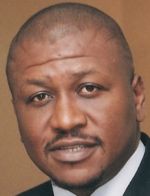
H. Bakayoko |
Bakayoko, Hamed (b. March 8, 1965, Abidjan, Ivory Coast [now Côte d'Ivoire] - d. March 10, 2021, Freiburg, Germany), interior minister (2010-17), defense minister (2017-21), and prime minister (2020-21) of Côte d'Ivoire. He was also minister of new information technologies and telecommunications (2003-10) and mayor of Abobo (2018-21).
Bakayoko, Youssouf (b. April 19, 1943, Bouaké, Ivory Coast [now Côte d'Ivoire]), foreign minister of Côte d'Ivoire (2006-10).
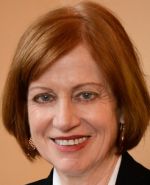
B. Baker |
Baker, Barbara (Avalon) (b. 1958?), governor of Tasmania (2021- ).
Baker, Francis (Eustace), byname Dick Baker (b. April 19, 1933), governor of Saint Helena (1984-88).
Baker, Howard (Henry, Jr.) (b. Nov. 15, 1925, Huntsville, Tenn. - d. June 26, 2014, Huntsville), U.S. politician; posthumous son-in-law of Alfred M. Landon. His staunchly Republican family included a grandmother who was a sheriff and a father who would serve in the U.S. House of Representatives from 1951 to 1964. He served in the Navy during World War II. In 1964, campaigning in Tennessee against foreign aid and the Civil Rights Act, Baker lost his first try for a U.S. Senate seat. Running again in 1966, he moderated his politics and became the first popularly elected Republican U.S. senator in the state's history. Representing Tennessee in the Senate from 1967 to 1985, he became effective in Washington with his pragmatism and moderate politics. As minority leader from 1977 to 1981, Baker fought for some of Pres. Jimmy Carter's policies, most notably the Democrat's Panama Canal treaties. Baker's support for that issue enraged Republican conservatives, some of whom were still angry with him for his sharp and persistent questioning of aides of Pres. Richard Nixon during the Watergate hearings in 1973. A reputation for statesmanship was not enough to win Baker the White House, however. One of nine candidates for the 1980 Republican presidential nomination, he dropped out after gaining only nine delegates in four months of campaigning. Four years earlier the party had rebuffed his bid to be Pres. Gerald Ford's running mate. In each case the Republican right wing helped ensure Baker's defeat. As Senate majority leader in 1981-85, he united the warring wings of his party behind Pres. Ronald Reagan's tax and budget agenda. He declined to run for reelection in 1984 but in 1987 became Reagan's chief of staff during the investigation of the Iran-contra affair. Baker resigned that office in mid-1988.
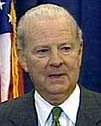
J. Baker |
Baker, James (Addison, III) (b. April 28, 1930, Houston, Texas), U.S. secretary of state (1989-92). Originally a Democrat, he switched to the Republican Party and ran his longtime friend George Bush's campaign for the U.S. Senate in 1970. Though Bush lost the race, Baker became deeply involved in Republican politics thereafter. He was named undersecretary of commerce by Pres. Gerald Ford in 1975 and that same year helped Ford secure the Republican presidential nomination for the 1976 election. Baker joined Ford's reelection campaign that year and in August became national chairman of the Ford campaign. Despite Ford's loss in the election, Baker earned a reputation as a campaign tactician of uncommon ability. In 1978 Baker ran for the office of state attorney general in Texas but lost. From January 1979 to May 1980 he was Bush's campaign chairman for the 1980 Republican presidential nomination. After Bush accepted the vice presidential slot on a ticket headed by Ronald Reagan that year, Baker joined Reagan's campaign staff as a senior adviser. Under Reagan he served as White House chief of staff (January 1981-January 1985) and secretary of the Treasury (February 1985-August 1988). Baker adroitly managed Bush's successful campaign for the presidential election of November 1988 and in the same month was nominated secretary of state. He was confirmed by the Senate on Jan. 25, 1989, and sworn in on January 27. In that post Baker helped the U.S. reach agreement with the Soviet Union on the reunification of Germany, and helped orchestrate the international coalition that opposed Iraq's invasion of Kuwait. He resigned in 1992 in order to serve as White House chief of staff while simultaneously directing Bush's (unsuccessful) reelection campaign. In 1997-2004 he was UN mediator in the Western Sahara conflict.
Baker, Newton D(iehl) (b. Dec. 3, 1871, Martinsburg, W.Va. - d. Dec. 25, 1937, Cleveland, Ohio), mayor of Cleveland (1912-15) and U.S. secretary of war (1916-21).
Baker, William R(obinson) (b. May 21, 1820, Baldwinsville, N.Y. - d. April 30, 1890), mayor of Houston (1880-86); nephew-in-law of Hiram G. Runnels.
Baker of Dorking (of Iford in the County of East Sussex), Kenneth (Wilfred) Baker, Baron (b. Nov. 3, 1934, Newport, Monmouth, Wales), British politician. He won election to the House of Commons at a by-election in 1968. He lost his seat (Acton, in West London) in 1970 but was almost immediately adopted to defend a large Conservative majority at Marylebone, in central London. His close association with Edward Heath, then prime minister, culminated in his becoming Heath's political private secretary in 1974. When Heath was deposed as leader of the Conservative Party by Margaret Thatcher (1975), Baker was not - as Thatcher would say - "one of us," and he was voted out of the Conservative leadership by the party MPs. Excluded from her first government, he wrote her a letter urging the importance of information technology, with the result that, in January 1981, she made him responsible for it as minister, a high-profile post that gave him the chance to promote the wider use of electronic and computer technology in schools and industry. In September 1984 he was appointed minister for local government. He carried through the abolition of the Greater London Council (GLC) in the face of an inspired, and expensive, antiabolition publicity campaign conducted by GLC Labour leader Ken Livingstone, as well as resistance from the House of Lords. He came into the cabinet as secretary of state for the environment in September 1985. In May 1986 he was promoted to secretary of state for education and science. In 1988 he accomplished another signal achievement for Thatcher when he piloted a radical Education Reform Bill onto the statute book. As a result of his achievements, he came to be seen as a possible successor to Thatcher, although the right-wingers regarded him as ideologically shallow. In 1989-90 he was chancellor of the Duchy of Lancaster and chairman of the Conservative Party and in 1990-92 home secretary. He was created a life peer in 1997.
Bakevyumusaya, Vénérand, foreign minister of Burundi (1995-96). He was also minister of labour and professional training (1994-95), regional integration and African affairs (2007-09), and information, communication, and relations with parliament (2009-10) and ambassador to France (1998-2001).

Bakhit | 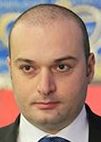
Bakhtadze |
Bakhit, Marouf (Suleiman) al-, Arabic Ma`ruf Sulayman al-Bakhit (b. 1947), prime minister and defense minister of Jordan (2005-07, 2011). He previously served as ambassador to Turkey (2002-05) and Israel (2005).
Bakhsh, Pir Illahi (d. Oct. 8, 1975), chief minister of Sindh (1948-49).
Bakht, Sikander (b. Aug. 24, 1918, Delhi, India - d. Feb. 23, 2004, Thiruvananthapuram, Kerala, India), foreign minister of India (1996) and governor of Kerala (2002-04). He was also Indian minister of works, housing, supply, and rehabilitation (1977-79) and of industry (1998-99).
Bakhtadze, Mamuka (b. June 9, 1982, Tbilisi, Georgian S.S.R.), finance minister (2017-18) and prime minister (2018-19) of Georgia.
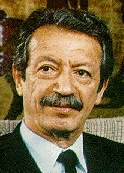
Bakhtiar |
Bakhtiar, Shahpur (b. 1914, Tehran, Iran - d. Aug. 6, 1991, Suresnes, France), prime minister of Iran (1979). He went to Spain during the Civil War and fought with the Loyalists against Franco's forces. During World War II he helped the French resistance against the Nazi occupation. After the war he returned to Iran, where he became a leading figure in the nationalist struggle led by Mohammad Mossadegh's National Front. He served as deputy labour minister in Mossadegh's short-lived (1951-53) government. While Shah Mohammad Reza Pahlavi was married to Soraya Esfandiari, a cousin of Bakhtiar, he tried to persuade him to take a high post. Bakhtiar refused and was jailed several times for his opposition to the shah's autocratic rule. On Jan. 4, 1979, the shah, seeking to forestall a fundamentalist revolution, named him prime minister. Bakhtiar accepted the position only on condition that the shah leave the country. He tried to implement moderate reforms, but was unable to resist the revolutionary Islamic fundamentalist forces under Ayatollah Ruhollah Khomeini. The return of Khomeini to Iran from exile in France on February 1 brought a quick end to Bakhtiar's government. He went into hiding, and turned up in July in France. He established the National Movement of the Iranian Resistance with headquarters in Paris and branches in other countries, along with its own newspapers and two clandestine radio stations beaming his messages into Iran. Over the years, as his return to Tehran seemed ever more remote, his goals continually shifted, with his political allies ranging from leftists to constitutional monarchists. Bakhtiar, who had escaped at least two previous assassination attempts, was found stabbed to death in his home.
Bakhtin, Ivan (Ivanovich) (b. 1754 - d. April 26 [April 14, O.S.], 1818, St. Petersburg, Russia), governor of Sloboda Ukraine (1803-14).
Bakhtin, Nikolay (Ivanovich) (b. Jan. 14 [Jan. 3, O.S.], 1796, Tula, Russia - d. April 7 [March 26, O.S.], 1869, St. Petersburg, Russia), Russian secretary of state (1843-53); son of Ivan Bakhtin.
Bakhtin, Yury (Georgiyevich) (b. December 1929 - d. 2010), chairman of the Executive Committee of Crimea oblast (1979-85).
Baki, Ivonne (Leila Juez Abuchacra de Abdel-) (b. Feb. 23, 1951, Guayaquil, Ecuador), Ecuadorian politician. She has been ambassador to the United States (1999-2002, 2020- ) and Qatar (2017-20), a minor presidential candidate (2002), minister of foreign trade (2003-05), and president of the Andean Parliament (2007-09).
Bakiboyev, Erkin (Zhurayevich) (b. Oct. 27, 1934, Tashkent, Uzbek S.S.R.), finance minister of Uzbekistan (1991-94).
Bakiyev, Khuram (b. 1898, Langari, Bukhara [now in Uzbekistan?] - d. 1938), president of the Pamir Bureau of the Communist Party (1929?-30) and chairman of the Executive Committee (1928-30) and executive/first secretary of the Communist Party committee (1930-37) of Gorny Badakhshan.
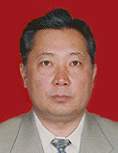
K. (S.) Bakiyev |
Bakiyev, Kurmanbek (Saliyevich) (b. Aug. 1, 1949, Masadan village, Suzak region, Dzhalal-Abad oblast, Kirgiz S.S.R.), prime minister (2000-02, 2005) and president (2005-10) of Kyrgyzstan. He was governor of Chuy oblast in 1997-2000. During his first term as prime minister, he stuck to tough fiscal rules for dealing with the country's large debt burden. Under his leadership, the U.S. Air Force was allowed to establish a base near the capital Bishkek, and former opposition leader Feliks Kulov was imprisoned for abuse of power and theft. His government cracked down on demonstrators, with his interior minister saying that riots that broke out in Bakiyev's home region in the south in March 2002 were an attempt to overthrow the government. Police fired into the crowd of 1,500 protesting the arrest of their local parliamentary deputy in Jalal-Abad, and five people died. An investigation found senior officials responsible for the tragedy, and Bakiyev was forced to resign. Bakiyev moved over to the opposition after his resignation, becoming leader of the People's Movement of Kyrgyzstan. The 2005 parliamentary elections, in which he lost his seat in the March runoff, sparked protests about alleged rigging. As head of the Coordination Council of the People's Unity, he was a leading figure in the revolution that quickly ended Pres. Askar Akayev's rule, and was then appointed prime minister and acting president. In July he won a landslide victory in presidential elections. He came to be criticized for suppressing dissent, however, and the conduct of the 2009 election, which he won with 76% of the vote, was not seen as fair by observers. In 2010 he met a similar fate as Akayev, when protests forced him to flee the capital, a provisional government took power, and he finally agreed to resign. He took refuge in Belarus.
Bakke-Jensen, Frank (b. March 8, 1965, Båtsfjord, Finnmark [now in Troms og Finnmark], Norway), defense minister of Norway (2017-21). He was also minister of EEA and EU affairs (2016-17).
Bakkoush, Abdul Hamid al-, Arabic `Abd al-Hamid al-Bakkush (b. 1933 - d. May 2, 2007, Abu Dhabi, United Arab Emirates), prime minister of Libya (1967-68). He was also justice minister (1964, 1964-65, 1967-68) and ambassador to France (1968-69).
Bako, Audu (b. Nov. 24, 1924, Kaduna, Nigeria - d. late January 1980, Dan Marke, Sokoto [now in Zamfara], Nigeria), governor of Kano (1968-75).
Bako, Mahamane Sani (b. April 25, 1951, Tessaoua, Niger - d. Dec. 13, 1997), foreign minister of Niger (1985-88, 1989-91). He was also ambassador to Belgium (1988-89).
Bako, Yakubu (b. Dec. 24, 1952, Goda [now in Kano state], Nigeria), administrator of Akwa Ibom (1993-96).
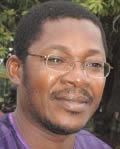
Bako |
Bako Arifari, Nassirou (b. Oct. 30, 1962, Karimama, Dahomey [now Benin]), foreign minister of Benin (2011-15). He was a minor presidential candidate in 2016.
Bakocevic, Aleksandar (b. Nov. 8, 1928, Uzice, Yugoslavia [now in Serbia] - d. Jan. 13, 2007, Belgrade, Serbia), mayor of Belgrade (1986-89) and president of the National Assembly of Serbia (1991-93).
Bakoniarivo, Jean Delacroix (b. April 18, 1944, Befandriana-Nord, Madagascar), Malagasy diplomat. He was permanent representative to the United Nations (1998-2002).
Bakovic, Mirko (b. 1931 - d. Sept. 13, 2014), governor of West Bosnia (1996-98).
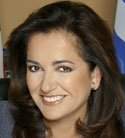
Bakoyannis |
Bakoyannis, Dora, née Theodora Konstantinou Mitsotakis (b. May 6, 1954, Athens, Greece), mayor of Athens (2003-06) and foreign minister of Greece (2006-09); daughter of Konstantinos Mitsotakis. She entered politics after her husband Pavlos Bakoyannis was gunned down by the November 17 Revolutionary Organization on Sept. 26, 1989. She served as culture minister in her father's government in 1992-93 and in October 2002 became the first woman to be elected mayor of Athens, taking office Jan. 1, 2003. In mid-December 2002, she barely avoided assassination herself when an attacker with a history of psychiatric treatment fired a shotgun at her.
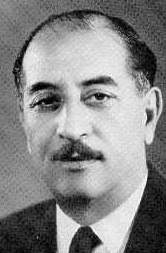
A.H. al-Bakr |
Bakr, Ahmad Hassan al- (b. July 1, 1914, Tikrit, Iraq - d. Oct. 4, 1982, Baghdad), president of Iraq (1968-79). He entered the Iraqi Military Academy in 1938. He took part in the Rashid Ali revolt in 1941, was arrested, imprisoned, and compulsorily retired from the army, but was reinstated in 1957. As a brigadier general, he was one of the "free officers," a group that overthrew the monarchy in 1958. He was again forced to retire from the army in 1959 because of his alleged leadership of a rebellion in Mosul organized by members of the Ba`th party and others favouring closer ties with the United Arab Republic. He took part in the Ba`th coup of February 1963 and became vice president and prime minister. In November 1963 Field Marshal Abdul Salam Arif staged a countercoup against the Ba`th, and Bakr was removed as prime minister; in January 1964 he was also removed as vice president. On July 17, 1968, with other Ba`thist officers, Bakr seized power and thereafter governed in concert with the Ba`th leader Saddam Hussein. His truculent foreign policy effectively isolated him from his Muslim neighbours, and his total opposition to any diplomatic solution to the Arab-Israeli dispute brought him into conflict with more moderate Arab heads of state. Bakr's border claims against Iran made it impossible to bring the Iraqi Kurds under control until an agreement was reached in 1975. His economic policy began with a cautious continuation of the former regime's five-year plan but turned toward industrial expansion as oil revenues increased. After suffering a heart attack in 1976, Bakr delegated most administrative matters to Saddam Hussein, in whose favour he resigned, ostensibly on grounds of ill health, on July 16, 1979.
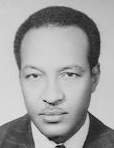
R. Bakr |
Bakr, Rashid (al-Tahir) (b. 1930, Karkoj, Blue Nile province [now state], Sudan - d. March 1988), prime minister (1976-77) and foreign minister (1977-80) of The Sudan. He was also minister of mineral resources (1965), ambassador to Libya (1972-74), speaker of the People's National Assembly (1974-76, 1980-81), a vice president (1976-80, 1985), and attorney general (1983-85).
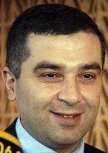
D. Bakradze |
Bakradze, Davit (Shekris dze) (b. July 1, 1972, Tbilisi, Georgian S.S.R.), foreign minister of Georgia (2008). He was speaker of parliament from June 2008 to October 2012 and was a presidential candidate in 2013. He is not to be confused with Davit Bakradze (b. Dec. 30, 1975) who was Georgian ambassador to Greece and Serbia (2012-14) and the United States (2016-22) and was appointed permanent representative to the United Nations in 2022.
Bakradze, Valerian (Minayevich) (b. 1901, Seva, Russia [now in Georgia] - d. 1971), chairman of the Council of People's Commissars/Ministers of the Georgian S.S.R. (1937-46, 1953). He was also a deputy premier (1946-52), minister of food industry (1947-52), and first deputy premier (1952-53).
Bakunin, Aleksandr (Pavlovich) (b. Aug. 12 [Aug. 1, O.S.], 1797, St. Petersburg, Russia - d. Sept. 6 [Aug. 25, O.S.], 1862), governor of Tver (1842-57).
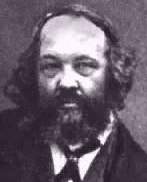
M. (A.) Bakunin |
Bakunin, Mikhail (Aleksandrovich) (b. May 30 [May 18, O.S.], 1814, Premukhino, Tver province, Russia - d. July 1, 1876, Bern, Switzerland), Russian anarchist; nephew of Mikhail (Mikhailovich) Bakunin; second cousin of Aleksandr Bakunin and Graf Nikolay (Nikolayevich) Muravyov. He consorted with French and German socialists, including Pierre-Joseph Proudhon and Karl Marx, and with numerous Polish émigrés who inspired him to combine the cause of the national liberation of the Slav peoples with that of social revolution. The February Revolution of 1848 in Paris gave him his first taste of street fighting; and after a few days of eager participation he travelled eastward in the hope of fanning the flames in Germany and Poland. In Prague in June 1848, he attended the Slav congress, which ended when Austrian troops bombarded the city; and later in the year, in Germany, he wrote his first major manifesto, An Appeal to the Slavs. Tired of inaction, Bakunin once more plunged into revolutionary intrigues and, engaging in the Dresden insurrection of May 1849, failed this time to escape arrest. The Saxon authorities handed him over to Austria, and Austria to Russia. He was released in 1857. In 1868, he joined the First International, a federation of working-class parties aiming at transforming the capitalist societies into socialist commonwealths and their eventual unification in a world federation. At the Hague congress in 1872 Marx secured the expulsion of Bakunin and his followers from the International. The breach split the revolutionary movement in Europe for many years to come. Bakunin formulated no coherent body of doctrine. His writings were often left incomplete. But anarchist movements owing allegiance to Bakunin continued to flourish in Italy and especially in Spain, where as late as 1936 the anarchists were the strongest revolutionary party.
Bakunin, Mikhail (Mikhailovich) (b. July 19 [July 8, O.S.], 1764 - d. 1837), governor of Belorussia (1801-02), Mogilyov (1802-08), and St. Petersburg (1808-16).
Bakuramutsa, Manzi (b. Oct. 15, 1945), Rwandan diplomat. He was permanent representative to the United Nations (1994-96) and ambassador to Belgium (1997-99).
Bakurdzhiev, Evgeni (Stefanov) (b. Feb. 10, 1955, Sofia, Bulgaria - d. June 29, 2021), Bulgarian politician. He was a deputy prime minister and minister of regional development and public works (1997-99).
Bakurdzhiev, Nikola (Petkov) (b. Sept. 26, 1881, Turnovo [now Veliko Turnovo], Bulgaria - d. March 21, 1954, Sofia, Bulgaria), war minister of Bulgaria (1929-31). He was also army chief of staff (1926-29, 1931-34).
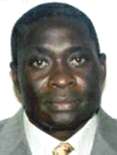
Bala Gaye |
Bala Gaye, Musa Gibril (b. Aug. 13, 1946), finance minister (2003-05, 2005-09) and foreign minister (2005) of The Gambia. He was also minister of trade, industry, and employment (2005).
Balabala Kasongo, Michel (b. Nov. 2, 1966, Kikwit, Congo [Kinshasa]), special commissioner (2015-16) and governor (2017-19) of Kwilu.
Balabanov, Marko (Dimitriev) (b. 1837, Klisura, Ottoman Empire [now in Bulgaria] - d. July 16, 1921, Sofia, Bulgaria), foreign minister of Bulgaria (1879, 1883-84). He was also diplomatic agent to the Ottoman Empire (1880-82), Romania (1902-03), and Greece (1905).
Balaceanu, Ion (b. Jan. 25, 1828, Bucharest, Walachia [now in Romania] - d. 1914, Nice, France), foreign minister of Romania (1876); son of Alexandru II Dimitrie Ghica. He was also diplomatic agent to Austria-Hungary (1876-78) and minister to Austria-Hungary (1878-82), Italy (1882-84), France (1884-85), the Ottoman Empire (1886-88), and the United Kingdom (1893-1900).
Balafrej, Ahmed, Arabic Ahmad Balafrij (b. 1908, Rabat, Morocco - d. April 14, 1990, Rabat), foreign minister (1956-58, 1961-63) and prime minister (1958) of Morocco.
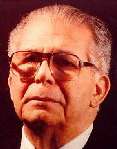
Balaguer |
Balaguer (Ricardo), Joaquín (Antonio) (b. Sept. 1, 1906/071, Navarrete [now Villa Bisonó], Dominican Republic - d. July 14, 2002, Santo Domingo), president of the Dominican Republic (1960-62, 1966-78, 1986-96). He held numerous executive and diplomatic posts under the Trujillo regime, including minister to Colombia (1940-46), ambassador to Mexico (1947-49), foreign minister (1953-55), minister of education and arts (1955-57), and vice president (1957-60). He was sworn in as president when Hector Trujillo (brother of Gen. Rafael Trujillo) resigned because of illness. As Rafael Trujillo still effectively held all power, Balaguer, who was only the nominal president, could effect little real change or reform. After Rafael Trujillo's assassination in 1961, Balaguer tried to liberalize the government, and the Organization of American States lifted the economic sanctions that had been imposed during Trujillo's dictatorship. But Balaguer's changes went too fast for the trujillistas and not fast enough for others. A short-lived military coup forced him to resign in 1962 and take refuge in the United States. Balaguer returned to the Dominican Republic during the U.S. military intervention of 1965 and ran successfully for president in 1966. He was reelected in 1970 and 1974, but these latter terms were marred by political violence, inflation, and alleged electoral fraud. He lost the 1978 election (the first since 1966 to allow the major opposition party to be represented) to Antonio Guzmán Fernández, also lost the 1982 election, but regained the presidency in the 1986 election and was reelected in 1990 and 1994. During his presidency he undertook an unprecedented public-works program, causing heavy debts and an endangered economy. After international observers questioned the fairness of Balaguer's reelection in 1994, he was pressured to cut short his four-year term and call new elections in 1996. In 2000 the blind nonagenarian ran again for president, finishing third.
1 In his autobiography, Balaguer states that it is impossible to determine whether the year of his birth was 1906 or 1907; his birth certificate was established much later.
Balaguer Cabrera, José Ramón (b. June 6, 1932, Guantánamo, Cuba - d. July 15, 2022), Cuban politician. He was first secretary of the Communist Party committee of Santiago de Cuba province (1976-85), ambassador to the Soviet Union/Russia (1990-92), and minister of health (2004-10).

K.G. Balakrishnan |
Balakrishnan, K(onakuppakatil) G(opinathan) (b. May 12, 1945), governor of Gujarat (1999). He was chief justice of the Gujarat High Court (1998-99) and the Madras High Court (1999-2000), chief justice of India (2007-10), and chairman of the National Human Rights Commission (2010-15).

V. Balakrishnan |
Balakrishnan, Vivian (b. Jan. 25, 1961, Singapore), foreign minister of Singapore (2015- ). He was also minister for community development, youth, and sports (2004-11) and environment and water resources (2011-15).
Balakshin, Pavel (Nikolayevich) (b. July 10, 1936, Dementyevo, Arkhangelsk oblast, Russian S.F.S.R.), chairman of the Executive Committee (1990-91) and head of the administration (1991-96) of Arkhangelsk oblast. He was also mayor of Arkhangelsk (1996-2000).
Balalla, Tissa Reginald (b. July 15, 1937), governor of North Western province, Sri Lanka (2007-15).
Balametov, Balamet (Yuz Akhmet ogly) (b. 1907 - d. ...), chairman of the Council of People's Commissars/Ministers of the Nakhichevan A.S.S.R. (1938-42, 1947-50?).
Balan, Hermann Ludwig (from 1859:) von (b. March 7, 1812, Berlin, Prussia [now in Germany] - d. March 26, 1874, Brussels, Belgium), acting foreign minister of Germany (1872-73). He was also Prussian (from 1871 German) minister resident to Frankfurt (1846-48), chargé d'affaires in Hesse-Darmstadt (1848-50), and minister to Württemberg (1858-59), Denmark (1859-64), and Belgium (1864-72, 1873-74).
Balan, Oleg (b. Nov. 27, 1969, Cîrpesti, Moldavian S.S.R.), interior minister of Moldova (2015-16).
Balancy, (Marc France) Eddy (b. May 6, 1953, Mauritius), acting president of Mauritius (2019). He has been chief justice (2019- ).
Balancy, (Pierre) Guy (Girald) (b. April 8, 1924, Port Louis, Mauritius - d. Sept. 22, 1979, Washington, D.C.), Mauritian politician. He was minister of information, posts, and telegraphs (1965-67) and works (1967-68), permanent representative to the United Nations (1968-69), ambassador to the United States (1968-79), Argentina and Brazil (1974-79), and Mexico (1977-79), and high commissioner to Canada (1970-79) and Barbados, Jamaica, and Trinidad and Tobago (1974-79).
Balashev, Aleksandr (Dmitriyevich) (b. July 24 [July 13, O.S.], 1770, Moscow, Russia - d. May 20 [May 8, O.S.], 1837, Kronshtadt, Russia), military governor of Reval (1800-04) and St. Petersburg (1809-12) and governor-general of Ryazan, Tula, Oryol, Voronezh, and Tambov (1819-28). He was also police minister of Russia (1810-12, 1819).
Balasuriya, Jagath (b. Nov. 21, 1940), governor of North Central province, Sri Lanka (2003-06). He was also minister of national heritage (2010-15).
Balasuriya, (Neranjala Pushpa) Kumari (b. 1949), governor of Southern province, Sri Lanka (2006-15); wife of Jagath Balasuriya.
Balavadze, Maksim (Konstantinovich) (b. 1910, Ganir-Kvitiri, Russia [now in Georgia] - d. ...), first secretary of the Communist Party committee of Kutaisi oblast (1952-53).
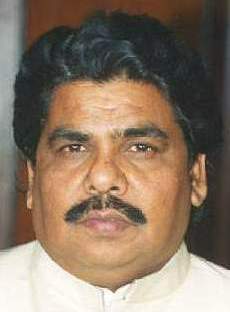
Balayogi |
Balayogi, Ganti Mohana Chandra (b. Oct. 1, 1951, Yedurulanka village, East Godavari district [now in Andhra Pradesh] - d. March 3, 2002, near Kaikalur, Krishna district, Andhra Pradesh), Indian politician. A stranger to politics till 1982, he was attracted to the politics of Telugu Desam founder N.T. Rama Rao. Balayogi was first elected to the Lok Sabha in 1991 as a Telugu Desam candidate from Amalapuram. He lost his seat in 1996 but made his way to the Andhra Pradesh state assembly from Mummidivaram in East Godavari district. He was the minister of higher education in the Chandrababu Naidu government till his election to the 12th Lok Sabha (1998). On March 24 he was elected as speaker, the first time in history that a Dalit leader was elected to the chair. His tenure as speaker was often marred by noisy clashes between the ruling party members and the opposition. He died in a helicopter crash.

Balázs |
Balázs, Péter (b. Dec. 5, 1941, Kecskemét, Hungary), foreign minister of Hungary (2009-10). He was also ambassador to Denmark (1994-96), Germany (1997-2000), and the European Union (2003-04) and EU commissioner for regional policy (2004).
Balbo, Italo (b. June 6, 1896, Quartesana, Ferrara province, Italy - d. [plane shot down] June 28, 1940, Tobruk, Libya), governor-general of Libya (1934-40). He was also Italian minister of aviation (1929-33).
Balbuena (Carrillo), Gerardo (b. Dec. 15, 1879, Chorrillos, Peru - d. Aug. 15, 1955, Rochester, N.Y.), finance minister of Peru (1931). He was also president of the Chamber of Deputies (1941-43).
Balcer, Lukasz (Wojciech) (b. July 21, 1935, Sieraków, Poland), justice minister of Poland (1988-89).
Balcerowicz, Leszek (Henryk) (b. Jan. 19, 1947, Lipno [now in Kujawsko-Pomorskie województwo], Poland), finance minister and a deputy prime minister of Poland (1989-91, 1997-2000). He was also chairman of the Freedom Union (1995-2000) and president of the National Bank of Poland (2001-07).
Balciunas, Gintaras (b. April 2, 1964), justice minister of Lithuania (1999-2000).
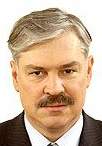
Balcytis |
Balcytis, Zigmantas (b. Nov. 16, 1953, Juodziai village, Silute district, Lithuanian S.S.R.), finance minister (2005-07) and acting prime minister (2006) of Lithuania. He was also minister of transport and communications (2001-05).
Baldivieso Aparicio, Enrique (b. April 15, 1902, Tupiza, Bolivia - d. Oct. 16, 1957, Buenos Aires, Argentina), foreign minister (1936, 1937, 1944) and vice president (1938-39) of Bolivia.
Baldizón (Méndez), Manuel (Antonio) (b. May 6, 1970, Flores, Petén, Guatemala), Guatemalan presidential candidate (2011, 2015). He was secretary-general of the party Renewed Democratic Liberty (2010-14).
Baldomir (Ferrari), Alfredo (b. Aug. 27, 1884, Montevideo, Uruguay - d. Feb. 25, 1948, Montevideo), president of Uruguay (1938-43). He entered the army in 1900 and later studied architecture and engineering, designing many of Uruguay's buildings and works of art. He became head of the engineering section (1917) and architect (1919) to the Uruguayan general staff. In 1923 he became professor of engineering at the National Military School in Montevideo and subsequently was chief of military construction. He was chief of police in Montevideo in 1931-34 and became defense minister in 1934. The next year he was promoted to the rank of general in the engineers corps. Elected president in 1938, he succeeded his brother-in-law, Gabriel Terra. He appointed as his foreign minister Alberto Guani, whose long association with the League of Nations as permanent delegate for Uruguay gave him great insight into European politics. After the scuttling of the German battleship Graf Spee off Montevideo, General Baldomir redoubled his efforts to preserve the integrity of his country against the pro-Axis elements in the parliament and he began negotiations to place the naval bases of Uruguay at the disposal of the United States. Finally, in January 1942, he broke off diplomatic relations with the Axis powers. After a vote of censure in the Senate, he staged a coup on February 21, dissolving parliament and filling the capital with troops. His term, which was to expire in 1942, was extended but democratic constitutional government was restored by elections in November, in which Baldomir's Colorado Party and its presidential candidate, Juan José de Amézaga, won and a new constitution was approved.
Balducci, Ezio (b. Aug. 23, 1904, Serravalle, San Marino - d. Jan. 30, 1957, Rome, Italy), captain-regent of San Marino (1929-30).
Baldwin, Brian (Paul) (b. Dec. 7, 1944), administrator of Tristan da Cunha (1998-2001).
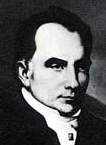
R. Baldwin |
Baldwin, Robert (b. May 12, 1804, York [now part of Toronto], Upper Canada [now Ontario] - d. Dec. 9, 1858, Spadina, near Toronto), joint premier of Canada (1841, 1842-43, 1848-51). He first became a member of the Upper Canada House of Assembly for York on Jan. 30, 1830. However the death of King George IV forced the dissolution of parliament; an election was called, and Baldwin lost his seat. In 1836 he served briefly on the Executive Council of Upper Canada and supported the union of Canada, condemning the Rebellion of 1837. He served (1841) on the Executive Council under Baron Sydenham but the governor's refusal to grant responsible government pushed Baldwin to resign and join the opposition. In 1842, under the governorship of Sir Charles Bagot, Baldwin and Louis Hippolyte Lafontaine formed a Liberal administration and held office until Bagot's successor, Sir Charles Metcalfe, caused most of the ministers to resign. In 1848 the Liberals were returned to power. Under the Earl of Elgin, Baldwin and Lafontaine saw the realization of their aim of responsible government and the enactment of other reforms, including municipal self-government for Canada West (former Upper Canada, now Ontario) and freeing of the University of Toronto from sectarian control. Feeling increasingly out of sympathy with the advanced reformers in his party and offended by an attempt to abolish the Court of Chancery in Canada West, which he had personally helped to establish, he resigned in 1851. He was not reelected to parliament by Toronto. In 1858 the coalition Liberal-Conservative Party invited him to stand for a seat in the upper house, but, dissociated from the radicals, he could not identify with the conservative element of the Liberal Party either.
Baldwin of Bewdley, Oliver Ridsdale Baldwin, (2nd) Earl, Viscount Corvedale of Corvedale (b. March 1, 1899 - d. Aug. 10, 1958, London, England), governor of the Leeward Islands (1948-50); son of Stanley Baldwin, Earl Baldwin of Bewdley. He succeeded to the earldom in 1947.
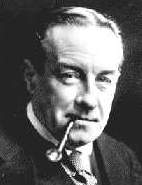
S. Baldwin |
Baldwin of Bewdley, Stanley Baldwin, (1st) Earl, Viscount Corvedale of Corvedale (b. Aug. 3, 1867, Bewdley, Worcestershire, England - d. Dec. 14, 1947, Astley Hall, near Stourport-on-Severn, Worcestershire), British prime minister (1923-24, 1924-29, 1935-37). He was elected member of the House of Commons for the Bewdley division of Worcestershire in 1908. In December 1916 he became parliamentary private secretary to Bonar Law, chancellor of the exchequer in David Lloyd George's World War I coalition ministry. In 1922 he became chancellor of the exchequer in the new Conservative government headed by Bonar Law. When ill health forced Law to resign, Baldwin was asked, on May 22, 1923, to form a government. In October he appealed for a mandate to reverse Law's free-trade policy; but a mandate was refused, and Baldwin's first ministry ended Jan. 22, 1924. He returned to office Nov. 4, 1924, following the downfall of the first Labour prime minister, Ramsay MacDonald. In 1927 he secured passage of the antiunion Trade Disputes Act. A Conservative electoral defeat caused Baldwin to resign June 4, 1929. He returned to the government in 1931 as lord president of the council in MacDonald's national coalition ministry. Another general election in 1935 brought him back into power as prime minister, with a majority of 250. In view of the Italian conquest of Ethiopia, the unopposed German reoccupation of the Rhineland, and German-Italian intervention in the Spanish Civil War, he began to strengthen the military establishment. In 1936 he procured the abdication of the new king, Edward VIII. Five months later he resigned in favour of Neville Chamberlain, was made an earl and a knight of the garter, and retired from politics.
Balé, Raymond Serge (b. 1949, Brazzaville, French Congo [now Congo (Brazzaville)]), Congo (Brazzaville) diplomat. He was ambassador to Ethiopia (2005-08) and permanent representative to the United Nations (2008-22).
Baleta, Abdi (b. 1941, Guri i Bardhë, Albania), Albanian diplomat. He was permanent representative to the United Nations (1977-83).
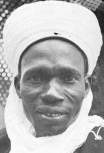
Balewa |
Balewa, (Alhaji) Sir Abubakar Tafawa (b. 1912, Tafawa Balewa village, Bauchi emirate, Northern Nigeria - d. January 1966, near Ifo, Nigeria), prime minister of Nigeria (1957-66). In 1946 he was elected to the House of Assembly of the Northern Region and in 1947 was one of five representatives to the Central Legislative Council in Lagos. He was reelected to the assembly in 1951 despite the hostility of some conservative emirs of the generally Muslim north. A leader in the Northern Peoples Congress (NPC), he was both a defender of northern special interests and an advocate of reform and Nigerian unity. From 1952 until his death Balewa served in the federal government, first as minister of works and from 1954 as minister of transport. In 1955, to study ways of developing the Niger and Benue rivers, he visited the Netherlands. He also visited the U.S., where he toured the Mississippi water control system and was made an honorary citizen of New Orleans. As leader of the NPC in the House of Representatives, he was made the first prime minister of Nigeria in 1957. After the preindependence elections of 1959, he formed a coalition government of the NPC and Nnamdi Azikiwe's National Council of Nigeria and the Cameroons. As prime minister of independent (1960) Nigeria, he was sharply circumscribed in his powers by those delegated to regional premiers. By 1963 ethnic differences and thinly veiled separatist tendencies in the nation had begun to boil. He was killed in the first of two Nigerian army coups in 1966; he was abducted on January 15, and his death was announced on January 22, his remains having been discovered the previous day. Balewa attained the honorary title of Alhaji after a pilgrimage to Mecca in 1957 and was knighted by Queen Elizabeth II in 1960.
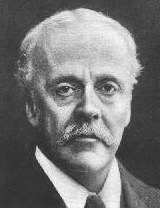
Balfour |
Balfour, Arthur James Balfour, (1st) Earl of, Viscount Traprain of Whittingehame (b. July 25, 1848, Whittingehame, East Lothian, Scotland - d. March 19, 1930, Woking, Surrey, England), British prime minister (1902-05); nephew of Robert Cecil, Marquess of Salisbury. He entered Parliament as a Conservative member for Hertford in 1874. In the second Salisbury ministry, he was secretary for Scotland (1886-87) and then chief secretary for Ireland (1887-91). An implacable opponent of Irish Home Rule, he earned the name "Bloody Balfour" because of his severity in suppressing insurrection. He became (1891) leader of the House of Commons and first lord of the treasury, thus being second in command to Lord Salisbury. During William Ewart Gladstone's last Liberal ministry (1892-94) he led the opposition in the House of Commons. In the last Salisbury government (1895-1902) Balfour became more powerful as his uncle's health declined. After Salisbury's retirement, Balfour became prime minister. Negotiations for an Anglo-French agreement (Entente Cordiale) were completed in 1904. Increasing Conservative disunity finally caused him to resign, although he remained the official party leader until November 1911. On May 25, 1915, when H.H. Asquith formed a wartime coalition ministry, Balfour succeeded Winston Churchill as first lord of the Admiralty. In David Lloyd George's coalition he was foreign secretary (1916-19). He is perhaps best remembered for the so-called Balfour Declaration (1917), pledging British aid for Zionist efforts to establish a home for world Jewry in Palestine. After the war Balfour served twice in the cabinet post of lord president of the council (1919-22, 1925-29). In 1922 he was created an earl and a knight of the garter.
Balfour-Paul, (Hugh) Glencairn (b. Sept. 23, 1917, Moniaive, Dumfriesshire, Scotland - d. July 2, 2008, Shobrooke, Devon, England), British political agent in the Trucial States (1964-66). He was also ambassador to Iraq (1969-71), Jordan (1972-75), and Tunisia (1975-77).

Balgimbayev | 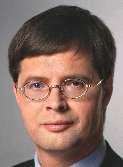
Balkenende |
Balgimbayev, Nurlan (Utebovich), Kazakh Nurlan (Utep-uly) Balgimbayev (b. Nov. 20, 1947 - d. Oct. 14, 2015, Atyrau, Kazakhstan), prime minister of Kazakhstan (1997-99). He was also minister of oil and gas (1994-97).
Bali, Slaheddine, also spelled Baly (b. July 29, 1926, Tunis, Tunisia - d. 2002), justice minister (1973-80, 1988) and defense minister (1980-88) of Tunisia. He was also president of the Chamber of Deputies (1988-90) and of the Constitutional Council (1990-92).
Balindlela, (Zisiwe) Nosimo (Beauty) (b. Nov. 28, 1949, Hermanus, Cape province [now in Western Cape], South Africa), premier of Eastern Cape (2004-08).
Balkenende, Jan Peter, byname of Jan Pieter Balkenende (b. May 7, 1956, Kapelle, Zeeland, Netherlands), prime minister of the Netherlands (2002-10).
Ball, Sir Alexander John, (1st) Baronet (baptized July 22, 1756, Painswick, Gloucestershire, England - d. Oct. 25, 1809, Attard, near Valletta, Malta), president of the Provisional Government in rebellion (1799-1800), British representative (1800-01), and civil commissioner (1803-09) of Malta. He was made a baronet on June 24, 1801.

D. Ball |
Ball, Dwight (b. 1957?, Deer Lake, Nfld.), premier of Newfoundland and Labrador (2015-20).
Ball, George W(ildman) (b. Dec. 21, 1909, Des Moines, Iowa - d. May 26, 1994, New York City), U.S. ambassador to the United Nations (1968).

Balladur |
Balladur, Édouard (b. May 2, 1929, Izmir, Turkey), prime minister of France (1993-95). He worked for the Council of State as a junior official. In 1962 he joined the Office of Radio and Television Broadcasting (ORTF). The head of ORTF recommended him to Prime Minister (later Pres.) Georges Pompidou, and during the 1960s and '70s Balladur was a member of Pompidou's staff, serving as adviser (1964-68) and becoming deputy secretary-general to the president (1969) and then secretary-general (1974). From 1984 to 1988 Balladur served as councillor of state, and he was an adviser to Jacques Chirac, the leader of the neo-Gaullist party Rally for the Republic (RPR). In 1986 Balladur was elected to the National Assembly as deputy for Paris, but he gave up his seat to join newly appointed Prime Minister Chirac's cabinet as minister of economy, finance, and privatization. A political moderate, Balladur had helped develop the formula for "cohabitation," the sharing of power between the Socialist president, François Mitterrand, and Chirac's conservative government. As finance minister he launched an ambitious privatization program; oversaw the easing of controls on prices, capital, and labour; and supported the introduction of a single European currency. Chirac's government left office in 1988, and Balladur was reelected to the National Assembly. After conservatives won an overwhelming majority in the National Assembly elections of March 21, 1993, Mitterrand, forced to choose a right-wing head of government, appointed Balladur as prime minister. Balladur thus headed another "cohabitation" government. In 1995 he ran for president but finished only third behind Lionel Jospin and Jacques Chirac; he then supported Chirac in the runoff.
Ballal, Musa Awad, also spelled Bilal (b. Jan. 20, 1931, al-Fashir, Sudan), Sudanese politician. He was minister of supply (1971-72) and industry and mining (1972-75) and ambassador to West Germany (1975-78), Kuwait (1978-80), and Tunisia (1980-84).
Ballantrae (of Auchairne in the County of Ayr and of the Bay of Islands in New Zealand), Bernard (Edward) Fergusson, Baron (b. May 6, 1911 - d. Nov. 28, 1980, London, England), governor-general of New Zealand (1962-67); son of Sir Charles Fergusson. He was knighted in 1962 and made a life peer in 1972.

Ballantyne |
Ballantyne, Sir Frederick (Nathaniel) (b. July 5, 1936 - d. Jan. 23, 2020, Villa, St. Vincent and the Grenadines), governor-general of St. Vincent and the Grenadines (2002-19); knighted 2002.
Ballard, Greg (b. Nov. 20, 1954, Indianapolis, Ind.), mayor of Indianapolis (2008-16).
Ballay, Noël (Eugène Victor) (b. July 14, 1847, Fontenay-sur-Eure, Eure-et-Loir, France - d. Jan. 26, 1902, Saint-Louis, Senegal), lieutenant governor of Gabon (1886-89), acting commissioner-general of Gabon and Congo (1888-90), governor of French Guinea (1891-1900), and governor-general of French West Africa and governor of Senegal (1900-02).
Ballesteros (Ríos), Manuel Egidio (b. Sept. 1, 1844, Santiago, Chile - d. Nov. 30, 1914, Santiago), interior minister of Chile (1904). He was also justice and education minister (1901).
Ballinger, Richard A(chilles) (b. July 9, 1858, Boonesboro, Iowa - d. June 6, 1922, Seattle, Wash.), mayor of Seattle (1904-06) and U.S. secretary of the interior (1909-11).
Ballivián (Coll), Adolfo (b. Nov. 15, 1831, La Paz, Bolivia - d. Feb. 14, 1874, Ñucchu, Chuquisaca, Bolivia), president of Bolivia (1873-74); son of José Ballivián.
Ballivián (Segurola), José (b. May 5, 1805, La Paz, Viceroyalty of La Plata [now in Bolivia] - d. Oct. 6, 1852, Rio de Janeiro, Brazil), defense minister (1839) and president (1841-47) of Bolivia.
Ballivián Rojas, Hugo (b. June 7, 1901, La Paz, Bolivia - d. July 15, 1993, La Paz), chairman of the military junta of Bolivia (1951-52).

Ballmer |
Ballmer, Adrian (b. Jan. 23, 1947, Basel, Switzerland), president of the government of Basel-Land (2004-05, 2008-09).
Ballón Landa, (Ignacio Jesús Víctor) Alberto (b. Jan. 23, 1885, Arequipa, Peru - d. 1964), justice and education minister of Peru (1932).
Ballot, (Marie Paul) Victor (b. Oct. 11, 1853, Fort-de-France, Martinique - d. March 17, 1939, Paris, France), governor of Dahomey (1894-99) and Guadeloupe (1907-08).
Balluku, Beqir (b. Feb. 14, 1917, Tiranë, Albania - d. [executed] Nov. 5, 1975), defense minister of Albania (1953-74). He was also army chief of staff (1948-53) and a deputy premier (1954-74).
Balluseck, Daniel Johannes von (b. March 8, 1895, Utrecht, Netherlands - d. Feb. 29, 1976, The Hague, Netherlands), Dutch diplomat. He was permanent representative to the United Nations (1950-55) and ambassador to the Soviet Union (1955-57) and Canada (1958-60).
Balmaceda (Fernández), José Elías (b. 1849, Santiago, Chile - d. April 13, 1916, Santiago), interior minister of Chile (1915-16); brother of José Manuel Balmaceda. He was also president of the Senate (1909).
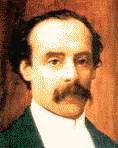
J.M. Balmaceda |
Balmaceda (Fernández), José Manuel (Emiliano) (b. July 19, 1840, Santiago, Chile - d. Sept. 19, 1891, Santiago), president of Chile (1886-91). He was elected to the Chilean congress in 1870. A leader of a liberal, anticlerical group, he was sent as minister to Argentina (1878), where he successfully prevented Argentina from entering the War of the Pacific. While serving in the cabinet of Pres. Domingo Santa María as foreign minister (1881-82) and interior minister (1882-85), he promoted public works. He was seen as the real man at the wheel and at the next election he was triumphantly returned by the Liberal Party. As president he advanced public education and railroad construction but inherited the legislative revolt against the executive begun in the 1860s. His attempts to prevent congressional limitation of the presidential powers led to the outbreak of civil war in January 1891. Congress, with navy support, defeated Balmaceda's forces within eight months. He took refuge in the Argentine legation and, rather than surrender to a trial, he committed suicide by shooting himself through the temple; this news was received with great rejoicing throughout Chile. His defeat left parliamentary government entrenched until the mid-1920s.
Balmaceda (Fernández), (José) Rafael (del Carmen) (b. Aug. 23, 1850, Renca, Santiago province, Chile - d. Aug. 7, 1911, Santiago, Chile), foreign minister of Chile (1908-09); brother of José Manuel Balmaceda and José Elías Balmaceda. He was also minister of justice and education (1901-02) and interior (1905).
Balmaceda Saavedra, Carlos (b. April 8, 1879, Santiago, Chile - d. Aug. 21, 1958, Santiago), foreign minister of Chile (1931, 1931-32). He was also minister of finance (1910) and lands and colonization (1931) and president of the Chamber of Deputies (1912, 1915-16).
Balmaceda Toro, Enrique (Víctor Aquiles) (b. March 3, 1878 - d. Jan. 4, 1962, Santiago, Chile), war and marine minister (1921), interior minister (1927-28), and acting justice minister (1927-28) of Chile; son of José Manuel Balmaceda. He was also mayor of Santiago (1928-29) and ambassador to the United Kingdom (1953-58).
Balodis, Antons (b. Jan. 15, 1880, Jerceni, Russia [now in northern Latvia] - d. Jan. 1, 1942), foreign minister of Latvia (1928-30). He was also ambassador to Lithuania (1924-28) and Finland (1930-33).
Balodis, Janis (b. Feb. 20, 1881, Trikata, Russia [now in Latvia] - d. Aug. 8, 1965, Saulkrasti, Latvian S.S.R.), war minister (1931-40), justice minister (1934), and deputy prime minister (1938-40) of Latvia. He was also commander-in-chief of the army (1919-21).
Balogh, Jenö (b. May 14, 1864, Devecser, Hungary - d. Feb. 15, 1953, Budapest, Hungary), justice minister of Hungary (1913-17).
Baloghy, György (b. Oct. 22, 1861, Derencsény, Hungary - d. Oct. 22, 1931, Budapest, Hungary), justice minister of Hungary (1919).
Balói, Oldemiro (Júlio Marques) (b. April 9, 1955, Maputo, Mozambique - d. April 12, 2021, South Africa), foreign minister of Mozambique (2008-17). He was also minister of industry, trade, and tourism (1994-99).
Balopi, Patrick (Kediretswe) (b. Feb. 1, 1941, Francistown, Bechuanaland [now Botswana]), labour and home affairs minister of Botswana (1989-94). He was also minister of health (1985-86) and local government and lands (1986-89, 1994-97) and speaker of the National Assembly (2004-09).
Balsai, István (Ákos) (b. April 5, 1947, Miskolc, Hungary - d. March 1, 2020), justice minister of Hungary (1990-94).
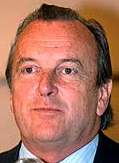
Balsemão |
Balsemão, Francisco (José Pereira) Pinto (b. Sept. 1, 1937, Lisbon, Portugal), prime minister of Portugal (1981-83). He was publisher from 1973 of the Expresso, which was strongly critical of the Salazar-Caetano regime. In 1975 Balsemão was vice-president of the Constituent Assembly and in 1977, opposition spokesman on foreign affairs. A pragmatist and conciliator, Balsemão was the opposite of Francisco Sá Carneiro, whom he succeeded as premier on Jan. 9, 1981, following the latter's death in a plane crash in December 1980. The two had been co-founders of the Social Democratic Party (PSD) in 1974, but the former leader's abrasive personality had caused numerous defections from the party. Those who picked Balsemão to succeed Sá Carneiro saw him as a more flexible manager who could steer Portugal through the difficult task of revising the 1976 Socialist constitution and preparing the country for membership in the European Communities. Balsemão maintained the free market-private enterprise slant of the PSD but with a much more urbane style, knowing that he would need a two-thirds majority in the Assembly to get his party's planned constitutional amendments passed. Balsemão's critics underestimated his role in keeping the PSD together when Sá Carneiro's intolerance of dissidents threatened to fragment the party. However, he had yet to convince the political and business communities of his determination in pursuing the PSD's program. An August 1981 crisis in which Balsemão called his critics' bluff and challenged them to find a replacement ended in triumph for him. The incident served to strengthen his hand and forced the dissidents to accept their share of the responsibility of running the country in a difficult period. He did not run for another term as PSD leader in 1983.
Balsiger, Hans-Ernst (b. Oct. 2, 1926, Kaiserstuhl, Aargau, Switzerland - d. [hit by a truck] Sept. 4, 2009, Luzern, Luzern, Switzerland), Schultheiss of Luzern (1984).
Balsimelli, Francesco (b. Jan. 29, 1894 - d. Feb. 21, 1974), captain-regent of San Marino (1944).
Balta (Montero), José (b. April 25, 1814, Lima, Peru - d. [assassinated] July 26, 1872, Lima), war and navy minister (1865) and president (1868-72) of Peru; brother of Juan Francisco Balta.
Balta (Paz), José (b. 1866, Chiclayo, Peru - d. March 14, 1939, Lima, Peru), finance minister of Peru (1913, 1914); son of the above. He was also minister of development and public works (1904-06).
Balta (Montero), Juan Francisco (b. 1806 - d. April 1892), war and navy minister (1868-71) and prime minister (1869-71) of Peru.
Baltayev, Karim (b. 1901, Khiva [now in Uzbekistan] - d. 1938), first secretary of the Communist Party committee of the Karakalpak A.S.S.R. (1937). He was also executive secretary of the party committee of Fergana okrug (1929-30) and people's commissar of agriculture of the Uzbek S.S.R. (1930-34).
Baltic, Milutin (b. Dec. 2, 1920, Donje Seliste village, near Glina, Croatia - d. Oct. 27, 2013, Zagreb, Croatia), president of the Presidency of Croatia (1983-84).
Baltimore, Benedict Leonard Calvert, (4th) Baron (b. March 21, 1679, probably Woodcote Park, Epsom, Surrey, England - d. April 16, 1715), governor of Maryland (1684-88); son of Charles Calvert, (3rd) Baron Baltimore. His father as proprietor of the colony named the child titular governor, the actual administration being carried on by the Council. He conformed to the established Church of England in 1713, succeeded as baron in February 1715, and had the colony, which his father had lost owing to his Catholicism, restored to him; however, he died himself two months later.
Baltimore (of Baltimore), Charles Calvert, (3rd) Baron (b. Aug. 27, 1637, England - d. Feb. 21, 1715, London, England), governor of Maryland (1661-76, 1679-84); nephew of Leonard Calvert. He was sent over as governor of Maryland in 1661 by his father, Cecilius Calvert, 2nd Baron Baltimore, and at his father's death in 1675 he succeeded as proprietor of the colony. Like his grandfather, George Calvert, 1st Baron Baltimore, Charles Calvert was a Roman Catholic, and anti-Catholic feeling was strong among Maryland's Protestant majority. Matters were further aggravated by the hostility of the Susquehanna Indians, as well as by Calvert's need to defend his territorial jurisdiction against claims by William Penn to the north. Antagonism in the Maryland Assembly led Calvert in 1670 to restrict the suffrage by property qualifications and occasionally to set aside acts of the legislature. In 1684 he went to England to defend himself in the dispute with Penn and to answer charges of favouring Catholics and obstructing customs collection. He never returned. After the Revolution of 1688 in England, he was deprived of the province. He was accused of taking part in two Roman Catholic plots but was never arrested.
Baltimore, Charles Calvert, (5th) Baron (b. Sept. 29, 1699, probably Woodcote Park, Epsom, Surrey, England - d. April 24, 1751, England), governor of Maryland (1732-33); son of Benedict Leonard Calvert, Baron Baltimore. He succeeded to the barony, and the proprietorship of Maryland, in 1715.
Baly, Ajamu G. (b. 1977, Sint Maarten), governor of Sint Maarten (2022- ).
Balzan, Walter (b. Dec. 28, 1946), Maltese diplomat. He was permanent representative to the United Nations (1999-2003) and ambassador to Austria (2003-06), Hungary (2006-07), Italy (2006-11), and Greece (2011-13).
Bamali, (Alhaji Mallam) Nuhu, Bamali also spelled Bamalli (b. 1917, Lere [now in Kaduna state], Nigeria - d. Feb. 25, 2001), foreign minister of Nigeria (1965-66); grandson of Malam Musa ibn Muhammad (ruler of Zaria).
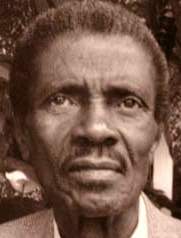
Bamana |
Bamana, Younoussa (b. April 1, 1935, Kani Kéli, Mayotte - d. June 22, 2007, Mamoudzou, Mayotte), prefect of Mayotte (1975-76). He was proclaimed prefect by pro-French demonstrators who did not want Mayotte to become part of the newly independent state of Comoros. He was president of the General Council of Mayotte from 1977 to 2004, and also the first deputy from Mayotte to the French parliament (1978-81).
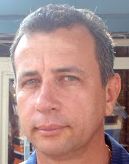
Bamanisa |
Bamanisa (Saïdi), Jean (b. April 7, 1964, Stanleyville, Congo [Léopoldville] [now Kisangani, Congo (Kinshasa)]), governor of Orientale (2013-15) and Ituri (2019-21).
Bamba, Nanlo (b. Nov. 15, 1916, Bouaké, Ivory Coast [now Côte d'Ivoire] - d. July 9, 1984), justice minister (1963-66) and interior minister (1966-74) of Ivory Coast. He was also minister of water and forests (1974-76) and a minister of state (1976-81).
Bamba, Youssoufou (b. Dec. 31, 1949, Abidjan, Ivory Coast [now Côte d'Ivoire]), Ivorian diplomat. He was ambassador to Ethiopia (1993-94), Japan and South Korea (1994-96), the United States (2000-01), the United Kingdom (2001-07), and Austria (2007-10), permanent representative to the United Nations (1996-98, 2010-15), and minister of international cooperation (1998-99).
Bambridge, Georges (b. June 1, 1887, Papeete, French Settlements in Oceania [now French Polynesia] - d. Jan. 19, 1942, Pirae, French Settlements in Oceania), mayor of Papeete (1933-42) and member of the Provisional Government of the French Settlements in Oceania (1940).
Bamela Engo, Paul (b. Oct. 5, 1931, Ebolowa, French Cameroons [now in Cameroon] - d. April 26, 2010, Yaoundé, Cameroon), Cameroonian diplomat. He was permanent representative to the United Nations (1984-90, 1996-98).
Bamigboye, David (Lasisi) (b. Dec. 7, 1940, Omu-Aran [now in Kwara state], Nigeria - d. Sept. 21, 2018, Lagos, Nigeria), governor of West Central/Kwara (1967-75).
Bamigboye, Theophilus (Oladapo) (b. March 3, 1951), administrator of Bauchi (1996-98) and Osun (1998-99); brother of David Bamigboye.

Bamina | 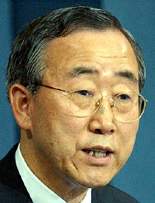
Ban |
Bamina, Joseph (b. 1925, Bukeye, Burundi - d. [executed] Dec. 16, 1965, Muramvya, Burundi), prime minister of Burundi (1965). He was also president of the Senate in 1965.
Ban Ki Moon, Revised Romanization Ban Gi-mun (b. June 13, 1944, Eumseong, North Chungchong province, Korea [now in South Korea]), foreign minister of South Korea (2004-06) and secretary-general of the United Nations (2007-16). He was ambassador to Austria in 1998-2000.
Bañados Espinosa, Julio (b. April 18, 1858, Valparaíso, Chile - d. Feb. 17, 1899, Santiago, Chile), interior minister of Chile (1891). He was also minister of justice and education (1888-89, 1890) and industry and public works (1897-98).
Bañados Honorato, Guillermo M(entor) (b. July 25, 1870, San Felipe, Chile - d. Dec. 2, 1947, Santiago, Chile), justice minister of Chile (1932). He was also minister of industry, public works, and railways (1924).
Banai, Tareq (M.A.M.) al-, Kuwaiti diplomat. He has been permanent representative to the United Nations (2022- ).
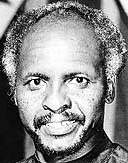
Banana |
Banana, Canaan (Sodindo) (b. March 5, 1936, Esiphezini, Essexvale district [now Esigodini district], Southern Rhodesia [now Zimbabwe] - d. Nov. 10, 2003, Harare), president of Zimbabwe (1980-87). On Nov. 26, 1998, he was found guilty of two cases of sodomy, nine cases of indecent assault, attempted sodomy, and of committing "unnatural" sexual acts. Banana, who pleaded not guilty to all the charges, had denied in court that he tried to sexually attack his aides-de-camp, guards, and cook or two other men he picked up on the streets. In a highly publicized trial that lasted 17 days, one of the alleged victims described how Banana had treated him to drinks, a game of cards, and ballroom music before drugging and raping him on a carpet in the presidential State House library. The aide also alleged he watched pornographic videos with his boss before they had sex. Until his indictment, Banana had been under police investigation for months after allegations that he had raped and forced one of his former aides into a homosexual relationship during his presidency. The aide, Jefta Dube, was sentenced to 10 years in jail for the 1995 fatal shooting of a fellow policeman, Patrick Mashiri, who goaded him by calling him "Banana's wife." Banana - a Methodist church priest, married with four children - dismissed all suggestions that he is a homosexual as "a mortuary of pathological lies and a malicious vendetta of vilification and character assassination." Banana fled the country ahead of his conviction, going first to Botswana and then to South Africa, but returned in December 1998 and was placed under house arrest. In January 1999 he was sentenced to 10 years in jail, but with nine years suspended. The Supreme Court upheld the conviction in May 2000. He was released in 2001 after serving eight months in jail, getting time off for good behaviour.
Banas, Marian (b. July 13, 1955, Piekielnik, Poland), finance minister of Poland (2019). He has also been head of the Customs Service (2005-08, 2015-17) and chairman of the Supreme Audit Office (2019- ).
Banc, Iosif (b. March 3, 1921, Alunis, Mures county, Romania), a deputy premier of Romania (1965-72). He was also minister of agriculture, food industry, and water (1971-72).
Bancroft, George (b. Oct. 3, 1800, Worcester, Mass. - d. Jan. 17, 1891, Washington, D.C.), U.S. secretary of the navy (1845-46). He was also minister to the United Kingdom (1846-49) and Prussia/Germany (1867-74) and president of the American Historical Association (1885-86).
Banda, Aleke (Kadonaphani) (b. Sept. 19, 1939, Livingstone, Northern Rhodesia [now Zambia] - d. April 9, 2010, Johannesburg, South Africa), finance minister of Malawi (1969-72, 1994-97). He was also minister of development and planning (1966-67, 1994-97), economic affairs (1967-68), trade and industry (1968-69, 1972-73), information (1969-72), tourism (1969-73), agriculture and irrigation (1997-2000, 2001-03), and health and population (2000-01). He was detained without trial from 1980 to 1992 under the regime of Hastings Kamuzu Banda (no relation).

E. Banda |
Banda, Etta (Elizabeth) (b. 1949), foreign minister of Malawi (2009-11).

H.K. Banda |
Banda, Hastings Kamuzu (b. 1898?1, near Kasungu, British Central Africa Protectorate [now Malawi] - d. Nov. 25, 1997, Johannesburg, South Africa), prime minister (1963-66) and president (1966-94) of Malawi (until 1964 Nyasaland). He first became involved in his homeland's politics when white settlers in the region demanded the federation of the Rhodesias and Nyasaland in 1949. Banda and others in Nyasaland strongly objected to this extension of white dominance, but the Federation of Rhodesia and Nyasaland was nevertheless established in 1953. In 1959 he was imprisoned by the British colonial authorities. He was released in 1960 and a few months later accepted British constitutional proposals granting Africans in Nyasaland a majority in the Legislative Council. He was minister of natural resources and local government in 1961-63, and he became prime minister in 1963, the year the federation was finally dissolved. He retained the post of prime minister when Nyasaland achieved independence in 1964 under the name of Malawi. Malawi became a republic in 1966 with Banda as president. He headed an austere, autocratic one-party regime and jailed or executed his opponents. He had himself declared president for life in 1971. He concentrated on building up infrastructure and increasing agricultural productivity. His foreign-policy orientation was decidedly pro-Western. Widespread domestic protests and the withdrawal of Western aid forced him to legalize other political parties in 1993. In the country's first multiparty presidential elections (1994), he was defeated by Bakili Muluzi. Muluzi's government tried him for the 1983 murder of four political opponents but he was found not guilty. He finally retired from opposition politics in July 1997.
1 Banda's official birthday was May 18, 1906, but he was widely believed to be older and the hospital where he died gave his age as 99. For many years, it was a criminal offense to discuss his age in Malawi. His nephew, former local government minister Katola Phiri, said Banda was actually born in 1896 and that his original name was Kamnkhwala Banda, he was baptized in 1910 Akim Kamnkhwala Mtunthama Banda, and changed the name to Hastings Kamuzu Banda sometime after 1917. (There even has been a story that Banda died young, while a medical student, and that Richard Armstrong, an American medical student who had befriended him, had taken his place.)
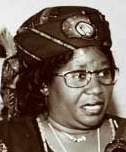
J. Banda | 
R. Banda |
Banda, Joyce (Hilda), née Mtila (b. April 12, 1950, Malemia, Zomba district, Nyasaland [now Malawi]), foreign minister (2006-09), vice president (2009-12), and president (2012-14) of Malawi. She was also minister of gender, child welfare, and community services (2004-06).
Banda, Rupiah (Bwezani) (b. Feb. 13, 1937, Gwenda, Southern Rhodesia [now Zimbabwe] - d. March 11, 2022, Lusaka, Zambia), foreign minister (1975-76), vice president (2006-08), and president (2008-11) of Zambia. He was also ambassador to the United Arab Republic (1965-67) and the United States (1967-69) and permanent representative to the United Nations (1974-75).
Banda-Bafiot, Gaston (b. May 15, 1934, Bossangoa, Oubangui-Chari [now Central African Republic] - d. Oct. 10, 2014, Strasbourg, France), Central African Republic politician. He was minister of power (1970-71) and mines and geology (1981) and ambassador to the United States (1973-75).
Bandaman, Maurice Kouakou (b. April 19, 1962, Kouamékro, Ivory Coast [now Côte d'Ivoire]), Ivorian politician. He has been minister of culture and Francophonie (2011-20) and ambassador to France (2020- ).
Bandar ibn Sultan (ibn Abdul Aziz Al Saud) (b. March 2, 1949, al-Ta´if, Saudi Arabia), Saudi prince; son of Sultan; grandson of Abdul Aziz. He was ambassador to the United States (1983-2005) and head of the General Intelligence Directorate (2012-14).
Bandara, Janaka Priyantha (b. Feb. 1, 1968), governor of Sabaragamuwa (2009-10). He has also been Sri Lankan ambassador to the United Arab Emirates (2008-09) and Myanmar (2022- ).
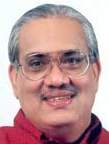
A. Bandaranaike |
Bandaranaike, Anura (Priyadarshi Solomon Dias) (b. Feb. 15, 1949, Colombo, Ceylon [now Sri Lanka] - d. March 16, 2008, Colombo), foreign minister of Sri Lanka (2005); son of S.W.R.D. Bandaranaike and Sirimavo Bandaranaike; brother of Chandrika Kumaratunga. He first entered parliament in 1977 and held the positions of opposition leader (1983-88), minister of higher education (1993-94), and parliamentary speaker (2000-01). He was appointed minister of industry, tourism, and investment promotion when Kumaratunga's party returned to power in 2004. He kept the tourism portfolio when he was appointed foreign minister in 2005. When a new cabinet was appointed later that year, he lost the foreign portfolio again but was confirmed as tourism minister, a post he held until January 2007, when he was given the less significant portfolio of national heritage. In February 2007 he was sacked as part of a cleanup of dissidents within the government and said he was happy to be out of a "carnival of clowns," but within two weeks he was reinstated in the post as the differences between him and Pres. Mahinda Rajapakse were said to be resolved. In December, however, he resigned and defected from the government.
Bandaranaike, Felix (Reginald) Dias (b. Nov. 5, 1930 - d. June 26, 1985), finance minister of Ceylon/Sri Lanka (1960-62, 1975-77). He was also minister without portfolio (1962-63) and minister of agriculture, food, and cooperatives (1963-64), agriculture, food, and fisheries (1964-65), public administration, local government, and home affairs (1970-75), and justice (1972-77).

S.W.R.D.
Bandaranaike |
Bandaranaike, S(olomon) W(est) R(idgeway) D(ias) (b. Jan. 8, 1899, Colombo, Ceylon [now Sri Lanka] - d. Sept. 26, 1959, Colombo), prime minister of Ceylon (1956-59). He became interested in the fight for self-government and joined the National Congress Party. In 1931 he was elected to the newly formed legislative assembly, the State Council. In 1947, as a prominent member of the governing United National Party (UNP), he was elected to the new House of Representatives and appointed minister of health and local government. He resigned from the government and the Western-oriented UNP in 1951 and founded the Sinhale Haha Sabha. Before the next election - in 1952 - he dissolved the latter group and founded the nationalist Sri Lanka (Blessed Ceylon) Freedom Party. It gained only nine seats in the House, but he was returned with a record majority and became leader of the opposition. Four years later he formed the Mahajana Eksath Peramuna (MEP; People's United Front), a political alliance of four nationalist-socialist parties, which swept the election; he became prime minister on April 12, 1956. The MEP advocated a neutralist foreign policy and strong nationalist policies at home. Sinhalese, the language spoken by the majority community, replaced English as the official language of the country, and Buddhism, the majority religion, was given a prominent place in the affairs of state. By amicable agreement the British relinquished their military bases on the island, and Ceylon established diplomatic relations with Communist states. A disgruntled Buddhist monk, Talduwe Somarama, shot Bandaranaike on Sept. 25, 1959, and he died the following day. After the 1960 elections, his widow, Sirimavo Bandaranaike, became prime minister.
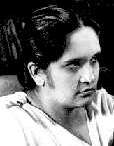
Sirimavo
Bandaranaike |
Bandaranaike, Sirimavo (Ratwatte Dias), original name Sirima Ratwatte (b. April 17, 1916, Ratnapura, Ceylon [now in Sabaragamuwa province, Sri Lanka] - d. Oct. 10, 2000, Colombo), prime minister (1960-65, 1970-77, 1994-2000) and foreign and defense minister (1960-65, 1970-77) of Sri Lanka (until 1972 Ceylon); widow of S.W.R.D. Bandaranaike. After her husband was assassinated in 1959, she was induced by his Sri Lanka Freedom Party (SLFP) to become the party's leader (May 1960). The SLFP won a decisive victory at the general election in July 1960, and she became the world's first woman prime minister. (The suffix "vo" began to be added to her name as a term of respect at this time.) She carried on her husband's policies of socialism, neutrality in international relations, and the active encouragement of the Buddhist religion and of the Sinhalese language and culture. In 1964 her coalition with the Marxist Lanka Sama Samaja Party caused dissension in her government, which was subsequently defeated in the general election of 1965. In 1970, however, her socialist coalition, the United Front, regained power, and as prime minister (also taking the planning and employment portfolios) she pursued more radical policies. Her strategy, which included the nationalization of important industries, was nullified by repressive measures and failure to deal with ethnic rivalries and economic distress; in the election of July 1977 her party retained only 8 of 168 seats in the National Assembly and she was replaced as prime minister. In 1980 parliament expelled her and barred her from political office, but in 1986 Pres. J.R. Jayewardene granted her a pardon that restored her rights. In 1988 she was a presidential candidate, being narrowly defeated by Ranasinghe Premadasa. In 1994 her daughter, Chandrika Kumaratunga, was elected president and appointed her to a third term as prime minister, a position that had become largely ceremonial. She stepped down in August 2000 to let her daughter reorganize the cabinet ahead of elections; she died shortly after voting on election day.
Bandawe, Gamaliel Petro (b. March 16, 1932), Malawian diplomat. He was high commissioner to Kenya (1971-72) and Zambia (2000-02) and permanent representative to the United Nations (1972).
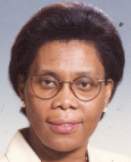
Alda Bandeira |
Bandeira (Tavares Vaz da Conceição), Alda (b. Sept. 22, 1949, Santana, São Tomé), foreign minister of São Tomé and Príncipe (1991-92, 2002); wife of Norberto Costa Alegre. She was also a presidential candidate (1996).
Bandeira, Antonio Herculano de Souza (b. April 18, 1854 - d. Nov. 16, 1890, Nova Friburgo, Rio de Janeiro, Brazil), president of Paraíba (1885-86) and Mato Grosso (1889); nephew of Manoel Clementino Carneiro da Cunha.
Bandeira, Esmeraldino Olímpio Torres (b. Feb. 27, 1865, Recife, Pernambuco, Brazil - d. April 4, 1928, Rio de Janeiro, Brazil), justice and interior minister of Brazil (1909-10). He was also mayor of Recife (1898-1902).
Bandic, Milan (b. Nov. 22, 1955, Grude, Bosnia and Herzegovina - d. Feb. 28, 2021, Zagreb, Croatia), Croatian politician. He was mayor of Zagreb (2000-02, 2005-21) and a presidential candidate (2009-10).
Bandio, Jean-Arthur (b. June 6, 1923, Brazzaville, Middle Congo [now Congo (Brazzaville)] - d. Nov. 16, 1992, Blois, Loir-et-Cher, France), interior minister (1960-67) and foreign minister (1967-68) of the Central African Republic. He was also ambassador to Italy (1969-70) and Egypt (1970-74), permanent representative to the United Nations (1974-78), and mayor of Bangui (1980-81).
Bandodkar, Dayanand B(alkrishna) (b. March 12, 1911, Pernem, Goa, Portuguese India [now in India] - d. Aug. 12, 1973), chief minister of Goa, Daman and Diu (1962-66, 1967-73).
Banér, Axel (Claesson) greve (b. Dec. 18, 1661, Kalmar, Sweden - d. July 29, 1742, Stockholm, Sweden), governor of Kronoberg (1710-18) and Stockholm (1718) counties. He was made greve (count) in 1719.

Banerjee |
Banerjee, Mamata (b. Jan. 5, 1955, Calcutta [now Kolkata], West Bengal, India), chief minister of West Bengal (2011- ). She joined the Congress (I) party in West Bengal and was first elected to the Lok Sabha (lower house of the national parliament) in 1984 from her home district in South Calcutta. She lost that seat in the 1989 elections but won it again in every election from 1991 to 2009. Known as Didi ("Big Sister") to her followers, she maintained her identity with her humble roots and never hesitated to voice her opinions bluntly and colourfully. She was especially outspoken against the Communists, who had been in power in West Bengal since 1977. Becoming disillusioned by what she saw as a corrupt Congress party, and also wanting to confront the ruling Communist Party of India (Marxist) (CPI-M) more directly in West Bengal, she founded the All India Trinamool Congress (TMC) in 1997. It had limited success in the 1998 and 1999 national elections. She became minister of railways (1999-2001, 2009-11) and coal and mines (2004) and minister without portfolio (2003-04). In 2001 the TMC challenged the CPI-M in state elections and won 60 seats, but the Communists remained firmly in power. The party lost nearly all its national seats in the 2004 election, and half of its seats in West Bengal in 2006. In December 2006 she waged a 25-day hunger strike to protest the attempt by the West Bengal government to forcibly acquire land from farmers to build an automobile factory. This issue became the catalyst for the party's and Banerjee's comeback from near political obscurity. The TMC had a strong showing in the 2009 national elections and joined Congress's ruling coalition as the second-largest faction. However, Banerjee had her sights set on the 2011 state elections and the real possibility of ousting the CPI-M from power. Her popularity grew in the next two years as she campaigned against the land-acquisition scheme and championed human rights and the protection of women and children. In the 2011 elections the TMC took more than 60% of the seats in the state legislature, ending more than three decades of Communist rule. She became the first woman chief minister of the state and proved to be a practical, tough administrator. In 2016 the party even won a two-thirds majority. She emerged as a major challenger to Prime Minister Narendra Modi's Bharatiya Janata Party government.
Banerji, Asoka Nath (b. Dec. 19, 1917, Banaras, India), governor of Himachal Pradesh (1981-83) and Karnataka (1983-88).
Bánffy de Losoncz, Dezsö báró (b. Oct. 28, 1843, Kolozsvár, Austria [now Cluj-Napoca, Romania] - d. May 24, 1911, Budapest, Hungary), prime minister of Hungary (1895-99). He was also speaker of the House of Representatives (1892-95) and minister a latere (1898).
Bánffy de Losoncz, Miklós (Domokos Pál) gróf (b. Dec. 30, 1873, Kolozsvár, Hungary [now Cluj-Napoca, Romania] - d. June 6, 1950, Budapest, Hungary), foreign minister of Hungary (1921-22).
Bang, Peter Georg (b. Oct. 7, 1797, Copenhagen, Denmark - d. April 2, 1861, Copenhagen), interior minister (1848-49, 1852-53, 1854-56) and prime minister (1854-56) of Denmark. He was also minister of education and ecclesiastical affairs (1851-52).
Bang, Thomas Cathinco (b. Jan. 25, 1827, Drammen, Buskerud [now in Viken], Norway - d. April 13, 1902, Drammen), governor of Buskerud (1882-84, 1890-1902) and interior minister of Norway (1884).
Banga-Bothy, Léonie, née Mbazoa, foreign minister of the Central African Republic (2013-14).
Bangabiti, Amos, foreign minister of Vanuatu (1996). He was also minister of transport, public works, and ports and marine (1992-95).
Bangarappa, S(arekoppa) (b. Oct. 26, 1932, Kubatur village, Shimoga district, Mysore [now Karnataka], India - d. Dec. 26, 2011, Bangalore [now Bengaluru], Karnataka), chief minister of Karnataka (1990-92).
Bangemann, Martin (Andreas) (b. Nov. 15, 1934, Wanzleben, Prussia [now part of Wanzleben-Börde, Sachsen-Anhalt], Germany - d. June 28, 2022, Saint-Vincent-la-Châtre, Deux-Sèvres, France), (West) German politician. He was general secretary (1974-75) and chairman (1985-88) of the Free Democratic Party, economy minister (1984-88), European commissioner for internal market and industrial affairs (1989-93) and industrial affairs, information technologies, and telecommunications (1993-99), and a vice president of the European Commission (1989-93, 1993-95).
Bangerskis, Rudolfs (b. July 21, 1878, Taurupe, Russia [now in Latvia] - d. [car accident] Feb. 25, 1958, Oldenburg, West Germany), war minister of Latvia (1924-25, 1926-28). He was a Waffen-SS leader during the German occupation in World War II.
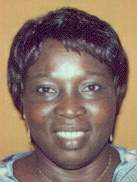
Bangoura |
Bangoura, (Camara Hadja) Mahawa (b. March 13, 1947, Conakry, French Guinea [now Guinea]), foreign minister of Guinea (2000-02). She was permanent representative to the United Nations in 1994-2000.
Bangui, Sylvestre (b. March 15, 1934, Mbaïki, Lobaye, Oubangui-Chari [now Central African Republic] - d. June 4, 1996, Paris, France), foreign minister (1979-80) and finance minister (1983-84) of the Central African Republic. He was also ambassador to Canada (1973-75) and France (1975-79).
Bangura, John (Amadu) (b. March 8, 1930, Kalangba, Bombali district, Northern province, Sierra Leone - d. June 29, 1971, Freetown, Sierra Leone), Sierra Leonean military figure. After the April 1968 coup, he became armed forces commander. He was executed after leading another coup attempt in March 1971.
Bangura, (Alimamy) Pallo (b. 1950?), foreign minister of Sierra Leone (1997-98). He was also permanent representative to the United Nations (1994-96), minister of energy and power (1999-2000), and a presidential candidate (2002; 1.7% of the vote).

Z. Bangura | 
Banharn |
Bangura, Zainab (Hawa) (b. Dec. 18, 1959, Tonkolili district, Sierra Leone), foreign minister of Sierra Leone (2007-10). She was also minister of health and sanitation (2010-12) and UN special representative on sexual violence in conflict (2012-17). In December 2019 she was appointed director-general of the UN Office at Nairobi.
Banharn Silpa-archa, also spelled Silapa-archa (b. Aug. 19, 1932, Suphan Buri province, Siam [now Thailand] - d. April 23, 2016, Bangkok, Thailand), interior minister (1990, 1995-96), finance minister (1990-91), and prime minister (1995-96) of Thailand.
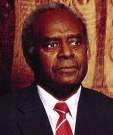
Bani |
Bani, John (Bennett) (b. July 1, 1941, Pentecost island, New Hebrides [now Vanuatu]), president of Vanuatu (1999-2004). Father John Bani, an Anglican priest, became involved in politics in the 1970s, together with Father Walter Lini and Donald Kalpokas. The three founded a newspaper which was successful in advocating independence for Vanuatu. Bani was elected the fifth president of Vanuatu when he succeeded in getting the required two-thirds support of the Electoral College, made up of 49 members of parliament and the heads of Vanuatu's six provincial councils. He received 43 votes. Only members of the National United Party voted against him.
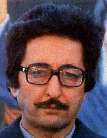
Bani-Sadr |
Bani-Sadr, Abolhassan (b. March 22, 1933, Hamadan, near Abadan, Iran - d. Oct. 9, 2021, Paris, France), president of Iran (1980-81). He was a leader of the antishah student movement in the early 1960s and was imprisoned twice for political activities. Wounded in the unsuccessful uprising of June 1963, he emigrated to France. He joined Ayatollah Ruhollah Khomeini's entourage during the latter's exile in France, and the two returned to Iran together on Feb. 1, 1979. Bani-Sadr was appointed deputy minister of economy and finance in Mehdi Bazargan's government in July 1979 and became full minister in November of that year. He was elected first president of the Islamic Republic of Iran on Jan. 25, 1980, with 75% of the popular vote. Khomeini, the nation's religious leader, administered the oath of office on February 4. Two days later Khomeini appointed Bani-Sadr chairman of the Revolutionary Council, Iran's policy-making body. As president of the republic Bani-Sadr was appointed commander in chief of the armed forces on February 19. In August and September 1980 he was fortunate to escape injury in two helicopter crashes near the Iraq frontier. His presidency was an uphill struggle against enemies in the clergy seeking to reduce him to a figurehead and also against inexperienced departmental executives. Some indignant members of the Majlis (parliament) on December 16 demanded his punishment for revealing "military secrets." Khomeini dismissed him as commander-in-chief after military reverses against Iraq in 1981 and he was forced to flee the country in July as crowds of hardliners surrounded his office, baying for his head. He escaped to France where he allied himself with the Islamic leftist Mujaheddin-e Khalq movement, which was crushed in a wave of bloodshed. He lived in Versailles, near Paris, in a villa closely guarded by French police.
Banjac, Mirko (b. Sept. 17, 1951, Strigova village, near Bosanska Dubica [now Kozarska Dubica, Republika Srpska], Bosnia and Herzegovina), chairman of the House of Representatives of Bosnia and Herzegovina (1999-2000).
Bankhead, William B(rockman) (b. April 12, 1874, Moscow, Ala. - d. Sept. 15, 1940, Bethesda, Md.), speaker of the U.S. House of Representatives (1936-40). He was the son of Sen. John Hollis Bankhead, brother of Sen. John H. Bankhead, and father of actress Tallulah Bankhead. He was a member of the House from 1917.
Banks, Rosemary (b. 1951, Christchurch, New Zealand), New Zealand diplomat. She was permanent representative to the United Nations (2005-09) and ambassador to France (2010-14) and the United States (2019-22).

V. Banks | 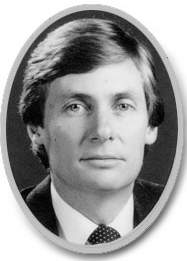
Bannon |
Banks, Victor (Franklin) (b. Nov. 8, 1947, Anguilla), chief minister (2015-19) and premier (2019-20) of Anguilla. He was also minister of social services (1981-84), finance and economic development (1994-99, 2000-10), investment and commerce (2000-10), and tourism (2005-10).
Banneville, Gaston-Robert Morin, marquis de (b. April 26, 1818 - d. June 13, 1881, Paris, France), foreign minister of France (1877). He was also ambassador to Switzerland (1866-68), the Papal State (1868-70), and Austria-Hungary (1871-73).
Bannis-Roberts, Loreen Ruth (b. Sept. 19, 1966, Castle Bruce, Dominica), Dominica politician. She was minister of tourism, industry, and private sector relations (2005, acting) and community development, culture, gender affairs, and information (2007-09) and permanent representative to the United Nations (2016-22).
Bannon, John (Charles) (b. May 7, 1943, Bendigo, Vic. - d. Dec. 13, 2015), premier of South Australia (1982-92).
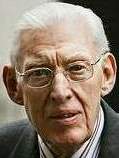
Bannside |
Bannside, Ian (Richard Kyle) Paisley, Baron (b. April 6, 1926, Armagh, Northern Ireland - d. Sept. 12, 2014), first minister of Northern Ireland (2007-08). He co-founded the Free Presbyterian Church in 1951. Although it attracted less than 1% of Northern Ireland's population, he became popular as a Protestant leader in the divided province. He was imprisoned for three months in 1966 for leading a banned march through a Catholic section of Belfast, and for over a month in 1969 for participating in an unlawful assembly. In 1970 he was elected to the British and Northern Ireland parliaments. In 1971 he founded the Democratic Unionist Party (DUP), splitting from the dominant Ulster Unionist Party (UUP). In 1979-2004 he was a member of the European Parliament, being remembered for his outburst against Pope John Paul II, who spoke there in 1988. Paisley roared, "Antichrist! I renounce you and all your cults and creeds," and had to be dragged from the chamber. He bitterly opposed the 1998 Good Friday agreement, which paved the way for the formation of a government of Northern Ireland consisting of representatives of the major parties representing both the Protestant and Catholic communities. In 2003 the DUP became the largest unionist party in the Northern Ireland Assembly, and thereafter Paisley, who had been a symbol of intolerant sectarianism, made overtures to the Irish-nationalist Sinn Féin. When the suspension of Northern Irish self-government was lifted in 2007, he formed a power-sharing government with Sinn Féin, which worked remarkably well. In January 2008 he stepped down as moderator of the Free Presbyterian Church, and in May-June he resigned as DUP leader and first minister. In 2010 he did not seek reelection to his seat in the House of Commons and was made a life peer.
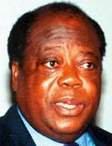
C.K. Banny |
Banny, Charles Konan (b. Nov. 11, 1942, Divo, southern Ivory Coast [now Côte d'Ivoire] - d. Sept. 10, 2021, Neuilly-sur-Seine, France), prime minister and finance minister of Côte d'Ivoire (2005-07); brother of Jean Konan Banny.
Banny, Jean Konan (b. July 14, 1929, Divo, southern Ivory Coast [now Côte d'Ivoire] - d. May 27, 2018, Abidjan, Côte d'Ivoire), defense minister of Ivory Coast/Côte d'Ivoire (1960-63, 1981-90). He was also mayor of Yamoussoukro (1985-95) and resident minister of the autonomous district of Yamoussoukro (1996-99).
Banovic, Luka (b. Oct. 10, 1926, Prekornica, near Cetinje, Yugoslavia [now in Montenegro] - d. ...), interior minister (1971-74) and justice minister (1978-82) of Yugoslavia.
Banozic, Mario (b. March 10, 1979, Vinkovci, Croatia), defense minister of Croatia (2020- ). He was also minister of state property (2019-20).
Bantysh-Kamensky, Dmitry (Nikolayevich) (b. Nov. 16 [Nov. 5, O.S.], 1788, Moscow, Russia - d. Feb. 6 [Jan. 25, O.S.], 1850, St. Petersburg, Russia), governor of Tobolsk (1825-28) and Vilna (1836-38); son-in-law of Knyaz Ivan (Sergeyevich) Baryatinsky; grandnephew of Amvrosy (1708-1771).
Bañuelos (Bañuelos), (José) Félix (b. Oct. 1, 1878, Monte Escobedo, Zacatecas, Mexico - d. Sept. 2, 1948, Mexico City, Mexico), governor of Quintana Roo (1931-32) and Zacatecas (1936-40).
Banya, Sama (Siama) (b. June 10, 1930, Sierra Leone), finance minister (1980-81), interior minister (1982-85), and foreign minister (1998-2001) of Sierra Leone. He was also minister of economic planning and development (1978-80, 1981-82).
Banyat Bantadtan (b. May 15, 1942, Surat Thani province, Thailand), interior minister of Thailand (2000-01). He was also minister of science, technology, and energy (1986-88).
Banza, Alexandre (b. Oct. 10, 1923, Carnot, Oubangui-Chari [now Central African Republic] - d. [executed] April 12, 1969, Bangui, Central African Republic), finance minister of the Central African Republic (1966-68). He was also minister of veterans (1966-67), national economy (1967-68), and public health and social affairs (1968-69).
Banzar, Jhambalyn (b. July 10, 1922), Mongolian diplomat. He was ambassador to Hungary (1960-64), France (1969-73), Poland (1970s), and the United Kingdom (1984-86) and permanent representative to the United Nations (1966-68).
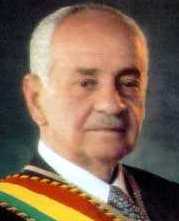
Banzer |
Banzer Suárez, Hugo, byname El Petiso (Spanish: "The Short One") (b. May 10, 1926, Concepción, Santa Cruz department, Bolivia - d. May 5, 2002, Santa Cruz de la Sierra, Bolivia), president of Bolivia (1971-78, 1997-2001). He served as minister of education (1964-66) in the cabinet of Pres. René Barrientos and as military attaché in Washington (1967-69) until he returned to Bolivia to head the Military College. In successive governmental changes between right- and left-wing officers, the conservative Banzer helped Gen. Rogelio Miranda overthrow Pres. Alfredo Ovando in September 1970; in August 1971 Banzer himself overthrew the leftist Gen. Juan José Torres, who had dismissed him as director of the Military College. Banzer encouraged foreign investment, but his restrictive policies regarding union activity and constitutional liberties led to opposition from labour leaders, clergymen, peasants, and students. All opposition was severely repressed. In 1974 he survived two coup attempts and also suppressed a peasant uprising. He declined to run for president in the 1978 elections, which were won by Gen. Juan Pereda Asbún amid universal charges of vote fraud. Pereda himself requested a new election, but before it could take place, he staged a coup, forcing Banzer to resign on July 21, 1978. Exiled by Pereda as ambassador to Argentina, Banzer returned in 1979 and entered the presidential elections in that year and subsequent years. In 1985 he led the popular vote but lost in the subsequent runoff in the Congress. He placed second in the 1989 and 1993 elections. In 1997 he won the popular vote as well as the runoff in Congress and took office for a five-year term. His efforts to sharply reduce coca cultivation won him praise in Washington. He was forced by cancer to resign in 2001, a year before his term ended.
Banzio, Dagobert (b. June 21, 1957, Tinhou, Ivory Coast [now Côte d'Ivoire] - d. Aug. 26, 2017, Málaga, Spain), Ivorian politician. He was minister of youth, civic education, and sports (2005-07), youth, sports, and leisure (2007-10), economic infrastructure (2010), youth, sports, and urban health (2010-11 [Ouattara government]), and trade (2011-12).
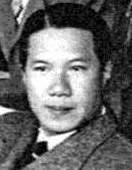
Bao Dai |
Bao Dai (era name), personal name Nguyen Phuoc Vinh Thuy (b. Oct. 22, 1913, Hue, Annam [now in Vietnam] - d. July 31, 1997, Paris, France), emperor of Vietnam (1926-45) and premier (1949-50) and chief of state (1949-55) of South Vietnam. After the death of his father, Emperor Khai Dinh, in November 1925, he succeeded to the throne in January 1926 and assumed the title Bao Dai ("Keeper of Greatness"). He initially sought to reform and modernize the country but was unable to win French cooperation. The Japanese swept away French administration in Indochina in March 1945 and allowed him to remain as an essentially powerless ruler. When the Viet Minh seized power in August 1945, Ho Chi Minh and his colleagues asked him to resign. Judging that there was symbolic value to be gained by having Bao Dai linked to them, they offered him an advisory role as "Citizen Prince Nguyen Vinh Thuy." But in 1946 Bao Dai left Hanoi for China. In 1949 the French accepted the principle of an independent Vietnam but retained control of its defense and finance. Bao Dai returned on April 28, 1949, and became premier of a nominally independent State of Vietnam. Reinstalled as chief of state, he continued his pleasure-seeking ways, became generally known as the "Playboy Emperor," and left the affairs of state to his various pro-French Vietnamese appointees. When the 1954 peace accord between the French and Communists resulted in the formal division of Vietnam into North and South, he tried to assume true power in South Vietnam. But in 1955 he was deposed by his premier Ngo Dinh Diem, who used his military power and a questionable referendum to declare himself head of state. Bao Dai fled to France, where he spent the rest of his life.

Bao G. |
Bao Guiqing (b. 1867, Haicheng, Liaoning, China - d. March 1, 1934, Beijing, China), military and civil governor of Heilongjiang (1917-19), military (1919-21) and civil (1920-21) governor of Jilin, and army minister of China (1921-22). As a general loyal to the Qing dynasty, he supported the imperial order and led his forces to Wuhan to fight against the revolting army of Hubei in October 1911. He turned to Yuan Shikai after the founding of the republic, persecuting the revolutionary activists in the northeastern region. After Yuan's death, he turned to Zhang Zuolin and started his gubernatorial career in the northeast. He resigned from all his posts and quit politics upon the fall of Zhang Zuolin.
Baptista, António Maria (b. Jan. 5, 1866, Beja, Portugal - d. June 6, 1920, Lisbon, Portugal), prime minister of Portugal (1920). He was also minister of war (1919) and interior (1920).
Baptista, Ernesto José, acting president of Piauí (1855, 1859, 1860).
Baptista, Graciliano de Paula (b. Aug. 12, 1840 - d. Sept. 8, 1886, Recife, Pernambuco, Brazil), president of Piauí (1877).
Baptista, Homero (b. Jan. 30, 1860, São Borja, Rio Grande do Sul, Brazil - d. Oct. 14, 1924, Rio de Janeiro, Brazil), finance minister of Brazil (1919-22). He was also president of the Bank of Brazil (1914-19).
Baptista, José da Silva (b. Sept. 1, 1855, Meia Ponte [now Pirenópolis], Goiás, Brazil - d. Dec. 7, 1910, Anápolis, Goiás), acting president of Goiás (1909). He was also acting mayor of Anápolis (1892).
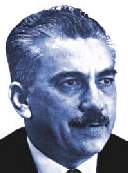
L. Baptista | 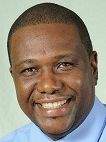
Baptiste |
Baptista, Lourival (Gomes da Costa) (b. Oct. 3, 1915, Sítio do Meio, Entre Ríos municipality, Bahia, Brazil - d. March 8, 2013, Brasília, Brazil), governor of Sergipe (1967-70).
Baptista (Caserta), (José) Mariano (b. July 16, 1832, Calchani, Bolivia - d. March 19, 1907, Cochabamba, Bolivia), foreign minister (1873-76, 1888-91), vice president (1884-88), and president (1892-96) of Bolivia.
Baptista Gumucio, Fernando (b. 1932, Cochabamba, Bolivia - d. 2008, La Paz, Bolivia), finance minister of Bolivia (1983-84).
Baptista Gumucio, Mariano (b. 1933, Cochabamba, Bolivia), Bolivian politician; brother of Fernando Baptista Gumucio. He was minister of education (1979-80, 1989-91) and ambassador to the United States (1983-85).
Baptiste, Alva (Romanus) (b. March 20, 1967, Laborie, Saint Lucia), foreign minister of Saint Lucia (2011-16, 2021- ). He has also been minister of international trade and civil aviation (2011-16, 2021- ) and diaspora affairs (2021- ).
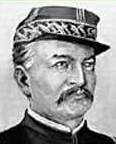
Baquedano |
Baquedano (González), Manuel (Jesús) (b. Jan. 1, 1823, Santiago - d. Sept. 30, 1897, Santiago), "accidental" chief of state of Chile (1891). General Baquedano was commander-in-chief of the Chilean army during the War of the Pacific against Peru and Bolivia in 1879. He did not take part in the revolution of 1891, but was temporarily placed in charge of the government when Pres. José Manuel Balmaceda resigned; three days later he handed over to the revolutionary junta.
Baquerizo Moreno, Alfredo (b. Sept. 28, 1859, Guayaquil, Ecuador - d. March 19, 1951, New York City), foreign minister (1901-03), vice president (1903-06), president (1912 [acting], 1916-20, 1931-32 [acting]), and interior minister (1931) of Ecuador. He was also minister to the United States (1903-05).
Bar-On, Roni (b. June 2, 1948, Tel Aviv, Israel), interior minister (2006-07) and finance minister (2007-09) of Israel. He was also minister of science and technology and national infrastructure (2006).
Bar-Yehuda, Israel, original surname Idelson (b. Nov. 15, 1895, Konotop, Russia [now in Ukraine] - d. May 4, 1965, Jerusalem), interior minister of Israel (1955-59). He was also minister of transport (1962-65).
Barabanov, Vladimir (Aleksandrovich) (b. Aug. 1, 1951), head of the administration of Bryansk oblast (1991-93, 1995-96).
Baradei, Mohamed (Mostafa) al- (he uses the unconventional spelling ElBaradei) (b. June 17, 1942, Cairo, Egypt), director-general of the International Atomic Energy Agency (1997-2009) and vice president of Egypt (2013). He was awarded the Nobel Peace Prize in 2005, jointly with the IAEA.
Baraguir, Datu Amir bin Muhammad (b. Jan. 16, 1960, Salimbao barangay, Sultan Kudarat town, Maguindanao province, Philippines - d. Jan. 11, 2006, Salimbao), sultan of Magindanao (2000-06); son of Muhammad Gutierez bin Baraguir. He was enthroned on Dec. 12, 2005. Barely a month later, he was assassinated by two gunmen riding on a motorcycle.
Barahona (San Martín), Rafael Luis (b. 1878, Santiago, Chile - d. Aug. 22, 1940, Valparaíso, Chile), interior minister of Chile (1924-25).
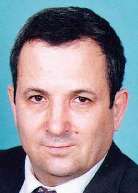
E. Barak |
Barak, Ehud, original name Ehud Brog (b. Feb. 12, 1942, Mishmar Hasharon kibbutz, central Palestine [now in Israel]), prime minister of Israel (1999-2001). He changed his name when he was drafted into the Israel Defense Forces in 1959. In a distinguished military career, he was a commander in battles in the Six-Day War (1967) and the Yom Kippur War (1973) but became known especially as the leader of special forces units that conducted commando raids. He served as head of military intelligence, and he became chief of General Staff in 1991. When he retired in 1995 as a lieutenant general, the highest rank, he was the most decorated soldier in the history of Israel's military. He joined the Labour Party in 1995 and under Labour governments he was interior minister in 1995 and foreign minister in 1995-96. In June 1997 he succeeded Shimon Peres as head of the Labour Party. In March 1999 he formed the One Israel bloc, an alliance of Labour with the Gesher Party of David Levy and Meimad, a moderate Orthodox Jewish movement. On May 17, 1999, he won a commanding victory in the prime ministerial elections, defeating the incumbent Benjamin Netanyahu. But he was unable to reach a peace deal with the Palestinians, and in the fall of 2000 a new wave of violence broke out in the West Bank and Gaza Strip. He called early elections, thereby heading off a potential challenge from Netanyahu to succeed him. Instead, he faced a more militant opponent, Ariel Sharon, who analysts believed would be an easier opponent for Barak. But the incumbent fell far behind his opponent in the polls, and in February 2001 lost by an unprecedented margin. He declined an offer to be defense minister in Sharon's government, resigned as party leader, and also quit as member of parliament. In 2007 he was reelected to the party leadership and became defense minister. In 2011 he broke away from the Labour Party to form a new faction called Independence. This party did not win seats in the 2013 elections and he left politics for the time being.
Barák, Rudolf (b. May 11, 1915, Blansko, Austria [now in Czech Republic] - d. Aug. 12, 1995, Prague, Czech Republic), a deputy premier (1953, 1959-62) and interior minister (1953-61) of Czechoslovakia.
Baraka, Nizar (b. Feb. 6, 1964, Rabat, Morocco), economy and finance minister of Morocco (2012-13); grandson of Allal El Fassi. He has also been president of the Economic, Social, and Environmental Council (2013-18), secretary-general of the Istiqlal party (2017- ), and minister of equipment and water (2021- ).
Barakat, Abdullah Hussein (b. Jan. 26, 1936, Sana, Yemen), interior minister of Yemen (Sana) (1967-68, 1971, 1985-90). He was also minister of agriculture (1965-67) and youth and social affairs (1973-75), ambassador to Sudan (1968-71), Algeria and Tunisia (1971-73), Italy, Greece, and Yugoslavia (1980-82), Syria and Cyprus (1982-85), and the United Arab Emirates (1995-97) and deputy prime minister for internal affairs (1975-76).
Barakat, Ahmad Qaid (b. 1934, Sana, Yemen), foreign minister of Yemen (Sana) (1969-70). He was also minister of information and culture (1971-72), oil and mineral resources (1978-80), and economy and industry (1983-86) and ambassador to West Germany, Belgium, the Netherlands, Switzerland, and Austria (1972-77) and Japan (1981-83).
Barakauskas, Dailis (Alfonsas) (b. June 29, 1952, Geruciai, Pakruojis rayon, Lithuanian S.S.R.), interior minister of Lithuania (2012-14). He was also minister of transport (2001).
Barakhov, Isidor (Nikiforovich), original surname Ivanov (b. Jan. 31 [Jan. 19, O.S.], 1898, Kharbalakhsky nasleg [village], Yakutsk oblast [now in Sakha republic], Russia - d. [executed] Sept. 15, 1938), chairman of the Council of People's Commissars (1923-24) and executive secretary of the Communist Party committee (1926-28) of the Yakut A.S.S.R.
Baram, Uzi (b. April 6, 1937, Jerusalem, Palestine), interior minister of Israel (1995). He was also tourism minister (1992-96).
Baramia, Giorgi (b. Feb. 25, 1966, Sukhumi, Abkhaz A.S.S.R., Georgian S.S.R.), prime minister of the pro-Georgian government of Abkhazia (2009-13).
Baramia, Mikhail (Ivanovich) (b. 1905, Lesichine, Kutaisi province, Russia [now in Georgia] - d. ...), first secretary of the Communist Party committees of the Adzhar A.S.S.R. (1938-40) and the Abkhaz A.S.S.R. (1940-43). He was also minister of agriculture and food reserves of the Georgian S.S.R. (1953).
Baramidze, Giorgi (Aivengos dze) (b. Jan. 5, 1968, Tbilisi, Georgian S.S.R.), interior minister (2003-04) and defense minister (2004) of Georgia. He was also state minister for Euro-Atlantic integration (2004-12).
Baramuli, (Ahmad) Arnold (b. July 20, 1930, Pinrang, Netherlands East Indies [now in Sulawesi Selatan, Indonesia] - d. Oct. 11, 2006, Jakarta, Indonesia), governor of Sulawesi Utara (1961-62).
Baranda (Quijano), Joaquín (b. May 7, 1840, Mérida, Mexico - d. May 21, 1909, Mexico City, Mexico), acting foreign minister of Mexico (1885). He was also governor of Campeche (1871-77, 1883) and minister of justice and education (1882-1901).
Baranda García, Alfredo (b. 1944, Mexico City, Mexico), interim governor of México (1986-87). He was also Mexican ambassador to Spain (1987-89) and federal prosecutor for the consumer (1991-94).
Bárándy, Péter (b. June 12, 1949, Budapest, Hungary), justice minister of Hungary (2002-04).
Barannikov, Viktor (Pavlovich) (b. Oct. 20, 1940, Fedosyevka, Primorsky kray, Russian S.F.S.R. - d. July 21, 1995, Moscow, Russia), interior minister of Russia (1990-91, 1991-92) and the Soviet Union (1991). He was also security minister of Russia (1992-93).
Baranov, Aleksandr (Ivanovich) (b. Sept. 3 [Aug. 22, O.S.], 1821 - d. July 30 [July 18, O.S.], 1888), governor of Moscow (1867-68); grandson of Nikolay Baranov; nephew of Aleksandr (Nikolayevich) Baranov.
Baranov, Aleksandr (Nikolayevich) (b. May 4 [April 23, O.S.], 1793 - d. May 7 [April 25, O.S.], 1821), governor of Tavrida (1820-21); son of Nikolay Baranov.
Baranov, Graf Eduard (Trofimovich) (b. Dec. 28 [Dec. 16, O.S.], 1811, St. Petersburg, Russia - d. Aug. 3, 1884, Schönau, Baden [now in Baden-Württemberg], Germany), governor-general of Livonia, Estonia, and Courland (1866) and Vilna, Kovno, Grodno, and Minsk (1866-68); nephew of Graf Vladimir Adlerberg. He was made Graf (count) in 1846.
Baranov, Nikolay (Ivanovich) (b. Feb. 7 [Jan. 27, O.S.], 1757 - d. Sept. 9 [Aug. 28, O.S.], 1824), governor of Moscow (1804-06).
Baranov, Nikolay (Mikhailovich) (b. Aug. 6 [July 25, O.S.], 1837 - d. July 30, 1901), governor of Kovno (1880-81), Arkhangelsk (1881-82), and Nizhny Novgorod (1882-97). He was also gradonachalnik (city governor) of St. Petersburg (1881).
Baranov, Graf Pavel (Trofimovich) (b. Jan. 11, 1815 [Dec. 30, 1814, O.S.] - d. April 27 [April 15, O.S.], 1864), governor of Tver (1857-62); brother of Graf Eduard Baranov.
Baraona Urzúa, Pablo (Antonio) (b. June 22, 1935, Santiago, Chile - d. Sept. 28, 2017), Chilean politician. He was president of the Central Bank (1975-76) and minister of economy, development, and reconstruction (1976-78), mining (1988-89), and economy (1989).
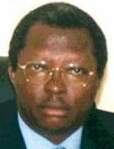
Bararunyeretse |
Bararunyeretse, Libère (b. Feb. 9, 1954, Mugende, Gitaramuka commune, Karusi province, Burundi), interior minister (1991-92), foreign minister (1992-93), and president of the transitional Senate (2002-05) of Burundi. He was also ambassador to Belgium (1987).
Barata, Joaquim de Magalhães Cardoso (b. June 2, 1888, Belém, Pará, Brazil - d. May 29, 1959, Belém), federal interventor (1930-35, 1943-45) and governor (1956-59) of Pará.
Barate, Maurice (b. May 23, 1961, Marseille, France), acting prefect of Réunion (2017). He was appointed prefect of Cher département in 2022.

Baratieri |
Baratieri, Oreste (b. Nov. 13, 1841, Condino, Lombardy, Austrian Empire [now in Italy] - d. Aug. 7, 1901, Sterzing, Tirol, Austria-Hungary [now Vipiteno, Italy]), Italian colonial administrator. He fell into disgrace with the Austrian authorities at an early age because of his support of the cause of Italian unification. He went to Milan, where, in 1859, he joined Giuseppe Garibaldi's volunteers, serving under him in the Sicilian and south Italian campaigns of 1860. He commanded a regiment in Eritrea in 1887-91 and was named commander in chief of Italian troops in Africa in 1891. Although he came in conflict with the civilian authorities in Eritrea for his encouragement of private investment in the colony, his views prevailed when he was named governor in 1892. After opening Eritrea to private capital and extensive land settlement, Baratieri attempted, in 1895, to extend its borders into Ethiopia. Two defeats from the Ethiopians at the end of 1895 caused a demand for his recall, and Gen. Antonio Baldissera was sent out to replace him, the fact to be kept secret. Baratieri, however, heard of the intention, and endeavoured to win a great success before the arrival of Baldissera. However, he incurred an overwhelming disaster by the forces of the Ethiopian emperor, Menelik II, in the Battle of Adowa (Adwa) on March 1, 1896. It was the most severe defeat inflicted by what were termed "uncivilized" troops on a European power in the 19th century. This defeat led to the Italian recognition of full Ethiopian sovereignty and independence. Baratieri was recalled and later tried by court-martial, charged with having attacked the Abyssinians in a criminally rash manner. After a long trial he was acquitted. He was also a deputy of the Italian legislature in 1876-95.
Barau, Yves (Marie Armand) (b. April 30, 1928, Sainte-Marie, Réunion - d. Oct. 28, 2017, Sainte-Marie), president of the Regional Council of Réunion (1978-83).
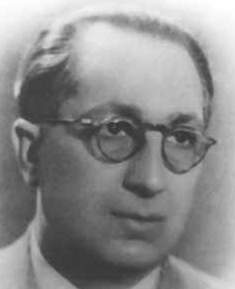
Barazi |
Barazi, Muhsin al- (b. 1904 - d. [executed] Aug. 14, 1949), foreign minister (1948, 1949) and prime minister (1949) of Syria. He was also education minister (1941).
Barba González, Silvano (b. Nov. 29, 1895, Valle de Guadalupe, Jalisco, Mexico - d. Dec. 14, 1967, Mexico City), interim governor (1926-27) and governor (1939-43) of Jalisco. He was also president of the National Revolutionary Party (1936-38).
Barbacena, Felisberto Caldeira Brant Pontes, visconde de (b. July 20, 1802, Salvador, Bahia, Brazil - d. May 28, 1906, Rio de Janeiro, Brazil), president of Rio de Janeiro (1848); son of Felisberto Caldeira Brant Pontes de Oliveira e Horta, visconde e marquês de Barbacena. He was made viscount in 1830.
Barbacena, Felisberto Caldeira Brant Pontes de Oliveira e Horta, visconde e marquês de (b. Sept. 19, 1772, Mariana, Minas Gerais, Brazil - d. June 13, 1842, Rio de Janeiro, Brazil), principal minister (1825) and finance minister (1825-26, 1829-30) of Brazil. He was made viscount in October 1825 and marquess in October 1826.
Barbachano y Tarrazo, Miguel (b. Sept. 29, 1807, Campeche, Yucatán [now in Campeche], Mexico - d. Dec. 17, 1859, Mérida, Yucatán), governor of Yucatán (1841, 1842-43, 1844, 1846-47, 1848-53).
Barbalho, Helder Zahluth (b. May 18, 1979, Belém, Pará, Brazil), governor of Pará (2019- ); son of Jáder Fontenelle Barbalho; brother of Jáder Fontenelle Barbalho Filho. He was also mayor of Ananindeua (2005-13) and Brazilian minister of agriculture and fisheries (2015) and national integration (2016-18) and minister-chief of the National Secretariat of Ports (2015-16).
Barbalho, Jáder Fontenelle (b. Oct. 27, 1944, Belém, Pará, Brazil), governor of Pará (1983-87, 1991-94). He was also Brazilian minister of agrarian reform (1987-88) and social security (1988-90) and president of the Federal Senate (2001).
Barbalho, Jáder Fontenelle, Filho (b. June 24, 1976, Belém, Pará, Brazil), Brazilian politician; son of Jáder Fontenelle Barbalho. He has been minister of cities (2023- ).
Barbalic, Ivan (b. Oct. 10, 1975), Bosnian diplomat. He has been permanent representative to the United Nations (2008-12) and ambassador to Russia (2013-15).
Barbaneagra, Alexei (Afanasie) (b. Dec. 3, 1945, Gandrabura, Odessa oblast, Ukrainian S.S.R.), justice minister of Moldova (1990-94). He was also secretary of the Supreme Security Council (2012-16).

Barbara |
Barbara, Agatha (b. March 11, 1923, Zabbar, Malta - d. Feb. 4, 2002, Zabbar), president of Malta (1982-87). She began her career as a school teacher with Malta's education department. She was elected to parliament in 1947 on the Labour Party ticket, becoming Malta's first woman lawmaker. She was returned to office in each subsequent general election until 1981. In 1955, she was named minister of education. One of her lasting contributions to Malta was her campaign to introduce full-time education for children, who up until then had only gone to school a few hours a day. The campaign required hundreds of teachers to be hired and trained. In 1958, after the Labour Party resigned from office, Barbara was sentenced to 43 days in prison after playing an active role in a national strike called by Labour to protest the British government's plan to reduce its presence in Malta. In independent Malta, she was minister of education and culture (1971-74), labour, employment, and welfare (1974-76), and welfare, labour, and culture (1976-81). In another first for a Maltese woman, she was nominated president of the republic in 1982.
Barbé-Marbois, François, marquis de (b. Jan. 31, 1745, Metz [now in Moselle département], France - d. Jan. 12, 1837, Paris, France), treasury minister of France (1801-06); son-in-law of William Moore. He was also chargé d'affaires in the United States (1784-89), president of the Council of Ancients (1797), first president of the Court of Accounts (1807-15, 1815-34), and justice minister (1815-16). He was made comte (count) in 1813 and marquis (marquess) in 1817.
Barber, Anthony (Perrinott Lysberg) Barber, Baron (b. July 4, 1920, Doncaster, Yorkshire, England - d. Dec. 16, 2005, Suffolk, England), British chancellor of the exchequer (1970-74). He was also minister of health (1963-64) and chancellor of the Duchy of Lancaster (1970). He was created a life peer in 1975.
Barber, Hilia (Garez Gomes Lima) (b. April 21, 1944, Bissau, Portuguese Guinea [now Guinea-Bissau]), foreign minister of Guinea-Bissau (1999). She was also ambassador to Israel (1996-99) and France and the Vatican (2011-21).
Barberena (Monterrey), Antonio, finance minister of Nicaragua (1929-32).
Barberena, Francisco, foreign minister (1871) and interior minister (1871-75) of Nicaragua.
Barberie de Saint-Contest, François Dominique (b. Jan. 26, 1701, Paris, France - d. July 24, 1754, Paris), foreign minister of France (1751-54). He was also ambassador to the Netherlands (1749-51).
Barberot, Roger (René Albert) (b. Jan. 20, 1915, Cherbourg [now part of Cherbourg-en-Cotentin], France - d. Nov. 14, 2002, Clichy, Hauts-de-Seine, France), administrator-superior of the French Southern and Antarctic Lands (1973-79). He was also French ambassador to the Central African Republic (1960-65) and Uruguay (1965-68).
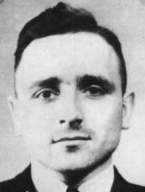
Barbie |
Barbie, Klaus, byname Butcher of Lyon, French Boucher de Lyon (b. Oct. 25, 1913, Godesberg [now Bad Godesberg, part of Bonn], Germany - d. Sept. 25, 1991, Lyon, France), German Nazi leader. He joined the Hitler Youth in 1931 and became an aide to a local Nazi chief; he joined the SD, a special branch of the SS, in 1935 and was assigned to Berlin. After German forces overran western Europe in World War II, he served in the Netherlands (1940), at the Russian front (1941-42), and then was made chief of Gestapo Department IV in Lyon. In this position he became especially active against French partisans, promoting the torture and execution of thousands of prisoners. Among the more specific charges against him were that he ordered the death of Resistance leader Jean Moulin (1943) and the deportation (April 1944) of 44 Jewish children (aged 3-13) and their five teachers, all of whom later were delivered to the Auschwitz extermination camp. In August 1944, as Lyon was about to be liberated, he sent his infamous "last convoy" of 650 prisoners to Auschwitz. He himself slipped back to Germany. After the war he was seized by U.S. authorities, who recruited him in 1947 for counterintelligence work and in March 1951, as the French began to close in on Barbie to bring him to trial for war crimes, spirited him out of Germany to Bolivia. He lived there as a businessman under the name Klaus Altmann from 1951 to 1983. He was tracked down in Bolivia in 1972 and after long negotiations, the Bolivian government extradited him to France in February 1983 to stand trial. In May 1987 Barbie, who remained unrepentant, went on trial in Lyon for 177 counts of "crimes against humanity." On July 4 he was convicted on all charges with no extenuating circumstances and sentenced to life imprisonment.
Barbier, Georges (Charles Paul) (b. Aug. 31, 1890, Paris, France - d. 1956), resident of Wallis and Futuna (1924-28).

Barbón |
Barbón Rodríguez, Adrián (b. Jan. 4, 1979, Laviana, Asturias, Spain), president of Asturias (2019- ).
Barbosa, António Manuel Pinto (b. July 31, 1917, Murtosa, Aveiro district, Portugal - d. March 5, 2006), finance minister of Portugal (1955-65). He was also governor of the Bank of Portugal (1966-74).
Barbosa, Demócrito (b. May 25, 1880, Rio de Janeiro, Brazil - d. April 4, 1961, Rio de Janeiro), federal interventor in Rio de Janeiro (1930).
Barbosa, Henrique Domingos Ribeiro (b. Aug. 22, 1912, São Luís, Maranhão, Brazil - d. Nov. 27?, 1989), acting finance minister of Brazil (1962).
Barbosa, Ignacio Joaquim (b. Oct. 1, 1821, Rio de Janeiro, Brazil - d. Oct. 6, 1855, Estância, Sergipe, Brazil), president of Sergipe (1853-55).
Barbosa, João Tamagnini de Sousa (b. Dec. 30, 1883, Macau - d. Dec. 15, 1948, Lisbon, Portugal), prime minister of Portugal (1918-19). He was also minister of colonies (1917-18), interior (1918, 1918-19), and finance (1918).
Barbosa, José Maria (b. Sept. 19, 1924, Coroatá, Maranhão, Brazil), governor of Rio Branco (1955-59); son-in-law of Félix Valois de Araújo.
Barbosa, Luis Proto (b. Jan. 11, 1927 - d. Oct. 6, 2011, Margao, Goa, India), chief minister of Goa (1990).
Barbosa, Luiz Eugenio Horta (b. Oct. 15, 1842, Serro, Minas Gerais, Brazil - d. April 14, 1927, Juiz de Fora, Minas Gerais), president of Espírito Santo (1873-74), Piauí (1876-77), and Minas Gerais (1887-88).
Barbosa, Manoel Teixeira (b. 17... - d. June 29, 1839, Natal), acting president of Rio Grande do Norte (1824, 1825, 1838).
Barbosa, Mário de Medeiros, acting governor of Amapá (1961).
Barbosa, Nelson (Henrique, Filho) (b. Nov. 17, 1969, Rio de Janeiro, Brazil), finance minister of Brazil (2015-16). He was also minister of planning, budget, and management (2015).
Barbosa (Carneiro), Raul (b. Aug. 19, 1911, Fortaleza, Ceará, Brazil - d. Aug. 16, 1975, Washington, D.C.), governor of Ceará (1951-54).
Barbosa, Raymundo Rodrigues (b. Oct. 18, 1875, Belém, Pará, Brazil - d. April 7, 1968, Rio de Janeiro, Brazil), governor of Amazonas (1924) and federal interventor in Bahia (1931).
Barbosa, Silval da Cunha (b. April 26, 1961, Borrazópolis, Paraná, Brazil), governor of Mato Grosso (2010-15).
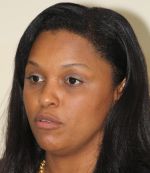
S. Barbosa |
Barbosa, Suzi (Carla) (b. July 5, 1973, Bafatá, Portuguese Guinea [now Guinea-Bissau]), foreign minister of Guinea-Bissau (2019-20, 2020- ).
Barbosa, Theobaldo Vasconcelos (b. March 31, 1929, São José da Laje, Alagoas, Brazil - d. March 22, 1999, Maceió, Alagoas), governor of Alagoas (1982-83).
Barbosa de Magalhães, José Maria de Vilhena (b. Oct. 31, 1879, Aveiro, Aveiro district, Portugal - d. April 5, 1959), foreign minister of Portugal (1922). He was also justice minister (1914-15) and education minister (1917).
Barbosa Huerta, (Luis) Miguel (Gerónimo) (b. Sept. 30, 1959, Zinacatepec, Puebla, Mexico - d. Dec. 13, 2022), governor of Puebla (2019-22). He was also president of the Senate of Mexico (2014-15).
Barbot, Ivan (b. Jan. 5, 1937, Ploeuc-sur-Lié, Côtes-du-Nord [now Côtes-d'Armor], France), president of the International Criminal Police Organization (1988-92).

H. Barbour |
Barbour, Haley (Reeves) (b. Oct. 22, 1947, Yazoo City, Miss.), chairman of the Republican National Committee (1993-97) and governor of Mississippi (2004-12).
Barbour, James (b. June 10, 1775, near Gordonsville, Virginia - d. June 7, 1842, Barboursville, Va.), governor of Virginia (1812-14) and U.S. secretary of war (1825-28). He was also minister to the United Kingdom (1828-29).
Barboza, Luiz Antonio (b. June 15, 1815, Sabará, Minas Gerais, Brazil - d. March 15, 1860, Petrópolis, Rio de Janeiro, Brazil), president of Minas Gerais (1852-53) and Rio de Janeiro (1853-57) and justice minister of Brazil (1853).
Barboza, Mário Gibson (Alves) (b. March 13, 1918, Olinda, Pernambuco, Brazil - d. Nov. 26, 2007, Rio de Janeiro, Brazil), foreign minister of Brazil (1969-74). He was also ambassador to Austria (1962-66), Paraguay (1966-67), the United States (1969), Greece (1974-77), Italy (1977-82), and the United Kingdom (1982-86).
Barca, Antonio de Araujo e Azevedo, conde da (b. May 14, 1754, Ponte de Lima, Portugal - d. June 21, 1817, Rio de Janeiro, Brazil), principal minister of Brazil (1817). He was also minister of navy and finance (1814-17) and foreign affairs and war (1816-17) and Portuguese minister to the Netherlands (1790-1802), France (1796-98), and Russia (1802-04). He was made count in 1815.
Barcák, Andrej (b. Jan. 19, 1920, Mlynky, Czechoslovakia [now in Slovakia] - d. July 23, 1984, Prague, Czechoslovakia [now in Czech Republic]), Czechoslovak politician. He was minister of foreign trade (1970-81) and ambassador to Hungary (1981-83).
Barcák, Andrej, mladsí (Jr.) (b. Oct. 26, 1946, Baia Mare, Romania), Czechoslovak politician; son of Andrej Barcák. He was minister of foreign trade (1989-90).
Barcellos, Alfredo Augusto Vieira (b. Sept. 19, 1853, Rio de Janeiro, Brazil - d. July 3, 1930, Rio de Janeiro), acting prefect of Distrito Federal (1892).
Barcellos, Anníbal (b. July 10, 1918, Campos, Rio de Janeiro, Brazil - d. Aug. 14, 2011, Macapá, Amapá, Brazil), governor of Amapá (1979-85, 1991-95). He was also mayor of Macapá (1997-2001).
Barcellos, Antônio Carlos (b. June 17, 1908, Campos, Rio de Janeiro, Brazil - d. May 24, 1987, Rio de Janeiro, Brazil), acting finance minister of Brazil (1960).
Barcellos, Israel Rodrigues (b. Sept. 11, 1817, Pelotas, Rio Grande do Sul, Brazil - d. Oct. 6, 1890, Porto Alegre, Rio Grande do Sul), acting president of Rio Grande do Sul (1868, 1869).
Barcellos, José Bento Vieira (d. Nov. 12, 1884), president of Alagoas (1884).
Barcellos, Petrônio (b. Sept. 2, 1904 - d. Oct. 7, 1977, Rio de Janeiro, Brazil), governor of Guaporé (1951-52).
Barcellos, Walter Peracchi (b. May 14, 1907, Porto Alegre, Rio Grande do Sul, Brazil - d. Aug. 13, 1986, Porto Alegre), governor of Rio Grande do Sul (1966-71). He was also Brazilian minister of labour and social security (1965-66).
Barceló Rodríguez, Víctor Manuel (b. June 14, 1936, Emiliano Zapata, Tabasco, Mexico), acting governor of Tabasco (1999). He has also been Mexican ambassador to Colombia (1963-64, 1971-73) and Uruguay (2019- ).
Barchuk, Vasily (Vasilyevich) (b. March 11, 1941, Komsomolsk-na-Amure, Khabarovsk kray, Russian S.F.S.R.), finance minister of Russia (1992-93). He was also chairman of the Pension Fund of the Russian Federation (1993-99).
Barcia Trelles, Augusto (b. March 5, 1881, Vegadeo, Oviedo province, Spain - d. June 19, 1961, Buenos Aires, Argentina), foreign minister (1936, 1936), interim prime minister (1936), and interior minister (1936) of Spain.
Barcikowski, Kazimierz (b. March 22, 1927, Zglechów, Poland - d. July 10, 2007, Warsaw, Poland), a deputy premier of Poland (1980). He was also first secretary of the party committees of Poznan (1968-70) and Kraków (1977-80) województwa and agriculture minister (1974-77).
Barck, Nils greve (b. 1713 - d. Nov. 30, 1782, Stockholm, Sweden), Swedish diplomat. He was minister to Russia (1743-47) and Austria (1747-81).
Barck, Nils Anton Augustin greve (b. Aug. 27, 1760, Vienna, Austria - d. Sept. 29, 1822, Bergshamra [now part of Solna municipality], Stockholm county, Sweden), chancellery president of Sweden (1793-99); son of Nils greve Barck.
Barclay, Arthur (b. July 31, 1854, Bridgetown, Barbados - d. July 10, 1938, Monrovia, Liberia), acting secretary of state (1892) and president (1904-12) of Liberia; brother of Ernest J. Barclay. He was also treasury secretary (1896-1903).
Barclay, Sir David (Rowat) (b. Oct. 27, 1934, London, England - d. Jan. 10, 2021), tenant of Brechou (1993-2021). He was a billionaire businessman, along with his identical twin brother Frederick (Hugh); both were knighted in 2000.
Barclay, Edwin J(ames) (b. Jan. 5, 1882, Brewerville, Montserrado county, Liberia - d. Nov. 6, 1955), secretary of state (1920-30) and president (1930-44) of Liberia; son of Ernest J. Barclay; nephew of Arthur Barclay.
Barclay, Ernest J(ames) (d. April 1894), secretary of state of Liberia (1884-88, 1890-92).
Barclay de Tolly, Michael Andreas, Russian Knyaz Mikhail (Bogdanovich) Barklay de Tolli (b. Dec. 24 [Dec. 13, O.S.], 1761 [by other sources, 1757], Pamusis, Lithuania - d. May 25, 1818, Stilitzen manor, near Insterburg, Prussia [now Chernyakhovsk, Kaliningrad oblast, Russia]), governor-general of Finland (1809-10) and Russian minister of land forces (1810-12). He was created Knyaz (prince) in 1815.
Barclay-Harvey, Sir (Charles) Malcolm (b. March 2, 1890, London, England - d. Nov. 17, 1969, London), governor of South Australia (1939-44); knighted 1936.
Barco (López), Alejandro (b. Aug. 27, 1893 - d. ...), war minister of Peru (1930-31).
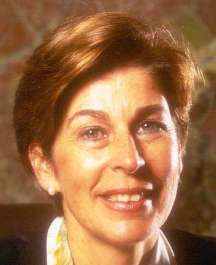
C. Barco |
Barco (Isakson), (María) Carolina (b. 1950, Boston, Mass.), foreign minister of Colombia (2002-06); daughter of Virgilio Barco Vargas. She was also ambassador to the United States (2006-10) and Spain (2019-21).
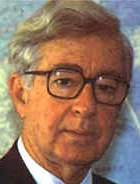
V. Barco |
Barco Vargas, Virgilio (b. Sept. 17, 1921, Cúcuta, Norte de Santander department, Colombia - d. May 20, 1997, Bogotá), president of Colombia (1986-90). His political career began in 1943 when he became a Liberal councillor in the town of Durania, and he later was elected to the lower house of Congress. During a volatile period in the late 1940s and early 1950s, known as La Violencia, in which the Liberal and Conservative factions waged a brutal war against one another and in which hundreds of thousands of people died, Barco was forced into exile in the U.S. He returned to Colombia in 1954 and helped arrange the interparty peace that laid the groundwork for a stable democracy. Over the next 40 years, he served two terms in the Senate (1958-66), was ambassador to Britain (1961-62, 1990-92) and the United States (1977), mayor of Bogotá (1966-69), and a director of the World Bank (1969-74). His career peaked in 1986, when he won the presidential election with more than 58% of the votes, one of the largest margins in the country's history. From the beginning, his administration was characterized by a sense of drift, arising largely from the low profile that he adopted and the introduction of single-party government, bringing to an end almost three decades of power sharing between the Liberals and Conservatives. His term began with a plan to attack absolute poverty, which he saw as the root cause of the violence pervading the country. Events forced him to resume the dialogue with the leftist guerrillas begun by his predecessor and to concentrate his fire against the drug mafia. His efforts escalated the violence of the "narcoterrorists," and while the international community lauded his actions, he was denounced in Colombia. He retired from political life in 1992.
Bárczy, István, original surname (to 1898) Sacher (b. Oct. 3, 1866, Pest [now part of Budapest], Hungary - d. June 1, 1943, Budapest), justice minister of Hungary (1919-20). He was also mayor (1906-18) and lord mayor (1918-19) of Budapest.
Bard, François (b. Dec. 1, 1889, Saint-Étienne, Loire, France - d. April 1, 1944, Bern, Switzerland), prefect of police of Paris (1941-42). He was also prefect of Haute-Vienne département (1940-41) and French ambassador to Switzerland (1942-44).
Bardají y Azara, Eusebio (b. Dec. 19, 1776, Graus [now in Huesca province], Spain - d. March 7, 1842, Huete, Cuenca province, Spain), first secretary of state (1810-12 [in Resistance], 1821-22), foreign minister (1837), and prime minister (1837) of Spain.
Barde, (Alhaji) Abubakar (b. 1938, Jalingo [now in Taraba state], Nigeria - d. June 17, 2002, Abuja, Nigeria), governor of Adamawa (1979-83).
Bardenfleth, Carl Emil (b. May 9, 1807, Copenhagen, Denmark - d. Sept. 3, 1857, Interlaken, Switzerland), governor of Iceland (1837-41) and justice minister of Denmark (1848-51). He was also amtmand of Odense (1843-48) and minister for Slesvig (1851-52).
Bardenfleth, Johan Frederik (b. June 10, 1835, Frederikssund, Denmark - d. Jan. 9, 1890, Nykøbing Falster, Denmark), Danish official; son of Carl Emil Bardenfleth. He was amtmand of Ringkøbing (1873-86) and Maribo (1886-90).
Bardenfleth, Vilhelm (b. July 18, 1850, Copenhagen, Denmark - d. Sept. 6, 1933, Frederiksberg, Denmark), interior minister of Denmark (1897-99); son of Carl Emil Bardenfleth. He was also amtmand of Århus (1894) and Vejle (1899-1921) and minister of church and education (1894-97).
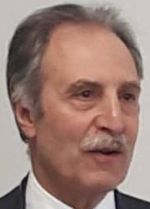
Bardi |
Bardi, Vito (b. Sept. 18, 1951, Potenza, Basilicata, Italy), president of Basilicata (2019- ).
Bárdossy, László (b. Dec. 10, 1890, Szombathely, Hungary - d. [executed] Jan. 10, 1946, Budapest, Hungary), foreign minister (1941-42) and prime minister (1941-42) of Hungary. He was also chargé d'affaires in the United Kingdom (1933) and minister to Romania (1934-41).
Bardoux, Agénor (b. Jan. 15, 1829, Bourges, Cher, France - d. Nov. 23, 1897, Paris, France), mayor of Clermont-Ferrand (1870-71) and French minister of public instruction, fine arts, and worship (1877-79).
Bareiro (Caballero), Cándido (Pastor) (b. Oct. 27, 1833, Luque, Paraguay - d. Sept. 4, 1880, Asunción, Paraguay), foreign minister (1874) and president (1878-80) of Paraguay. He was also chargé d'affaires in the United Kingdom and France (1864-67) and minister to the U.K. (1875-76).
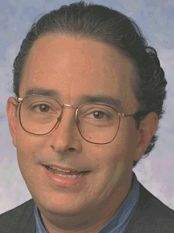
Bargalló |
Bargalló Valls, Josep (b. Oct. 3, 1958, Torredembarra, Tarragona province, Catalonia, Spain), chief councillor of Catalonia (2004-06).
Barge, Charles Augustinus Henry (b. Nov. 2, 1844, Amsterdam - d. Sept. 25, 1919, Voorburg, Zuid-Holland, Netherlands), governor of Curaçao (1890-1901).
Bargoni, Angelo (b. May 26, 1829, Cremona, Italy - d. June 25, 1901, Rome, Italy), treasury minister of Italy (1877-78). He was also minister of education (1869).
Bargues, Robert (Isaac) (b. Oct. 21, 1900, Bordeaux, Gironde, France - d. Jan. 29, 1989, Cannes, Alpes-Maritimes, France), high commissioner of Madagascar (1950-54).
Barinaga (Rato), Manuel Antonio (b. Jan. 17, 1831, Lima, Peru - d. June 13, 1897, Lima), prime minister of Peru (1883-84 [insurrectionary government of Miguel Iglesias], 1895-96). He was also minister of finance (1878) and justice, education, and worship (1883-84, 1895-96).
Baring, Sir Evelyn: see Cromer, Evelyn Baring, Earl of; and Howick of Glendale, Evelyn Baring, Baron.

Barinov |
Barinov, Aleksey (Viktorovich) (b. Dec. 30, 1951, Tashabar, Tadzhik S.S.R.), governor of Nenets autonomous okrug (2005-06). Arrested on May 23, 2006, in connection with a criminal case allegedly involving extortion and embezzlement, he was suspended on June 2 and sacked on July 21.
Bark, Sir Peter, originally Pyotr (Lvovich) Bark (b. April 18 [April 6, O.S.], 1869, Yekaterinoslav, Russia [now Dnipro, Ukraine] - d. Jan. 16, 1937, Aubagne, near Marseille, France), finance minister of Russia (1914-17). He later settled in England where he was knighted in 1935.
Barka, James (Shaibu) (b. 1961, Kala'a [now in Adamawa state], Nigeria), acting governor of Adamawa (2008).
Barkat, Reuven, original surname Burstein (b. Oct. 25, 1906, Taurage, Russia [now in Lithuania] - d. April 5, 1972), Israeli politician. He was ambassador to Norway (1960-61) and speaker of the Knesset (1969-72).
Barkauskas, Antanas (Stasevich) (b. Jan. 20 [Jan. 7, O.S.], 1917, Kaunas region, Russia [now in Lithuania] - d. Oct. 17, 2008, Vilnius, Lithuania), chairman of the Presidium of the Supreme Soviet of the Lithuanian S.S.R. (1975-85).
Barker-Manase, Deborah, Marshall Islands diplomat. She was chargé d'affaires at the United Nations (2014-16).
Barkindo, Mohammed S(anusi) (b. April 20, 1959, Yola [now in Adamawa state], Nigeria - d. July 5, 2022, Abuja, Nigeria), secretary-general of the Organization of Petroleum Exporting Countries (2006 [acting], 2016-22).
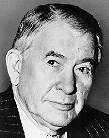
Barkley |
Barkley, Alben W(illiam) (b. Nov. 24, 1877, on a farm in Graves county, Ky. - d. April 30, 1956, Lexington, Va.), vice president of the United States (1949-53). An early participant in Democratic politics, he was elected in 1912 to the U.S. House of Representatives, serving seven successive terms (1913-27). In 1926 he was elected to the U.S. Senate, in which he served until 1949. Increasing senatorial seniority enhanced his influence on the committees on foreign affairs and finance. He was a leading spokesman for the domestic and international policies of the administration of Pres. Franklin D. Roosevelt. An able parliamentary tactician, he served from 1937 to 1947 as Senate majority leader, shepherding numerous wartime and emergency acts through the Senate. In 1947 he became minority leader, after the Republicans gained control. Barkley was keynote speaker at the 1936 Democratic National Convention, permanent chairman of the 1940 convention, and delivered the speech nominating Roosevelt for a fourth term at the 1944 convention. At the 1948 convention in Philadelphia Barkley was keynote speaker again and there was nominated for the vice presidency, though only after William O. Douglas declined the position; Barkley had been passed over for the vice presidency in 1944 because of his age. He was elected with Pres. Harry S. Truman and at age 71 was the oldest person to take office as U.S. vice president. He served steadfastly, if unspectacularly, for the next four years. He was the first vice president to be called the "Veep," a word coined by his young grandson. He sought the presidential nomination in 1952 but withdrew when informed that many considered him too old for that office. He was reelected to the Senate in 1954.
Barkly, Arthur Cecil Stuart (b. 1843 - d. Sept. 27, 1890, Stapleton Park, near Pontefract, Yorkshire, England), chief commissioner of the Seychelles (1882-88) and governor of Heligoland (1888-90); son of Sir Henry Barkly.
Barkly, Sir Henry (b. Feb. 24, 1815, Highbury, Middlesex [now part of London], England - d. Oct. 20, 1898, London), governor of British Guiana (1849-53), Jamaica (1853-56), Victoria (1856-63), Mauritius (1863-70), and Cape Colony (1870-77); knighted 1853.

Barkos |
Barkos (Berruezo), (Miren) Uxue (b. July 5, 1964, Pamplona, Spain), president of the government of Navarra (2015-19).
Bârladeanu, Alexandru, formerly spelled (1953-93) Bîrladeanu (b. Jan. 25, 1911, Comrat, Bessarabia, Russia [now in Moldova] - d. Nov. 13, 1997, Bucharest, Romania), Romanian politician. He was minister of external trade (1953-54), a deputy premier (1955-65, 1967-69), chairman of the State Planning Committee (1955-56), first deputy premier (1965-67), and president of the Senate (1990-92). He was a member of the Council of the National Salvation Front during the 1989 revolution.
Barley, Katarina (b. Nov. 19, 1968, Cologne, West Germany), justice minister of Germany (2018-19). She was also general secretary of the Social Democratic Party (2015-17) and minister of family, senior citizens, women, and youth (2017-18) and labour and social affairs (acting, 2017-18).
Barman, Bhumidhar (b. Aug. 12, 1931, Belsor, Assam, India - d. April 18, 2021, Guwahati, Assam), chief minister of Assam (1996).
Barnala, Surjit Singh (b. Oct. 21, 1925, Atali village, Mohindergarh district, Punjab [now in Haryana], India - d. Jan. 14, 2017, Chandigarh, India), chief minister of Punjab (1985-87), governor of Tamil Nadu (1990-91, 2004-11), Uttaranchal (2000-03), and Andhra Pradesh (2003-04), and administrator of Puducherry (2009). He was also Indian minister of agriculture and irrigation (1977-79) and chemicals and fertilizers and food and consumer affairs (1998-99).
Barnard, Sir Frank Stillman (b. May 16, 1856, Toronto, Canada West [now Ontario] - d. April 11, 1936, Victoria, B.C.), lieutenant governor of British Columbia (1914-19); knighted 1918.
Barnard, Harry, byname of George Henry Barnard (b. Oct. 9, 1868, Victoria, B.C. - d. Jan. 13, 1954), mayor of Victoria (1904-05); brother of Sir Frank Stillman Barnard.
Barnard, Henry (b. Jan. 24, 1811, Hartford, Conn. - d. July 5, 1900, Hartford), U.S. commissioner of education (1867-70).
Barnard, Lance (Herbert) (b. May 1, 1919, Launceston, Tas. - d. Aug. 6, 1997, Melbourne, Vic.), defence minister of Australia (1972-75). He was also minister of army, navy, air, and supply (1972-73), deputy prime minister (1972-74), and ambassador to Sweden, Norway, and Finland (1975-78).
Barnechea (García), (Isaac) Alfredo (b. May 19, 1952, Ica, Peru), Peruvian presidential candidate (2016).
Barnekow, Christian friherre (b. May 6, 1694 - d. Jan. 10, 1762, Vittskövle socken [now part of Kristianstad municipality], Kristianstad [now in Skåne], Sweden), governor of Kristianstad (1745-61). He was made friherre (baron) in 1751.
Barnes, Nathan (b. April 14, 1914, Liberia - d. July 16, 1975, New Rochelle, N.Y.), Liberian diplomat. He was minister (1956) and ambassador (1956-60) to Italy and permanent representative to the United Nations (1960-75).
Barnes, (Milton) Nathaniel (b. April 6, 1954, Monrovia, Liberia), finance minister of Liberia (1999-2002). He was also a minor presidential candidate (2005), permanent representative to the United Nations (2006-08), and ambassador to the United States (2008-10).

R. Barnes |
Barnes, Roy (Eugene) (b. March 11, 1948, Atlanta, Ga.), governor of Georgia (1999-2003). Elected to the state Senate in 1974, Barnes left in 1990 to challenge Zell Miller for the Democratic gubernatorial nomination. Out of politics for two years, he was elected to the state House in 1992. In 1998 Barnes, whose folksy manner and slow Southern drawl concealed an insider's knowledge of government, campaigned as the candidate best able to preserve the legacy of the popular, retiring Miller. And Miller bestowed his blessing. In beating Barnes eight years ago en route to his first term, Miller also gave Barnes an advanced degree in politics. "I learned," Barnes often said, "I went to 'Zell Miller University.'" Among other things, Barnes learned the lottery, which he opposed in 1990, had won wide acceptance with voters. A cornerstone of his campaign was protecting education programs funded by the lottery. Barnes defeated Republican Guy Millner, a businessman with no political experience, 53%-44%.
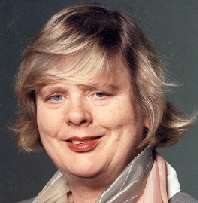
Barnes Jones |
Barnes Jones, Deborah (Elizabeth Vavasseur), née Barnes (b. Oct. 6, 1956), governor of Montserrat (2004-07). She was also British ambassador to Georgia (2001-04).
Barnés Salinas, Domingo (b. March 9, 1879, Sevilla, Spain - d. 1940, Mexico City, Mexico), Spanish politician. He was education minister (1933), justice minister (1933), and ambassador to Mexico (1934).
Barnett, Carla (Natalie) (b. Feb. 16, 1958, Belize, British Honduras [now Belize City, Belize]), secretary-general of the Caribbean Community (2021- ).

Colin Barnett |
Barnett, Colin (James) (b. July 15, 1950, Nedlands, W.Aus.), premier of Western Australia (2008-17). He was executive director of the W.A. Chamber of Commerce and Industry until 1990, when he was elected to the W.A. Legislative Assembly for Cottesloe. In the Liberal government of Richard Court from 1993 to 2001 he was minister for resources, development, and energy, and from 1995 also minister for education. After the Court government's defeat in 2001 he was elected leader of the Liberal Party but resigned after losing the 2005 election. He announced his retirement from politics in 2007, but was recalled to the Liberal leadership shortly before the 2008 election. Supported by the Nationals and independents, he was able to claim victory and replace the state's Labor government. He also won the 2013 election, during a mining boom, but in 2017 lost again to Labor, after it had busted and the economy was in a worse shape than any other state's.
Barnett, Frank (Elliott) (b. July 20, 1933, Atlanta, Ga. - d. July 15, 2016), governor of American Samoa (1976-77).
Barnett, Lloyd (Melville Harcourt) (b. Jan. 6, 1930, Kingston, Jamaica), Jamaican diplomat. He was ambassador to Cuba (1974-75) and Venezuela (1975-78) and permanent representative to the United Nations (1984-89).
Barnhart, Gordon (Leslie) (b. Jan. 22, 1945, Saltcoats, near Yorkton, Sask.), lieutenant governor of Saskatchewan (2006-12).
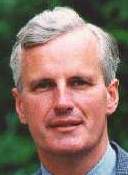
Barnier |
Barnier, Michel (b. Jan. 9, 1951, La Tronche, Isère, France), foreign minister of France (2004-05). He was also minister of environment (1993-95) and agriculture (2007-09) and EU commissioner for regional policy (1999-2004) and internal market and services (2010-14). In 2016 he was named the EU's chief Brexit negotiator.
Barnoyev, Uktam (Isayevich) (b. 1964 - d. Sept. 20?, 2020, Germany), a deputy prime minister of Uzbekistan (2020). He was also hokim (head) of Samarkand (2008-10) and Bukhara (2016-20) regions.
Baroche, Pierre Jules (b. Nov. 18, 1802, Paris, France - d. Oct. 29, 1870, Saint-Helier, Jersey), interior minister (1850-51), foreign minister (1851, 1860), minister presiding the Council of State (1852-63), and justice minister (1863-69) of France.
Barocio Barrios, Enrique (b. April 25, 1891, Mexico City, Mexico - d. Feb. 28, 1985, Tijuana, Mexico), governor of Quintana Roo (1924-25).
Baroin, François (b. June 21, 1965, Paris, France), economy, finance, and industry minister of France (2011-12). He has also been minister of overseas (2005-07), interior and regional planning (2007), reform of the state (2010-12), and civil service, budget, and public accounts (2010-11) and mayor of Troyes (1995- ).
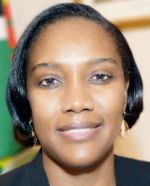
Francine Baron |
Baron(-Royer), Francine (b. Roseau, Dominica), foreign minister of Dominica (2014-19); daughter of Frank Baron. She was also attorney general (2007-10) and high commissioner to the United Kingdom (2012-14).
Baron, Frank(lin Andrew Merrifield) (b. Jan. 19, 1923, Portsmouth, Dominica - d. April 9, 2016, Roseau, Dominica), chief minister and finance minister of Dominica (1960-61). He was also minister of trade and production (1956-60), permanent representative to the United Nations (1982-95), non-resident ambassador to the United States (1982-86), and non-resident high commissioner to the United Kingdom (1986-92).
Barón Crespo, Enrique (b. March 27, 1944, Madrid, Spain), president of the European Parliament (1989-92). He was also Spanish minister of transport, tourism, and communications (1982-85).
Baroni, Danilo (Luis) (b. 1922, Santa Fe, Argentina - d. June 9, 2014), governor of Chaco (1987-91).
Baroody, Jamil M(urad) (b. Aug. 8, 1905, Souk el-Gharb, Ottoman Empire [now in Lebanon] - d. March 4, 1979, New York), Saudi diplomat. He was permanent representative to the United Nations (1962-79).
Baross de Bellus, Gábor (János Jusztin) (b. June 6, 1848, Pruzsina, Hungary [now Pruzina, Slovakia] - d. May 9, 1892, Budapest, Hungary), acting interior minister of Hungary (1889). He was also minister of public works and transport (1886-89) and trade (1889-92).
Baroud, Ammo Aziza (b. Aug. 4, 1965), Chadian politician. She was minister of public health and national solidarity (2003-05) and economy, development planning, and international cooperation (2008-10), adviser to the president (2005-08), ambassador to the Benelux countries (2017-20), and permanent representative to the United Nations (2020-22).
Baroudi (Pasha), Mahmoud Sami al-, Arabic Mahmud Sami al-Barudi Basha (b. 1838, Etai al-Baroud, al-Beheira governorate, Egypt - d. 1904), prime minister of Egypt (1882). He was also known as a poet.
Baroum, Jacques (Bab Jeggilu) (b. July 13, 1932, Lai, Chad), foreign minister of Chad (1964-71). He was also minister of health and social affairs (1964, 1971-75) and finance (acting, 1973).
Barozai, Sardar Mohammad Khan (b. bf. 1924 - d. May 2, 2004, Sibi, Balochistan, Pakistan), chief minister of Balochistan (1976-77).
Barozzi, Constantin (b. Oct. 14, 1833, Bucharest, Walachia [now in Romania] - d. April 15, 1921, Bucharest), war minister of Romania (1888). He was also chief of the General Staff (1877, 1895-98).
Barqué, Barry Moussa, foreign minister (1995-96) and finance minister (1996-99) of Togo. He was also minister of public works, mines, energy, and water resources (1979-85), equipment, mines, posts, and telecommunications (1985-87), and planning and mines (1987-91).
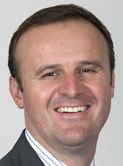
A. Barr |
Barr, Andrew (b. 1973, Lismore, N.S.W.), chief minister of the Australian Capital Territory (2014- ). He is the first openly gay head of government in Australia.
Barr, Bob, byname of Robert Laurence Barr, Jr. (b. Nov. 5, 1948, Iowa City, Iowa), U.S. politician. He was a Republican representative from Georgia (1995-2003) and Libertarian presidential candidate (2008).
Barr, Joseph W(alker) (b. Jan. 17, 1918, Bicknell, Ind. - d. Feb. 23, 1996, Playa del Carmen, Quintana Roo, Mexico), U.S. treasury secretary (1968-69). He was also a U.S. representative from Indiana (1959-61).
Barr, Roseanne (Cherrie), formerly also known as Roseanne Arnold (b. Nov. 3, 1952, Salt Lake City, Utah), U.S. politician. Known as a comedian, she was presidential nominee of the Peace and Freedom Party (2012).
Barr, William P(elham) (b. May 23, 1950, New York City), U.S. attorney general (1991-93, 2019-20).
Barra (y Quijano), Francisco León de la (b. June 16, 1863, Querétaro, Querétaro, Mexico - d. Sept. 23, 1939, Biarritz, France), foreign minister (1911, 1913) and interim president (1911) of Mexico and governor of México (1913). He was also minister to Argentina, Brazil, Paraguay, and Uruguay (1902-04), the Netherlands and Belgium (1905-08), and France (1913-14) and ambassador to the United States (1909-11).
Barra (Ugarte), Felipe de la (b. Aug. 13, 1888, Chala, Arequipa, Peru - d. Nov. 18, 1978, Lima, Peru), justice minister (1936-37) and war minister (1939) of Peru.
Barra, Rodolfo (Carlos) (b. Dec. 19, 1947, Buenos Aires, Argentina), justice minister of Argentina (1994-96). He was also auditor-general (1999-2002).
Barra Grande, Francisco de Lima e Silva, barão de (b. June 8, 1785, Rio de Janeiro, Brazil - d. Dec. 2, 1853, Rio de Janeiro), military governor of Pernambuco (1824) and member of the Regency of Brazil (1831-35). He was made baron in 1841.
Barradas, Joaquim da Costa (b. Feb. 18, 1833, Maranhão province [now state], Brazil - d. Jan. 31, 1908, Rio de Janeiro, Brazil), president of Ceará (1886) and Pará (1886-87).
Barragán (Romero), Gil (b. July 6, 1924, Salcedo, Cotopaxi province, Ecuador - d. Oct. 6, 2018, Quito, Ecuador), interior minister of Ecuador (1997). He was also minister of social security and labour (1968-69).
Barragán, Miguel (Francisco) (b. March 6, 1789, Valle del Maíz, New Spain [now Ciudad del Maíz, San Luis Potosí, Mexico] - d. Feb. 29, 1836, Mexico City, Mexico), acting president of Mexico (1835-36).
Barragán Rodríguez, Juan (b. Aug. 30, 1890, Río Verde, San Luis Potosí, Mexico - d. Sept. 28, 1974, Mexico City, Mexico), governor of San Luis Potosí (1917-18); great-grandson of Miguel Barragán. He was also president of the Authentic Party of the Mexican Revolution (1964-74).
Barrantes Lingán, Alfonso (Augusto) (b. Nov. 30, 1927, San Miguel, Cajamarca, Peru - d. Dec. 2, 2000, Havana, Cuba), Peruvian politician. He was mayor of Lima (1984-86) and a presidential candidate (1985, 1990).
Barranzuela (Vite), Luis (Roberto) (b. Nov. 18, 1962, Miraflores, Lima province, Peru), interior minister of Peru (2021).
Barraú Peláez, Manuel (b. Feb. 24, 1909, Uyuni, Potosí department, Bolivia - d. June 8, 1972), foreign minister of Bolivia (1956-58). He was also ambassador to the United Kingdom (1954-56, 1959-63) and the United States (1958-59) and president of the central bank (1971-72).
Barre, Abdirahman Jama, Somali Cabdiraxmaan Jaamac Barre, Arabic `Abd ar-Rahman Jama` Barri (b. 1937, Luq, Somalia - d. Aug. 15, 2017, San Diego, Calif.), foreign minister (1977-87, 1989-90) and finance minister (1987-89) of Somalia; brother of Muhammad Siad Barre.
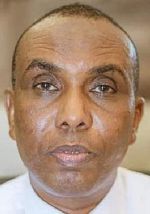
H.A. Barre |
Barre, Hamza Abdi (b. 1973?, Kismayo, Somalia), prime minister of Somalia (2022- ).
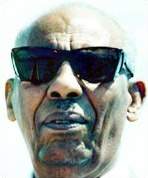
M.S. Barre |
Barre, Muhammad Siad, Somali Maxamed Siyaad Barre, Arabic Muhammad Siyyad Barri (b. 1919?, Ganane, Italian Somalia - d. Jan. 2, 1995, Lagos, Nigeria), president of Somalia (1969-91). He belonged to the small Marehan clan of the Darod clan group in the south. He joined the Somali police force after the British took control in 1941 and rose to the post of chief inspector. When Somalia was returned to Italian sovereignty in 1950, Barre was sent to the military academy in Italy. He transferred to the Somali national army when it was formed (1960), and by 1966 he held the rank of major general and had become commander in chief. After taking state power in a bloodless military coup against the elected government in October 1969, Barre made himself head of a Supreme Revolutionary Council and imposed autocratic rule through a personality cult and the harsh enforcement of an official ideology called "Scientific Socialism." He strengthened relations with the Soviet Union, officially outlawed clan loyalties (while using clan elders to establish order in rural areas), and promoted literacy with a newly introduced Roman alphabet. He later renounced his ties with the Soviets and sought U.S. aid, but allegations of human rights abuses hurt his international standing. He was OAU chairman in 1974-75. By 1990 fighting among clans and between clan militias and the government forced Barre to promise reforms, including free elections. He was forced out of office in January 1991 and in 1992 went into exile in Nigeria.
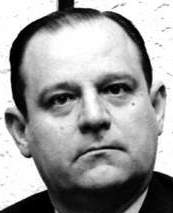
R. Barre |
Barre, Raymond (Octave Joseph) (b. April 12, 1924, Saint-Denis, Réunion - d. Aug. 25, 2007, Paris, France), prime minister of France (1976-81). He was also European commissioner for economic and financial affairs and a vice president of the European Commission (1967-73), minister of external commerce (1976) and economy and finance (1976-78), and mayor of Lyon (1995-2001).

Barreda |
Barreda Fontes, José María (b. Feb. 4, 1953, Ciudad Real, Castilla-La Mancha, Spain), president of the Junta of Castilla-La Mancha (2004-11).
Barreh, Ahmed Boulaleh (b. 1929, Ali Sabieh, French Somaliland [now Djibouti]), minister of interior, posts, and telecommunications (1991-93) and defense (1993-96) of Djibouti.
Barreiro (Riofrío), Magdalena (b. March 19, 1956), economy and finance minister of Ecuador (2005).
Barreiro Fajardo, Georgina (b. Jan. 7, 1964), finance minister of Cuba (2003-09).
Barreiro Maffiodo, Francisco (María) (b. May 3, 1924, Asunción, Paraguay), Paraguayan diplomat. He was ambassador to Colombia (1966-72) and permanent representative to the United Nations (1972-78).
Barrenechea (y Morales), José Antonio (Fidel) (b. April 24, 1829, Lima, Peru - d. Feb. 20, 1889, Lima), foreign minister of Peru (1867 [acting], 1867-68 [acting], 1868-69). He was also chargé d'affaires in France (1859-60).
Barrera de Irimo, Antonio (b. Jan. 4, 1929, Ribadeo, Lugo province, Spain - d. Sept. 24, 2014, Madrid, Spain), finance minister of Spain (1973-74).
Barrera Parra, Manuel (b. April 27, 1908, Bucaramanga, Santander, Colombia - d. 1958, Bogotá, Colombia), interior minister of Colombia (1946). He was also minister of mines and petroleum (1945) and ambassador to Chile (1947-48) and Venezuela (1948-50).
Barrera Valverde, Alfonso (b. March 29, 1929, Ambato, Ecuador - d. Sept. 6, 2013), foreign minister of Ecuador (1980-81). He was ambassador to Argentina (1970-75) and Spain (1976-80).
Barreto (León), Anselmo (V.) (b. Oct. 17, 1865, Lima, Peru - d. Dec. 24, 1950, Lima), acting foreign minister of Peru (1901). He was also minister of justice, education, and worship (1901), president of the Supreme Court (1918-19), and minister to Spain (1920-22).
Barreto, Antônio Adolfo da Fontoura Mena (b. Feb. 21, 1846, Porto Alegre, Brazil - d. June 4, 1914, Rio de Janeiro, Brazil), war minister of Brazil (1911-12).
Barreto, Emygdio Dantas (b. March 23, 1850, Bom Conselho, Pernambuco, Brazil - d. March 8, 1931, Rio de Janeiro, Brazil), war minister of Brazil (1910-11) and governor of Pernambuco (1911-15).
Barreto, Fausto Carlos (b. Dec. 19, 1852, São João dos Inhamuns [now Tauá], Ceará, Brazil - d. Aug. 27, 1915, Rio de Janeiro, Brazil), president of Rio Grande do Norte (1889).
Barreto, Francisco de Gouveia Cunha (b. 1848?, Goiana, Pernambuco, Brazil - d. July 22, 1928, Belém, Pará, Brazil), president of Rio Grande do Norte (1882) and Sergipe (1883-84).
Barreto, Francisco Xavier Paes (b. Sept. 17, 1821, Cimbres [now part of Pesqueira], Pernambuco, Brazil - d. March 28, 1864, Rio de Janeiro, Brazil), foreign minister of Brazil (1864). He was also president of Paraíba (1854-55), Ceará (1855-57), Maranhão (1857-58), and Bahia (1858-59) and navy minister (1859-61).
Barreto, Honório (Pereira) (b. April 24, 1813, Cacheu [now in Guinea-Bissau] - d. April 26, 1859, Bissau [now in Guinea-Bissau]), captain-major of Bissau (1836-39, 1840-41, 1855-58, 1858-59) and Cacheu (1846-47, 1852).
Barreto, João Carlos de Melo (b. July 3, 1873, Lisbon, Portugal - d. Jan. 26, 1935, Madrid, Spain), foreign minister of Portugal (1919-20, 1920, 1921). He was also minister (1922-26) and ambassador (1926-35) to Spain.
Barreto, João de Deus Menna (b. June 30, 1874, Porto Alegre, Brazil - d. March 25, 1933, Rio de Janeiro, Brazil), federal interventor in Rio de Janeiro (1931).
Barreto, João Paulo dos Santos (b. April 28, 1788, Rio de Janeiro, Brazil - d. Nov. 1, 1864, Rio de Janeiro), war minister of Brazil (1835, 1846-47, 1848) and president of Minas Gerais (1844). He was also navy minister (1835, 1847).
Barreto, Joaquim Tavares de Mello (b. June 24, 1840, Goiana, Pernambuco, Brazil - d. June 10, 1917, Rio de Janeiro, Brazil), president of Alagoas (1882-83).
Barreto, Luiz Caetano Muniz (b. 18... - d. May 1924), president of Sergipe (1884-85).
Barreto, Luiz Paulo (Teles Ferreira) (b. Jan. 19, 1964, Rio de Janeiro, Brazil), justice minister of Brazil (2010-11).
Barreto, Otávio Hamilton Tavares (b. March 12, 1871, Pernambuco province [now state], Brazil - d. Oct. 10, 1941, Recife, Pernambuco), acting governor of Pernambuco (1920-21).
Barreto, Plínio (b. June 20, 1882, Campinas, São Paulo, Brazil - d. June 28, 1958, São Paulo, Brazil), head of the provisional government of São Paulo (1930).
Barreto Sira, Antonio (María) (b. Nov. 14, 1955, Cantaura, Pedro María Freites municipality, Anzoátegui, Venezuela), governor of Anzoátegui (2017-21).

D. Barrett |
Barrett, David, byname Dave Barrett (b. Oct. 2, 1930, East Vancouver, B.C. - d. Feb. 2, 2018), premier of British Columbia (1972-75). Fired from his job at a B.C. prison for being "too political," Barrett joined the leftist Cooperative Commonwealth Federation (later renamed New Democratic Party) and won a seat in the provincial legislature from the Dewdney riding in 1960. Following the resignation of NDP leader Robert Strachan (1969), Barrett ran for the NDP leadership, and narrowly lost to fellow MLA Tom Berger. Later that year, however, Berger lost his own seat in an election. Barrett became interim party leader and was confirmed as leader at the annual NDP convention in 1970. In the 1972 election, he ran a fresh, energetic campaign, contrasting greatly with the negative mudslinging of the Social Credit Party. He was easily elected premier, thus ending 20 years of Socred rule in the province. Determined to be an activist premier while he had the chance, he introduced a spate of legislation, including an increase to the minimum wage, new labour laws, a freeze on development of agricultural land, the creation of B.C. Petroleum and the Insurance Corporation of B.C., and a controversial royalty on mineral production. In 1975 he broke with NDP tradition by imposing back-to-work legislation to end labour strife. Many observers believed Barrett to have tried to do too much in too short a time. He was defeated by a revitalized Social Credit Party in the December 1975 election. He lost his own seat but won a by-election in June 1976 and took the role of opposition leader against Premier Bill Bennett until 1984. He ran successfully for the federal NDP in Esquimalt in 1988. In 1989 he ran for the national party leadership, narrowly losing to Audrey McLaughlin. When he lost his seat in 1993 he retired from politics.
Barrett, Sean, Irish Seán Ó Bairéad (b. Aug. 9, 1944, Dublin, Ireland), defence and marine minister of Ireland (1995-97). He was also chairman of the Dáil (2011-16).
Barrett, Sylvester, Irish Salbhastar Bairéad (b. May 18, 1926, Darragh, near Ennis, County Clare, Ireland - d. May 8, 2002), defence minister of Ireland (1980-81). He was also minister of environment (1977-80).
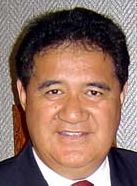
T. Barrett |
Barrett, Tia, byname of Te Rongotoa Barrett (b. July 24, 1947, Wellington, New Zealand - d. Nov. 15, 2009, Auckland, New Zealand), high commissioner of the Cook Islands (2009). He was also New Zealand's high commissioner to the Solomon Islands (1992-95) and Fiji (1998-2001).
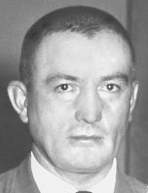
R. Barrientos |
Barrientos Ortuño, René (b. May 30, 1919, Tarata, near Cochabamba, Bolivia - d. April 27, 1969, near Arque village, Bolivia), president of Bolivia (1966-69). He was expelled from the military college in La Paz for revolutionary activities when he joined the National Revolutionary Movement (MNR) in 1937. He subsequently joined the Bolivian air force and moved rapidly through the ranks when the MNR took power in 1952, rising to air force chief of staff. In 1964, when Víctor Paz Estenssoro announced he was running for a third term, the military insisted that Barrientos be his running mate. Paz Estenssoro accepted on the condition that Barrientos leave the military. Accordingly he campaigned as a civilian, effectively addressing Indian peasants in their native tongue. He was duly elected vice president, under Paz Estenssoro. Later that year, however, he overthrew Paz Estenssoro and became chairman of a military junta, thus initiating another period of military rule and political instability. In 1965, Alfredo Ovando Candía joined him as co-chairman, and in 1966 Barrientos withdrew from the junta to seek the presidency as a civilian. He flew around the country in his helicopter to personally meet his constituents, and the peasants returned his attention with massive support; he won 62% of the vote in the elections. He continued the policy of land distribution to the peasants, but unflinchingly used military force to crush several strikes by miners; the noted guerrilla leader Che Guevara was captured and killed. It was at a rare period of political stability and economic growth that Barrientos was killed in a helicopter crash.
Barrientos Villalobos, Adrián (b. 1909 - d. July 21, 1990), defense minister of Chile (1957).
Barriga Álvarez, Felipe (d. 1868, Piura, Peru), finance minister of Peru (1864).
Barrillot, Georges (Jules Eugène) (b. April 14, 1892 - d. ...), administrator of Saint-Pierre and Miquelon (1933-36).
Barrington, Brook, acting administrator of Tokelau (2017). He was also New Zealand ambassador to Thailand (2006-09).
Barrington, James (b. Aug. 15, 1911, Moulmein, Burma [now Mawlamyine, Myanmar] - d. March 30, 1992, Edmonton, Alta.), Burmese diplomat. He was permanent representative to the United Nations (1950-55, 1962-65) and ambassador to the United States (1950-55) and Canada (1963-65).
Barrington, William Wildman Barrington, (2nd) Viscount (b. Jan. 15, 1717, Beckett, near Faringdon, Berkshire, England - d. Feb. 1, 1793, London, England), British secretary at war (1755-61, 1765-78) and chancellor of the exchequer (1761-62). He succeeded as viscount in 1734.
Barrio Terrazas, Francisco (Javier) (b. Nov. 25, 1950, Satevó, Chihuahua, Mexico), governor of Chihuahua (1992-98). He was also mayor of Ciudad Juárez (1983-86) and Mexican minister of the comptroller and administrative development (2000-03) and ambassador to Canada (2009-13).
Barrionuevo, Walter (Basilio) (b. Feb. 29, 1954, Santiago del Estero province, Argentina), governor of Jujuy (2007-11).
Barrionuevo Peña, José (b. March 13, 1942, Berja, Almería province, Spain), interior minister of Spain (1982-88). He was also minister of transport, tourism, and communications (1988-91).
Barrios (Ipenza), (Pío) Fernando (b. 1959?, Andahuaylas, Apurímac, Peru), interior minister of Peru (2010). He was also mayor of Huancayo (2003-06).
Barrios (Bustillos), Gonzalo (b. Jan. 10, 1902, Acarigua, Portuguesa state, Venezuela - d. May 30, 1993, Caracas, Venezuela), foreign minister (1947-48) and interior minister (1964-66) of Venezuela. He was also governor of the Federal District (1945-47) and a presidential candidate (1968).
Barrios (Auyón), Justo Rufino (b. July 19, 1835, San Lorenzo, Guatemala - d. April 2, 1885, Chalchuapa, El Salvador), president of Guatemala (1873-85). The son of Gerardo Barrios, who was executed by the Conservatives in El Salvador, he joined the Liberal revolutionists led by Miguel García Granados, who overthrew the Conservative Party government of Guatemala in 1871. Barrios then became army commander and the power behind President García Granados. After replacing the latter in 1873, Barrios carried out broad liberal reforms. He subjugated the local aristocracy; expelled the Jesuits and confiscated church property; established civil marriage and divorce; enlarged and laicized the school system; built highways and telegraph lines and the country's first railroad; encouraged the growing of coffee as the basis of the country's agriculture; broke up large landholdings; and promulgated a new constitution (1876). Barrios intervened repeatedly in the affairs of the other Central American republics in an effort to bring their Liberal forces to power and restore the five-nation federation that had collapsed in 1838-40. In 1876, at Barrios' suggestion, a conference of representatives of all the Central American states was held at Guatemala City to plan a political union. It was disrupted by rebellions in several of the states. Attempting to bring about unification by force, he was killed in battle while invading neighbouring El Salvador.
Barrios, Modesto, interior minister of Nicaragua (1889-91). He was also minister to Costa Rica (1885) and Guatemala (c. 1887).
Barrios Arrechea, Ricardo (Alfredo) (b. July 3, 1934, Posadas, Argentina), governor of Misiones (1983-87) and health minister of Argentina (1987-89).
Barrios de Chamorro, Violeta: see Chamorro, Violeta Barrios de.
Barrios Tassano, Luis (b. Aug. 26, 1935, San Carlos, Uruguay - d. Dec. 15, 1991), foreign minister of Uruguay (1988-90). He was also ambassador to Argentina (1985-88).
Barrios Tirado, (Manuel) Guillermo (b. April 2, 1893, Ovalle, Chile - d. Sept. 8, 1967, Santiago, Chile), defense minister of Chile (1947-52). He was also commander-in-chief of the army (1946-47).
Barrios Ugalde, Luis Aníbal (b. Aug. 10, 1875, Ovalle, Chile - d. April 4, 1962, Santiago, Chile), finance minister of Chile (1918).
Barron, Sir Harry (b. Aug. 11, 1847, Denmark Hill, Surrey, England - d. March 27, 1921), governor of Tasmania (1909-13) and Western Australia (1913-17); knighted 1909.
Barron, William W(allace) (b. Dec. 8, 1911, Elkins, W.Va. - d. Nov. 12, 2002, Charlotte, N.C.), governor of West Virginia (1961-65). He was elected attorney general of West Virginia in 1956 and was 49 when he was elected the state's 26th governor in 1960. He served at a time when the West Virginia constitution limited governors to a single four-year term. Barron pleaded guilty in 1971 to paying a $25,000 bribe to a federal jury foreman during his 1968 trial on corruption charges. Barron was acquitted of the charges, which stemmed from an investigation into his administration's bribes-for-contracts scheme. He also was indicted in 1970 on state charges involving activities on behalf of a law client after he left office. He was among 32 individuals and 11 companies indicted by a Kanawha County, W.Va., grand jury. West Virginia Supreme Court decisions later that year nullified the use of the state's bribery law in most of the cases. As a result, most of the state indictments, including the one against Barron, were dismissed. Barron served three years and four months of a 12-year sentence on the bribery conviction at the federal minimum-security prison at Eglin Air Force Base, Fla. Barron's public career also included serving as the mayor of Elkins, a two-term member of the House of Delegates, and chairman of the state Liquor Control Commission from 1953 to 1955.
Barros, Ademar Pereira de, old spelling Adhemar (b. April 22, 1901, Piracicaba, São Paulo, Brazil - d. March 12, 1969, Paris, France), governor of São Paulo (1938-41 [federal interventor], 1947-51, 1963-66). He was also mayor of São Paulo (1957-61) and a Brazilian presidential candidate (1955, 1960).
Barros, Antonio Moreira de (b. 1843, São Paulo, Brazil - d. 1899, São Paulo), foreign minister of Brazil (1879-80). He was also president of Alagoas (1867-68) and president of the Chamber of Deputies (1884, 1885).
Barros, Antonio Pedro Alves de (b. 1842?, Maranhão province [now state], Brazil - d. Sept. 16, 1922, Rio de Janeiro, Brazil), president of Mato Grosso (1899-1903).
Barros, Cássio Leite de (b. March 1, 1927, Corumbá, Mato Grosso [now in Mato Grosso do Sul], Brazil - d. March 21, 2004, Cuiabá, Brazil), governor of Mato Grosso (1978-79).
Barros, Eugênio (b. Nov. 13, 1898, Matões, Maranhão, Brazil - d. Oct. 15, 1988), governor of Maranhão (1951, 1951-56). He was also mayor of Caxias (1948-50).
Barros, Eziquio, Filho (b. Feb. 11, 1934, Caxias, Maranhão, Brazil - d. March 23, 2018), Brazilian politician; son of cousin of Eugênio Barros. He was mayor of Caxias (1997-2001).
Barros, Filipe Antônio Xavier de (b. Nov. 5, 1878, Taguatinga, Goiás, Brazil - d. 1961, Rio de Janeiro, Brazil), federal interventor in Goiás (1946).
Barros, Francisco Amynthas da Costa (b. Nov. 21, 1841, Aracati, Ceará, Brazil - d. Feb. 22, 1899, Natal, Rio Grande do Norte, Brazil), president of Rio Grande do Norte (1888 [acting], 1889 [acting], 1891); nephew of Pedro José da Costa Barros.
Barros, Francisco Antonio Pessoa de (b. 1833, Bahia province [now state], Brazil - d. March 13, 1896, Rio de Janeiro, Brazil), president of the Municipal Intendancy of Rio de Janeiro (1889-90).
Barros, Geraldo Bulhões (b. Feb. 19, 1938, Santana do Ipanema, Alagoas, Brazil - d. May 27, 2019, Maceió, Alagoas), governor of Alagoas (1991-95).
Barros, Hélder (D.S.) (b. 1952?), São Tomé and Príncipe politician. He was chargé d'affaires at the United Nations (1977-82), minister of economic coordination (1994), and a minor presidential candidate (2011, 2016).
Barros, Helvídio Nunes de (b. Sept. 28, 1925, Picos, Piauí, Brazil - d. Nov. 3, 2000, Picos), governor of Piauí (1966-70); cousin of Lucídio Portella Nunes and Tibério Barbosa Nunes.
Barros, Ibaneis Rocha, Júnior (b. July 10, 1971, Brasília, Brazil), governor of Distrito Federal (2019- ).
Barros, João Alberto Lins de (b. June 16, 1897, Recife, Pernambuco, Brazil - d. Jan. 26, 1955, Rio de Janeiro, Brazil), federal interventor in São Paulo (1930-31).
Barros, José Cesario de Miranda Monteiro de (b. Nov. 27, 1847, Chapéu d'Uvas [now part of Juiz de Fora], Minas Gerais, Brazil - d. May 3, 1906, Vitória, Espírito Santo, Brazil), president of Alagoas (1888-89).
Barros, José Ignacio Fernandes (b. April 25, 1844, São Gonçalo [now São Gonçalo do Amarante], Rio Grande do Norte, Brazil - d. Oct. 17, 1907, Ceará-Mirim, Rio Grande do Norte), acting president of Rio Grande do Norte (1891).
Barros, José Maurício Fernandes Pereira de (b. Sept. 22, 1824, Rio de Janeiro, Brazil - d. July 30, 1907, Rio de Janeiro), president of Espírito Santo (1856-57).
Barros, Luiz Correia de Queiroz (b. 1817, Vitória, Pernambuco, Brazil - d. Feb. 24, 1908, Rio de Janeiro, Brazil), acting president of Pernambuco (1885).
Barros, Manoel Gomes de (b. Dec. 8, 1944, União dos Palmares, Alagoas, Brazil), governor of Alagoas (1997-99).
Barros, Manoel Joaquim Fernandes de (b. March 17, 1802, Penedo, Alagoas, Brazil - d. [assassinated] Oct. 2, 1840, São Salvador da Bahia [now Salvador], Bahia, Brazil), acting president of Sergipe (1835-36).
Barros, Manoel Victor Fernandes de (b. 18..., Natal, Rio Grande do Norte, Brazil - d. Dec. 10, 1902, Rio de Janeiro, Brazil), president of Alagoas (1889).
Barros, Olegário Moreira de (b. March 6, 1890, Corumbá, Mato Grosso [now in Mato Grosso do Sul], Brazil - d. Jan. 6, 1969, Corumbá), federal interventor in Mato Grosso (1945-46).
Barrós (Mesinas), Óscar C(ésar) (b. June 9, 1875, Callao, Peru - d. July 22, 1963, Miraflores, Lima province, Peru), justice and education minister (1920-22) and war minister (1922) of Peru. He was also minister to Poland (1928-30) and president of the Supreme Court (1930).
Barros, Pedro Correia de (b. June 20, 1911, Loulé, Portugal - d. Feb. 2, 1968, Lisbon, Portugal), governor of Macau (1957-58) and governor-general of Mozambique (1958-61).
Barros, Pedro José da Costa (b. Oct. 7, 1779, Aracati, Ceará, Brazil - d. Oct. 20, 1839, Rio de Janeiro, Brazil), president of Ceará (1824, 1824-25) and Maranhão (1825-27). He was also Brazilian navy minister (1823).
Barros, Prudente José de Moraes (e) (b. Oct. 4, 1841, Itu, São Paulo, Brazil - d. Dec. 3, 1902, Piracicaba, São Paulo), president of Brazil (1894-98). He was also president of São Paulo (1889-90) and acting president of the Senate (1891-94).
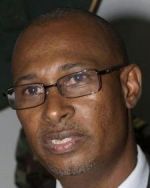
R.D. de Barros |
Barros, Rui Duarte de (b. Feb. 18, 1960, Cadique, Tombali region, Portuguese Guinea [now Guinea-Bissau]), finance minister (2001-02) and transitional prime minister (2012-14) of Guinea-Bissau.
Barros, Sebastião do Rego (b. Aug. 18, 1803, Pernambuco province [now state], Brazil - d. March 7, 1863, Recife, Brazil), war minister of Brazil (1837-39, 1859-61) and president of Pará (1853-55).
Barros, Sebastião do Rego (b. June 7, 1879, Escada, Pernambuco, Brazil - d. Oct. 21, 1946, Paris, France), Brazilian politician. He was president of the Chamber of Deputies (1927-30).
Barros (Ortiz), Tobías (b. Oct. 15, 1894, Santiago, Chile - d. Aug. 25, 1995, Santiago), foreign minister (1954) and defense minister (1954-55) of Chile. He was also ambassador to Germany (1940-43) and Italy (1952-53) and minister of education (1955-56).
Barros, Togo Póvoa de (b. April 24, 1914, Campos, Rio de Janeiro, Brazil - d. March 25, 2007, Campos), acting governor of Rio de Janeiro (1958-59).
Barros Borgoño, Luis (b. March 26, 1858, Santiago, Chile - d. July 26, 1943, Santiago), war and marine minister (1889-90, 1891, 1892, 1895-96), foreign minister (1894-95, 1918-19), finance minister (1901), interior minister (1925), and acting president (1925) of Chile. He was also ambassador to Argentina (1936-38).
Barros Castañón, Manuel (Francisco) (b. March 2, 1879, Illapel, Chile - d. May 1, 1966, Santiago, Chile), foreign minister of Chile (1929-31). He was also minister to Bolivia (1924-28) and ambassador to Mexico (1928-29) and Uruguay (1954-58).
Barros Errázuriz, Alfredo (b. May 11, 1875, Santiago, Chile - d. July 6, 1968, Santiago), finance minister (1914) and war and navy minister (1914) of Chile.
Barros Jara(quemada), Guillermo (b. Dec. 17, 1862, Santiago, Chile - d. 19...), finance minister (1902, 1904) and interior minister (1912-13, 1914, 1915) of Chile.
Barros Jarpa, Ernesto (b. July 7, 1894, Chillán, Chile - d. July 15, 1977, Santiago, Chile), foreign minister (1921-22, 1925-26, 1942), finance minister (1932), and interior minister (1932) of Chile; brother-in-law of Matías Silva Sepúlveda.
Barros Luco, Ramón (b. June 9, 1835, Santiago, Chile - d. Sept. 20, 1919, Santiago), president of Chile (1910-15). He was also minister of finance (1872-76, 1884-85), interior (1885, 1888-89, 1892-93, 1894-95, 1901, 1902, 1903), and industry and public works (1889), president of the Chamber of Deputies (1879, 1888, 1889-91, 1891-92, 1892) and the Senate (1896-97), and minister to France (1897-1900) and Switzerland and the Holy See (1898-1900).
Barros Melet, Cristián (b. Oct. 19, 1952, Santiago, Chile), Chilean diplomat. He was ambassador to Denmark (1993-96), the United Kingdom (2000-02), Peru (2006-08), Italy (2008-10), and India (2010-14) and permanent representative to the United Nations (2014-18).
Barros Méndez, Luis (b. 1861, Concepción, Chile - d. Jan. 7, 1906, Santiago, Chile), war and marine minister of Chile (1903-04).
Barros Valdés, Lauro (Rafael) (b. Aug. 18, 1838 - d. Jan. 28, 1894, Santiago, Chile), finance minister of Chile (1890).
Barroso, Benjamin Liberato (b. March 31, 1859, Quixeramobim, Ceará, Brazil - d. Oct. 17, 1933, Rio de Janeiro, Brazil), acting governor (1891) and president (1892 [acting], 1914-16) of Ceará.
Barroso, José Liberato (b. Sept. 21, 1830, Aracati, Ceará, Brazil - d. Oct. 2, 1885, Rio de Janeiro, Brazil), interior minister of Brazil (1864-65) and president of Pernambuco (1882).

J.M.D. Barroso |
Barroso, José Manuel Durão (b. March 23, 1956, Lisbon), foreign minister (1992-95) and prime minister (2002-04) of Portugal and president of the European Commission (2004-14). He was president of the Social Democratic Party in 1999-2004.
Barroso, José Parsifal (b. July 5, 1913, Fortaleza, Ceará, Brazil - d. April 21, 1986, Fortaleza), governor of Ceará (1959-63). He was also Brazilian minister of labour, industry, and commerce (1956-58) and agriculture (acting, 1956).
Barroso, Liberato da Cruz (b. Oct. 25, 1892 - d. July 5, 1957), acting federal interventor in Rio Grande do Norte (1935).
Barroso, Sabino Alves, Júnior (b. April 27, 1859, Serro, Minas Gerais, Brazil - d. June 15, 1919, Belo Horizonte, Minas Gerais), justice and interior minister (1901-02) and finance minister (1902, 1914-15) of Brazil. He was also president of the Chamber of Deputies (1909-14, 1917-19).
Barroso y Sánchez-Guerra, Antonio (b. July 31, 1893, Marín, Pontevedra province, Spain - d. Aug. 12, 1982, Madrid, Spain), army minister of Spain (1957-62). He was also military governor of Sevilla (1947-51).
Barrot, (Théodore) Adolphe (b. Oct. 14, 1801, Paris, France - d. June 15, 1870, Paris), French diplomat; brother of Odilon Barrot. He was consul-general in Egypt (1845-49), minister to Brazil (1849), Portugal (1849-51), the Two Sicilies (1851-53), and Belgium (1853-58), and ambassador to Spain (1858-64).
Barrot, Ferdinand (Victorin) (b. Jan. 10, 1806, Paris, France - d. Nov. 12, 1883, Paris), interior minister of France (1849-50); brother of Odilon Barrot and Adolphe Barrot. He was also minister to Sardinia (1850-51).
Barrot, Jacques (Jules) (b. Feb. 3, 1937, Yssingeaux, Haute-Loire, France - d. Dec. 3, 2014, Neuilly-sur-Seine, Hauts-de-Seine, France), French politician. He was minister of commerce and craft industry (1978-79), health and social security (1979-81), and labour and social affairs (1995-97), EU commissioner for regional policy (2004), transport (2004-08), and justice, freedom, and security (2008-10), and a vice president of the European Commission (2004-10).
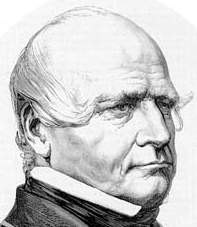
Barrot |
Barrot, (Camille Hyacinthe) Odilon (b. July 19, 1791, Villefort, Lozère, France - d. Aug. 6, 1873, Bougival, Seine-et-Oise [now in Yvelines], France), French politician. He began his career in 1814 as a barrister in the Court of Cassation. His dissatisfaction with the government of the Bourbon Restoration was shown in his conduct of some political trials, and he was elected president of the society Aide-toi, le ciel t'aidera ("Heaven helps those who help themselves"), an organization formed to aid liberal candidates for election to the Chamber of Deputies. He was a very active member of the party which brought about the revolution of July 1830 and was one of the three commissioners appointed by the Provisional Government to intimate that the crown jewels would be restored to the royal family on condition that they would depart immediately for Cherbourg. The proposition was accepted, and Barrot accompanied Charles X to the point of embarkation, being, on his return to Paris, nominated prefect of Seine département (1830-31). Under the new king Louis-Philippe, Barrot was the first to declare against a reactionary policy. As deputy from Eure, he was an active member of the opposition in the Chamber of Deputies. During 1846-47 he was one of the managers of the "banquets" campaign, which attempted to pressure the government into extending the franchise. The reforms did not come, but a republican revolution did. After the flight of Louis-Philippe in 1848, Barrot joined the moderate Republicans. He headed the first ministry called by Louis-Napoléon Bonaparte (December 1848) and also became minister of justice. Dismissed from the government in October 1849, he was imprisoned briefly after the coup d'état of Dec. 2, 1851, and then retired to private life. In 1871 he became vice president of the new Council of State.
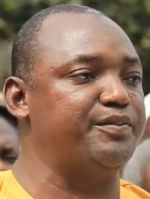
A. Barrow | 
D. Barrow |
Barrow, Adama (b. Feb. 16, 1965, Mankama Kunda, near Basse, Gambia), president of The Gambia (2017- ).
Barrow, Dean (Oliver) (b. March 2, 1951, Belize, British Honduras [now Belize]), foreign minister (1985-89, 1993-98), prime minister and finance minister (2008-20), and home affairs minister (2016-20) of Belize.
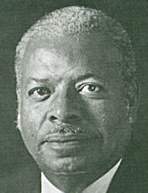
E. Barrow |
Barrow, Errol (Walton) (b. Jan. 21, 1920, St. Lucy, Barbados - d. June 1, 1987, Bridgetown, Barbados), prime minister (1966-76, 1986-87) and foreign minister (1966-71) of Barbados; brother of Dame Nita Barrow. He served in the Royal Air Force (1940-47) and piloted more than 50 missions over Western Europe. In 1951 he entered politics and was elected to parliament as a member of the Barbados Labour Party (BLP). He became disillusioned with the party's conservatism and in 1955 helped found the Democratic Labour Party (DLP), becoming its chairman (1958-76). He served three terms as premier and prime minister between 1961 and 1976, taking Barbados into independence in 1966. He pursued a policy of agricultural diversification, encouraged tourism, and worked to establish a racially integrated society. He lost popularity as a result of the deterioration in the economy that followed the oil price rise of the early 1970s. Barrow's moves to increase the government's influence on judicial appointments also proved damaging, and the BLP won 17 out of 24 seats in the 1976 election. A sweeping election victory for the DLP returned Barrow to power as prime minister on May 28, 1986. An energetic advocate of regional integration, Barrow was influential in the foundation of the Caribbean Free Trade Association, which later became the Caribbean Community and Common Market (Caricom). He opposed U.S. intervention in Caribbean affairs, notably the invasion of Grenada in 1983. Following his election in 1986 he made efforts to resolve difficulties within Caricom, notably those with Trinidad and Tobago. Together with Prime Minister James Mitchell of St. Vincent and the Grenadines, he strongly opposed upgrading of the Regional Security System, particularly by means of a formal treaty.

N. Barrow |
Barrow, Dame (Ruth) Nita (b. Nov. 15, 1916, St. Lucy, Barbados - d. Dec. 19, 1995, Bridgetown, Barbados), governor-general of Barbados (1990-95); sister of Errol Barrow. Born into a family of civic activists, she was motivated by the humanitarian values of her father and uncle. She chose nursing as a profession and rose to become principal nursing officer for Jamaica (1956-63), and then rapidly gained international stature as nursing adviser to the Pan American Health Organization (1964-71), medical commissioner (1971-80) and North American president (1983-91) of the World Council of Churches, president of the World YWCA (1975-83), health consultant to the WHO (1981-86), president of the International Council for Adult Education (1982-90), and Barbadian ambassador to the UN (1986-90). Barrow presided at the 1985 international women's conference in Nairobi, Kenya, and was the only woman named to the Eminent Persons Group set up to investigate racism in South Africa in 1986. In 1987 she was awarded the CARICOM Women's Award for her personal accomplishments and the stature she brought to women of the Caribbean. In 1988 she lost a bid for the presidency of the UN General Assembly. Barrow was made Dame of the Order of St. Andrew in 1980 and G.C.M.G. in 1990. She capped her long and distinguished career by becoming the first woman governor-general of Barbados.
Barrow, Ursula (Helen), (after marriage in 1994) Viscountess Waverley (b. Oct. 31, 1955), Belizean diplomat. She was permanent representative to the United Nations (1989-90), high commissioner to the United Kingdom (1993-98), and ambassador to Belgium, France, Germany, and the Vatican (1994-98).
Barrowclough, Sir Harold Eric (b. June 23, 1894, Masterton, N.Z. - d. March 4, 1972, Auckland, N.Z.), acting governor-general of New Zealand (1957, 1962); knighted 1954. He was chief justice (1953-66).

A. Barry |
Barry, Alpha (Mamadou) (b. 1970, Ivory Coast [now Côte d'Ivoire]), foreign minister of Burkina Faso (2016-20, 2021).
Barry, Marion (Shepilov, Jr.) (b. March 6, 1936, Itta Bena, Miss. - d. Nov. 23, 2014, Washington, D.C.), mayor of Washington, D.C. (1979-91, 1995-99). Born without a middle name, he became such an active and loud supporter of the civil rights movement in the 1950s that his fraternity brothers began calling him "Shep," after Dmitry Shepilov (Soviet foreign minister 1956-57), and he adopted the surname as his middle name. He won a seat on the Washington City Council in 1974 and four years later was elected mayor. His Jan. 19, 1990, videotaped arrest by FBI agents in a downtown hotel during his third term led to a six-month jail sentence on a misdemeanour drug charge. He came back from that to make a successful run for the council before winning a fourth term as mayor in 1994. The trend toward greater autonomy for the district was reversed in the 1990s as the city slipped toward financial collapse, with Congress creating a control board in 1995 to oversee city finances and stripping Barry of all except ceremonial duties. Nevertheless he claimed credit for planting the seeds of economic recovery in the city. He also took credit for finding the managers who would help guide the city once he departed. They include Anthony Williams, the city's former chief financial officer. It was Barry who persuaded Williams to leave his post as an executive with the U.S. Department of Agriculture to run the city's finances. When Barry announced in May 1998 that he would not seek a fifth term, Williams resigned to run for mayor. Barry acknowledged that several of his former associates faced legal problems and prosecution on charges including official misconduct, theft, and bribery. "About a half dozen" workers out of roughly 40,000 city employees, Barry said. "I think that's a record you ought to look at as positive."
Barry, Megan (Christine), née Mueller (b. Sept. 22, 1963, Santa Ana, Calif.), mayor of Nashville (2015-18).
Barry, Peter, Irish Peadar de Barra (b. Aug. 10, 1928, Cork, Ireland - d. Aug. 26, 2016, Cork), foreign minister of Ireland (1982-87). He was also minister of transport and power (1973-76), education (1976-77), and environment (1981-82) and deputy prime minister (1987).
Barry, William T(aylor) (b. Feb. 5, 1784, Lunenburg county, Va. - d. Aug. 30, 1835, Liverpool, England), U.S. postmaster general (1829-35). He was appointed minister to Spain in 1835 but died on his journey there.
Barry-Battesti, Ange François (b. Feb. 11, 1932, Séguéla, Ivory Coast [now Côte d'Ivoire]), Ivorian politician. He was minister of technical education and professional training (1970-83, 1986-90) and public works, transportation, construction, posts and telecommunications (1983-86).
Barsallo Burga, José (Augusto) (b. Feb. 8, 1927, Chiclayo, Peru - d. Aug. 15, 2010), interior minister of Peru (1987-88).
Barschel, Uwe (b. May 13, 1944, Glienicke, near Berlin, Germany - d. [apparent suicide] Oct. 11, 1987, Geneva, Switzerland), minister-president of Schleswig-Holstein (1982-87).
Bart, Delano Frank (b. Oct. 28, 1952, Saint Christopher-Nevis-Anguilla [in present Saint Kitts and Nevis]), Saint Kitts and Nevis politician. He was attorney general (1995-2006), minister of justice (2001-04) and legal affairs (2001-06), and permanent representative to the United Nations (2006-15).
Bartagi, Brahim (b. Sept. 4, 1955, Jemmal, Tunisia), defense minister of Tunisia (2020-21).
Barták, Martin (b. Feb. 14, 1967, Prague, Czechoslovakia [now in Czech Republic]), defense minister and a deputy prime minister of the Czech Republic (2009-10).
Bartel, Kazimierz (Wladyslaw) (b. March 3, 1882, Lemberg, Austria [now Lviv, Ukraine] - d. [executed under German occupation] July 26, 1941, Lvov, Ukrainian S.S.R. [now Lviv, Ukraine]), prime minister of Poland (1926, 1928-29, 1929-30). He was also minister of railways (1919-20, 1926) and religious affairs and education (1926-27) and deputy prime minister (1926-28).
Bartels, Kwamena (b. Oct. 27, 1947, Agona Swedru, Gold Coast [now Ghana]), interior minister of Ghana (2007-08). He was also minister of works and housing (2001), private sector development (2001-06), and information and national orientation (2006-07).
Barter, Sir Peter (Leslie Charles) (b. March 26, 1940, Sydney, N.S.W. - d. June 21, 2022, Cairns, Qld.), governor of Madang (1995-97, 2002) and caretaker governor of Southern Highlands (2002-03); knighted 2001. He was also Papua New Guinean minister of provincial and local government (1996-97), inter-government relations (2002-06), and health and Bougainville affairs (2006-07).
Bartha de Dálnokfalva, Károly vitéz (b. June 18, 1884, Budapest, Hungary - d. Nov. 22, 1964, Linz, Austria), defense minister of Hungary (1938-42).
Bartha de Nagyborosnyó, Albert (b. Aug. 12, 1877, Kolozsvár, Hungary [now Cluj-Napoca, Romania] - d. Dec. 5, 1960, New York City), defense minister of Hungary (1918, 1946-47).
Barthélemy, Joseph (b. July 9, 1874, Toulouse, Haute-Garonne, France - d. May 14, 1945, Auch, Gers, France), justice minister of France (1941-43).
Barthelemy Martínez, Fernando (b. Sept. 1, 1932, Trinidad, Bolivia - d. July 20, 2000, Santa Cruz, Bolivia), interior and justice minister of Bolivia (1985-87).
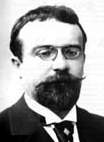
Barthou |
Barthou, (Jean) Louis (b. Aug. 25, 1862, Oloron-Sainte-Marie, Basses-Pyrénées [now Pyrénées-Atlantiques], France - d. Oct. 9, 1934, Marseille, France), prime minister of France (1913). First elected a deputy in 1889 for the département of Basses-Pyrénées, he first entered the government as minister of public works in the cabinet of Charles Dupuy (1894-95). In 1896-98, he was minister of the interior under Jules Méline. He again became minister of public works as well as posts and telegraphs in the cabinet of Jean Marie Ferdinand Sarrien of 1906, and continued in the post under Georges Clemenceau until 1909. Then he was minister of justice (1909-10, 1913) under Aristide Briand. In March 1913 Pres. Raymond Poincaré called on him to form a government, in which he was also minister of public instruction and fine arts. As premier, he forced through the unpopular measure of increasing the term of compulsory military service from two to three years (July 19, 1913); it resulted in a reaction, and he was defeated on a financial question in December. But when World War I broke out soon afterward, he was frequently credited with having saved France. During the war itself he was minister of state (1917) and foreign minister (1917) in the cabinet of Paul Painlevé, but he played no very prominent part until after the armistice and the peace conference. He became defense minister (1921-22), then in 1922 was again justice minister, represented France at the Genoa conference, entered the Senate, and became chairman of the Reparations Commission. In 1926-29 he was justice minister a fourth time, under Poincaré. In 1930 Barthou was again invited to form a government, but failed. In 1930-31 he was defense minister again. He was named foreign minister in the coalition ministry of Gaston Doumergue (February 1934) but eight months later was assassinated with King Aleksandar of Yugoslavia during the latter's visit to France.
Bartkevics, Leonards, Russian Leonard (Leopoldovich) Bartkevich (b. April 9, 1932, near Dagda, Latvia), foreign minister of the Latvian S.S.R. (1985-89). He was also chairman of the State Committee for Television and Broadcasting (1976-85).
Bartkus, Gintautas (b. June 13, 1966), justice minister of Lithuania (2000-01).
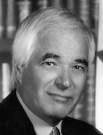
Bartleman |
Bartleman, James K(arl) (b. Dec. 24, 1939, Orillia, Ont.), lieutenant governor of Ontario (2002-07).
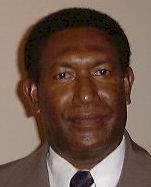
A. Bartlett |
Bartlett, Alex (b. Sept. 13, 1952), foreign minister of the Solomon Islands (2001-02). He later served as minister of tourism (2002-04) and minister of agriculture and livestock (June-September 2004). He was arrested on Sept. 2, 2004. He has been charged with demanding money with menace, false pretenses, inciting others to commit arson, and arson, offenses alleged to have occurred in 2000 during a time of ethnic tensions in the Solomon Islands. Before entering the government, he was a leader of the Malaita Eagle Force which was involved in fighting with a rival militant group. As foreign minister, he was reportedly banned in March 2002 from travelling across U.S. territory. He was granted bail for health reasons in February 2006. He was arrested again on May 12 on rioting and arson charges, being accused of instructing the burning down of a Chinatown building and inciting looters during the April 18 rioting in Honiara; he was released on bail on May 19. Additional charges of conspiracy were dropped in July 2007.
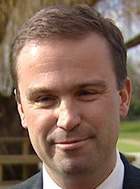
David Bartlett |
Bartlett, David (John) (b. Jan. 19, 1968, Hobart, Tas.), premier of Tasmania (2008-11).
Bartlett, Dewey (Follett) (b. March 28, 1919, Marietta, Ohio - d. March 1, 1979, Tulsa, Okla.), governor of Oklahoma (1967-71).
Bartlett, Dewey (Follett), Jr. (b. March 16, 1947, Tulsa, Okla.), mayor of Tulsa (2009-16); son of Dewey Bartlett.
Bartlett, Josiah (b. Nov. 21, 1729, Amesbury, Massachusetts - d. May 19, 1795, Kingston, N.H.), president (1790-93) and governor (1793-94) of New Hampshire.
Bartlett Díaz, Manuel (b. Feb. 23, 1936, Puebla, Puebla, Mexico), interior minister of Mexico (1982-88) and governor of Puebla (1993-99). He was also education minister (1988-92).
Bartley, Gerald (b. June 12, 1898, Cloghan, County Mayo, Ireland - d. April 18, 1975), defence minister of Ireland (1961-65). He was also minister of Gaeltacht (1959-61).
Bartley, Mordecai (b. Dec. 16, 1783, Fayette county, Pa. - d. Oct. 10, 1870, Mansfield, Ohio), governor of Ohio (1844-46).
Bartley, (Alf) Osborne (b. July 20, 1919, Göteborg, Sweden - d. Oct. 24, 2019, Stockholm, Sweden), governor of Västmanland (1980-85).
Bartley, Thomas W(elles) (b. Feb. 11, 1812, Jefferson county, Ohio - d. June 20, 1885, Washington, D.C.), acting governor of Ohio (1844); son of Mordecai Bartley.
Bartolini, Gianfranco (b. Jan. 17, 1927, Fiesole, near Florence, Italy - d. Oct. 10, 1992), president of Toscana (1983-90).
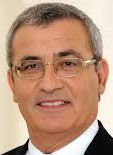
Bartolo |
Bartolo, Evarist (b. Oct. 14, 1952, Mellieha, Malta), foreign minister of Malta (2020-22). He was also minister of education and national culture (1996-98) and education and employment (2013-20).

E. Barton |
Barton, Sir Edmund (b. Jan. 18, 1849, Sydney, New South Wales [now in Australia] - d. Jan. 7, 1920, Medlow, N.S.W.), prime minister of Australia (1901-03). Defeated for the University of Sydney seat in the New South Wales Legislative Assembly in 1876 and again in 1877, he was eventually successful in 1879. From then he held alternately seats in the Legislative Assembly and Legislative Council, serving as speaker of the Assembly (1883-87) and as attorney general (1889, 1891-93). In 1891 he assumed leadership of the federation movement and, in the federal convention of that year, helped shape the draft that became the foundation for the eventual commonwealth constitution. The constitution bill passed the New South Wales Assembly in 1893, and for the next four years he campaigned vigorously for its approval by the public. He led the federal convention of 1897-98 that drafted the final commonwealth constitution bill. He went to England in 1900 to guide the new constitution through Parliament, and he returned to Australia to become the new federation's first prime minister and minister for external affairs. Having twice refused a knighthood, Barton finally accepted a G.C.M.G. in 1902. Never thoroughly at home in the partisan atmosphere of the new Australian parliament, he resigned in 1903 to become a senior judge on the High Court of Australia, a post he held until his death.
Barton, Francis Rickman (b. Jan. 4, 1865 - d. Oct. 4, 1947), administrator of Papua (1904-07) and first minister of Zanzibar (1908-13).
Barton, John J. (b. June 23, 1906, Indianapolis, Ind. - d. May 4, 2004), mayor of Indianapolis (1964-68). He served in the Navy during World War II and went on to serve as superintendent of the Indiana State Police. A Democrat, he was elected mayor in 1963 and then lost in 1967 to Republican Richard Lugar. During his term as mayor, he started the Greater Indianapolis Progress Committee, a group of local leaders that helped start many revitalization projects over the years. Barton's administration also laid the groundwork for the Indiana Convention Center and Eagle Creek Park and reservoir. Construction of the Indiana National Bank tower, one of the city's first skyscrapers, was started during his term. After losing to Lugar, he served 21 years on the Indiana Parole Board, retiring in 1989.
Barton, Philip (Robert) (b. Aug. 18, 1963), acting governor of Gibraltar (2006). He was deputy governor in 2005-08.
Barton, William Hickson (b. Dec. 10, 1917, Winnipeg, Man. - d. Nov. 8, 2013, Ottawa, Ont.), Canadian diplomat. He was permanent representative to the United Nations (1976-79).
Bartos, Ivan (b. March 20, 1980, Jablonec nad Nisou, Czechoslovakia [now in Czech Republic]), Czech politician. He has been chairman of the Pirate Party (2009-13, 2013-14, 2016- ) and a deputy prime minister and minister of regional development (2021- ).
Bartoshevich, Gennady (Georgiyevich) (b. Sept. 12, 1934, Minsk, Belorussian S.S.R. - d. Oct. 8, 1993), Soviet politician. He was first secretary of the party committee of Minsk city (1977-83) and Soviet ambassador to North Korea (1987-90).
Bartoszcze, Roman (Boleslaw) (b. Dec. 9, 1946, Jaroszewice, Poland - d. Dec. 31, 2015, Inowroclaw, Poland), Polish presidential candidate (1990). He was president of the Polish Peasant Party (1990-91).
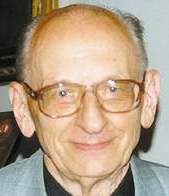
Bartoszewski |
Bartoszewski, Wladyslaw (b. Feb. 19, 1922, Warsaw, Poland - d. April 24, 2015, Warsaw), foreign minister of Poland (1995, 2000-01). He was also ambassador to Austria (1990-95).
Bartram, Walter (Andreas Ernst Gustav) (b. April 21, 1893, Neumünster, Prussia [now in Schleswig-Holstein], Germany - d. Sept. 30, 1971, Latendorf, Schleswig-Holstein, West Germany), minister-president of Schleswig-Holstein (1950-51).
Bartsits, Beslan (Konstantinovich) (b. July 22, 1978, Gagra, Abkhaz A.S.S.R., Georgian S.S.R.), prime minister of Abkhazia (2016-18). He has also been head of the administration of the president (2016, 2018- ).
Bartumeu Cassany, Jaume (b. Nov. 10, 1954, Andorra la Vella, Andorra), finance minister (1990-92) and head of government (2009-11) of Andorra.
Bartuska, Jan (b. May 17, 1908, Selze, Austria [now Sedlec, Czech Republic] - d. Aug. 27, 1970, Prague, Czechoslovakia [now in Czech Republic]), justice minister of Czechoslovakia (1954-56).
Barúa Castañeda, Luis (José Emiliano) (b. June 18, 1927, Miraflores, Lima province, Peru - d. April 8, 1984, Miraflores), finance minister of Peru (1975-77).
Barulli, Libero (b. Sept. 30, 1947, San Marino), captain-regent of San Marino (1982-83).
Barwani, Sheikh Ali Muhsin al- (b. Jan. 13, 1919, Zanzibar - d. March 20, 2006), foreign minister of Zanzibar (1963-64).
Barwick, David Robert (b. Oct. 20, 1927 - d. April 25, 2001), governor of the British Virgin Islands (1982-86).
Barwick, Sir Garfield (Edward John) (b. June 22, 1903, Sydney, N.S.W. - d. July 13, 1997), Australian politician. He was highly regarded for his service to the Australian government as attorney general (1958-64), foreign minister (1961-64), and chief justice of the High Court (1964-81) but his reputation was clouded by the controversy that ensued when his advice led the governor-general to dismiss the Labor government of Gough Whitlam in 1975. He was knighted in 1953 and again (G.C.M.G.) in 1965.
Baryadayev, Konstantin (Lavrentyevich) (b. 1917, Bilchir ulus, Irkutsk province, Russia - d. 1983), chairman of the Council of Ministers of the Buryat A.S.S.R. (1962-67).
Baryatinsky, Knyaz (Prince) Aleksandr (Anatolyevich) (b. Aug. 22, 1846 - d. April 8, 1914), governor of Dagestan (1896-1901); grandson of Knyaz Ivan (Ivanovich) Baryatinsky; great-grandson of Graf Pyotr Zavadovsky; son-in-law of Knyaz Dmitry Svyatopolk-Mirsky.
Baryatinsky, Knyaz (Prince) Aleksandr (Ivanovich) (b. May 14 [May 2, O.S.], 1815, Ivanovskoye, Kursk province [now oblast], Russia - d. March 9, 1879, Geneva, Switzerland), viceroy of the Caucasus (1856-62); son of Knyaz Ivan (Ivanovich) Baryatinsky.
Baryatinsky, Knyaz (Prince) Ivan (Fyodorovich) (b. 1689 - d. 1738), governor-general of Moscow (1735-36, 1736-37).
Baryatinsky, Knyaz (Prince) Ivan (Ivanovich) (b. 1767 - d. June 25 [June 13, O.S.], 1825), Russian diplomat; son of Knyaz Ivan (Sergeyevich) Baryatinsky; grandson of Gertsog Pyotr Avgust Fridrikh Golshteyn-Bek. He was minister to Bavaria (1808-12).
Baryatinsky, Knyaz (Prince) Ivan (Sergeyevich) (b. March 9 [Feb. 27, O.S.], 1740 - d. Jan. 3, 1812 [Dec. 22, 1811, O.S.]), Russian diplomat; grandson of Knyaz Ivan (Fyodorovich) Baryatinsky; son-in-law of Gertsog Pyotr Avgust Fridrikh Golshteyn-Bek. He was minister to France (1773-85).
Baryshev, Nikolay (Ivanovich) (b. Nov. 25 [Nov. 13, O.S.], 1898, Sterlitamak, Ufa province [now in Bashkortostan republic], Russia - d. [executed] Oct. 30, 1937), executive secretary of the Communist Party committee of the Tatar A.S.S.R. (1921) and the Yakut A.S.S.R. (1928-30). He was also executive secretary of the party committees of Sumy (1923-24), Chernomorsk (1925-26), and Kuban (1926-28) okruga and chairman of the Executive Committee of Saratov oblast (1937).
Baryshnikov, Aleksandr (Aleksandrovich) (b. Aug. 8, 1877, St. Petersburg, Russia - d. 1924), Russian politician. He was a member of the State Duma (1912-17) and acting minister of state protection (1917).
Baryshnikov, Stepan (Pavlovich) (b. Jan. 3, 1894 [Dec. 22, 1893, O.S.], Barmashur, Vyatka province [now in Udmurtia republic], Russia - d. Jan. 23, 1943, Ukhta labour camp, Komi A.S.S.R., Russian S.F.S.R.), executive secretary of the Communist Party committee of Votyak autonomous oblast (1921, 1926-27) and chairman of the Central Executive Committee (1937) and first secretary of the party committee (1937-38) of the Udmurt A.S.S.R.

Masrour Barzani | 
Massoud Barzani |
Barzani, Masrour (Massoud Mustafa) (b. March 2, 1969, Dilman, Arbil province, Iraq), prime minister of Kurdistan autonomous region (2019- ); son of Massoud Barzani; cousin of Nechirvan Barzani.
Barzani, Massoud (b. Aug. 16, 1946, Mahabad, Iran), president of the Kurdistan Democratic Party (1979- ) and president of the Kurdistan autonomous region (2005-17); son of Mustafa Barzani; nephew of Hoshyar Zebari. He was a member of the 2003-04 Iraqi Governing Council established under U.S. occupation and was its president in April 2004.
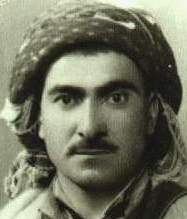
Mustafa Barzani |
Barzani, (Mullah) Mustafa (b. March 14, 1903, Barzan, Ottoman Empire [now in Iraqi Kurdistan] - d. March 1, 1979, Washington, D.C.), Kurdish nationalist leader. He succeeded his elder brother, Sheikh Ahmed, who led the Kurdish national struggle from World War I until the late 1930s. Barzani headed the Kurdistan Democratic Party (KDP) formed in 1945 and becomes army commander of the short-lived Kurdish Mahabad Republic established with Soviet aid in northwestern Iran in 1946. After the Soviet forces withdrew, the republic collapsed, and Barzani took refuge in Soviet Azerbaijan, where he remained until he was allowed to return to Iraq by Abdul Karim Kassem's regime. Kassem's proposal for an autonomous Kurdish area in northern Iraq was judged unsatisfactory by Barzani, and in 1960 he escaped to the mountains and started a guerrilla war against the Iraqi forces. After ten years of intermittent fighting, a 15-point ceasefire agreement was concluded on March 11, 1970, between Barzani and Pres. Ahmad Hassan al-Bakr of Iraq. A general amnesty for the insurgent Kurds was proclaimed, but it was not until March 11, 1974, that a law defining the Kurdish autonomous region was promulgated. Barzani found this unacceptable and ordered his Peshmerga ("forward to death") forces to resume fighting. This time, however, Barzani had considerable support from Iran. When Iraq renounced its territorial claims against Iran on March 6, 1975, the shah stopped all military aid to the Kurds. Barzani took up residence in Tehran but requested political asylum in the U.S., where he died.
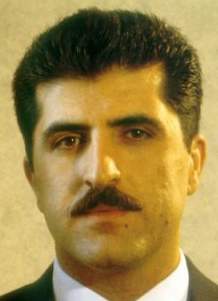
N. Barzani |
Barzani, Nechirvan (Idris) (b. Sept. 21, 1966, Barzan, Iraqi Kurdistan), deputy prime minister (1996-99) and prime minister (1999-2005) of the Kurdistan Democratic Party government of Iraqi Kurdistan and prime minister (2005-09, 2012-19) and president (2019- ) of the Kurdistan autonomous region; grandson of Mustafa Barzani; nephew of Massoud Barzani.

Barzel |
Barzel, Rainer (Candidus) (b. June 20, 1924, Braunsberg, East Prussia, Germany [now Braniewo, Poland] - d. Aug. 26, 2006, Munich, Germany), German politician. He was first elected to the Bundestag in 1957, after serving as an advisor and speechwriter for Karl Arnold, the minister-president of Nordrhein-Westfalen. In 1962-63 he was minister of all-German affairs. He then served as chairman of the Christian Democratic Union (CDU) from 1971 to 1973 and ran as the CDU's candidate for chancellor in the 1972 federal elections, losing to Willy Brandt's Social Democratic Party. The 1972 election is commonly regarded as an indirect referendum on Chancellor Brandt's Ostpolitik, the more open policy toward the eastern bloc, which called for normalized relations with East Germany and the U.S.S.R. Barzel was vehemently opposed to it, fearing that it might cement the permanent division of Germany. In May 1972, an attempt by Barzel to call a motion of no confidence against Brandt's government failed by two votes. It emerged after German reunification that some members of parliament had been paid off by the East German secret police, the Stasi, likely leading to the failure. Had the motion succeeded, Barzel would have become chancellor. He served as minister of intra-German relations (1982-83) in Helmut Kohl's cabinet, and as president of the Bundestag (1983-84). He resigned from the latter post after being accused of entanglement in a financial scandal known as the Flick affair. He remained a member of the Bundestag until 1987.
Basa, Datuk Rangkayo (b. Jan. 17, 1906, Maninjau, Netherlands East Indies [now in Sumatera Barat, Indonesia] - d. April 1, 1981, Padang, Sumatera Barat, Indonesia), governor of Sumatera Barat (1958-65).
Basadre Stevenson, Enrique C(arlos) (b. 1848, Tacna, Peru - d. Feb. 22, 1925, Lima, Peru), interior and police minister (1910-11) and prime minister (1910-11) of Peru.
Basanov, Vladimir (Mantsinovich) (b. Nov. 26, 1948), chairman of the Supreme Soviet of Kalmykia (1990-92).
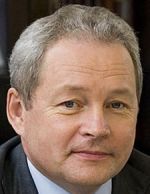
Basargin |
Basargin, Viktor (Fyodorovich) (b. Aug. 3, 1957, Asbest, Sverdlovsk oblast, Russian S.F.S.R.), governor of Perm kray (2012-17). He was Russian minister of regional development in 2008-12.
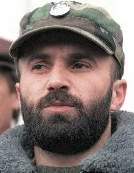
Basayev |
Basayev, Shamil (Salmanovich), also known as Abdullah Shamil Abu Idris (b. Jan. 14, 1965, Vedeno village, Chechen-Ingush A.S.S.R., Russian S.F.S.R. [now in Chechnya, Russia] - d. July 10, 2006, near Ekazhevo, Ingushetia, Russia), prime minister of Chechnya (1998, 2006). When the first Chechen war broke out in December 1994, he organized Grozny's defenses and emerged as the resistance's most capable commander. In January 1997 he lost a bid for the Chechen presidency, capturing 23.5% of the vote. The head of the radical wing of the Chechen separatists, he led the 1999 incursion into Dagestan which led to the second Chechen war. Shortly after the hostage-taking raid on Moscow's Dubrovka theater in October 2002, for which Basayev claimed responsibility, Pres. Aslan Maskhadov removed him from all posts in the rebel political hierarchy, saying his methods were too extreme. He claimed responsibility for numerous suicide bombings in 2003-04, for the assassination of the Moscow-supported president of Chechnya, Akhmad Kadyrov, in May 2004, for the hostage drama in a school in Beslan, North Ossetia-Alania, in September 2004 in which over 300 people, many of them children, were killed after Russian forces stormed the building, and for the October 2005 attack in Nalchik, Kabardino-Balkariya, that left over 130 dead. Russia has put a $10.3 million bounty on his head. In August 2005 he was named first deputy prime minister and put in charge of the armed forces by Abdul-Khalim Sadulayev, who succeeded as president when Maskhadov was killed. In June 2006 Sadulayev in turn was killed, and his successor Doku Umarov named Basayev as vice president and government chairman. The following month Basayev himself was killed in the explosion of a truck filled with explosives; the rebels called it an accident.
Bascuñán Santa María, Ascanio (b. March 16, 1860, Concepción, Chile - d. April 24, 1935), war and marine minister of Chile (1904-05). He was also president of the Chamber of Deputies (1909-11).
Basdeo, Sahadeo (b. Sept. 10, 1945, Rousillac, Trinidad and Tobago), foreign minister of Trinidad and Tobago (1988-91).
Baseane Nangaa, Christophe (b. May 15, 1972, Kinshasa, Zaire [now Congo (Kinshasa)]), governor of Haut-Uélé (2019- ).
Baselios Augen I, original family name Chettakulathukara (b. July 26, 1884, Vengola village, Ernakulam district [now in Kerala], India - d. Dec. 8, 1975), Catholicos of the East (head of the Malankara Orthodox Syrian Church) (1964-75).
Baselios Marthoma Mathews I, original family name Vattakunnel, name as bishop Athanasios Mathews (b. March 27, 1907, Kottayam, Travancore [now in Kerala], India - d. Nov. 8, 1996), Catholicos of the East (head of the Malankara Orthodox Syrian Church) (1975-91).
Baselios Marthoma Mathews II (b. Jan. 30, 1915, Perinad, Kollam district, Travancore [now in Kerala], India - d. Jan. 26, 2006, Devalokam, Kottayam, Kerala, India), Catholicos of the East (head of the Malankara Orthodox Syrian Church) (1991-2005).
Baselios Marthoma Mathews III, previous name Mathews Mar Severios (b. Feb. 12, 1949, Vazhoor, Travancore [now in Kerala], India), Catholicos of the East (head of the Malankara Orthodox Syrian Church) (2021- ).

Basescu |
Basescu, Traian (Dumitru) (b. Nov. 4, 1951, Basarabi [now Murfatlar], Constanta county, Romania), president of Romania (2004-14). He entered politics after the 1989 revolution which ousted the Communist dictator Nicolae Ceausescu. He was transport minister in 1991-92 and was elected to parliament for the National Salvation Front in 1992. Following the 1992 split in the NSF, he followed Petre Roman into the Democratic Party, and, in 1996, he coordinated Roman's unsuccessful presidential campaign. In 1996-2000 he was again transportation minister. In June 2000, he became mayor of Bucharest after defeating the candidate of the ruling Social Democratic Party. Having turned against Roman, he replaced him as president of the Democratic Party in 2001. He became co-chairman of the Justice and Truth alliance formed in 2003 between his party and the National Liberal Party. In June 2004 he was reelected mayor in a decisive first-round victory over Social Democratic candidate Mircea Geoana. In October 2004, he was nominated as presidential candidate of the Justice and Truth alliance, after Theodor Stolojan withdrew. Basescu, campaigning on an anti-corruption ticket, came second to Prime Minister Adrian Nastase in the first round of the presidential election in November, but edged him out in the runoff in December. As president, he was credited with helping to implement reforms which helped Romania join the EU on Jan. 1, 2007. However, he came to be at odds not only with the left-wing opposition but with Liberal prime minister Calin Popescu-Tariceanu. Lawmakers accused him of 19 counts of constitutional abuses such as usurping the cabinet from the prime minister, criticizing judges, and ordering the tapping of minister's telephone calls. The Constitutional Court dismissed the accusations, but nevertheless in April 2007 parliament voted to suspend him. However, he remained the country's most popular politician and in the following referendum his removal from office was strongly rejected. He was narrowly reelected in 2009. In 2012 he was again suspended; this time voters overwhelmingly supported his removal, but the turnout was below the required minimum. After his presidency he joined the People's Movement Party. In 2020 he ran again for mayor of Bucharest, but won only 11% of the vote.
Basesgioglu, Murat (b. March 1, 1955, Kastamonu, Turkey), interior minister of Turkey (1997-98). He was also minister of labour and social security (2002-07) and a minister of state (2007-09).
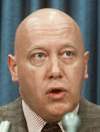
Basford |
Basford, Stanley Ronald, byname Ron Basford (b. April 22, 1932, Fort Garry, Manitoba - d. Jan. 31, 2005, near Sechelt, B.C.), Canadian politician. He was elected in 1963 as the Liberal member of parliament in Vancouver Centre, and reelected in the next four elections. A key western Canadian ally of Prime Minister Pierre Trudeau, he was minister of consumer and corporate affairs (1968-72), minister of state for urban affairs (1972-74), minister of national revenue (1974-75), minister of justice and attorney general (1975-78), and acting solicitor general (1978). In his various cabinet positions, he oversaw a number of landmark legislative acts, including the introduction of the metric system and the abolishment of capital punishment. But in Vancouver, he was known as Mr. Granville Island, for being the prime instigator of the project to turn the rundown industrial area into an island for arts and culture.

Basha | 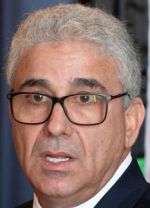
Bashagha |
Basha, Lulzim (Xhelal) (b. June 12, 1974, Tiranë, Albania), foreign minister (2007-09) and interior minister (2009-11) of Albania. He was also minister of public works, transport, and telecommunications (2005-07), mayor of Tiranë (2011-15), and leader of the Democratic Party (2013-22).
Bashagha, Fathi (Ali Abdul Salam) (b. Aug. 20, 1962, Misurata, Libya), interior minister (2018-21) and prime minister (2022- ; disputed) of Libya.
Basharmal, Khodaidad (b. July 15, 1945, Laghman, Afghanistan), Afghan politician. He was minister of education (1987-90), ambassador to Poland (1990-91), and permanent representative to the United Nations (1991-93).
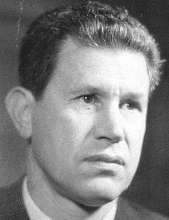
Bashev |
Bashev, Ivan (Hristov) (b. Feb. 24 [Feb. 11, O.S.], 1916, Sofia, Bulgaria - d. Dec. 13, 1971, on Mount Vitosha, near Sofia), foreign minister of Bulgaria (1962-71). Bashev, who was editor-in-chief of the national daily Narodna Mladezh in 1944-46, joined the Bulgarian Communist Party in the latter year and was elected to the party's central committee in 1962. Having been appointed deputy minister of education in 1956 and subsequently deputy minister of foreign affairs, he joined as foreign minister the government formed in 1962 by Todor Zhivkov after the fall of the Anton Yugov government and the defeat of the Stalinist and pro-Chinese party faction headed by Vulko Chervenkov. He retained the post in March 1966, when Zhivkov reorganized his government, and again in the Stanko Todorov cabinet formed in July 1971. He was killed while skiing on Mount Vitosha. According to a Foreign Ministry statement he was alone and had been caught in a sudden snowstorm, had apparently fallen and been injured, and died of cold and exhaustion before being found by the mountain rescue service.
Bashilov, Pyotr (Petrovich) (b. March 16, 1857, Tsarskoye Selo [now Pushkin, part of St. Petersburg], Russia - d. Sept. 21, 1919, Irkutsk, Russia), governor of Estonia (1906-07), Novgorod (1907-11), and Ufa (1911-17).
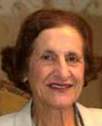
Marie Bashir |
Bashir, Dame Marie (Roslyn), Lady Shehadie (b. 1930, Narrandera, N.S.W.), governor of New South Wales (2001-14); knighted 2014; wife of Sir Nicholas Shehadie.
Bashir, Muhammad al- (d. Feb. 9, 1977, near Amman, Jordan), Jordanian politician. He was minister of premiership affairs (1970-71), health (1971-72, 1976-77), and communications (1972-73). He was killed in the helicopter crash in which Queen Alia (wife of King Hussein) also died.
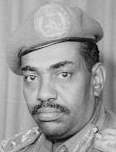
O.H.A. al-Bashir |
Bashir, Omar Hassan Ahmad al-, Arabic `Umar Hasan Ahmad al-Bashir (b. Jan. 1, 1944, Hoshe Bannaga, northeastern Sudan), president of the Revolutionary Command Council for National Salvation (1989-93) and president (1993-2019) of The Sudan. He ousted Sadiq al-Mahdi's elected government in 1989 and replaced it with a military regime, pledging not to restore a system of parliamentary democracy. He became the fourth military leader to overthrow a civilian government since Sudanese independence in 1956. A brigadier at the time of the coup, he afterwards rose to lieutenant general. He was hardly known outside army circles, where he had a reputation for toughness. He was the third-ranking officer in the paratroop division stationed in the isolated garrison of al-Muglad in south Kurdufan. Although he strongly denied that his regime was linked to the National Islamic Front, a Muslim fundamentalist movement, many of his appointees were known to be Muslim fundamentalists. During his first months in power, he showed little sign of having a clear political line. At one point he suggested the country might be partitioned between the Islamic north and the mainly non-Islamic south, but he later repudiated any such idea. He said he was unwilling to scrap the Shari`ah (Islamic law) but later suggested this was a matter for negotiation. (Imposition of Shari`ah was one cause of the revolt in the south.) In 1993 the military junta was dissolved and he was named president; he won presidential elections in 1996, 2000, 2010, and 2015. A peace agreement with the southern rebels was finally reached in 2004; Shari`ah would only apply to Muslims. Ultimately South Sudan was allowed to secede in 2011. But a new conflict had arisen in the western region of Darfur in 2003. In 2008 the prosecutor of the International Criminal Court asked for an arrest warrant for al-Bashir over alleged genocide and crimes against humanity in Darfur, where an estimated 200,000 people had been killed. The warrant was issued in March 2009. In 2013 he announced his intention not to run again in the 2015 election, but later changed his mind. Following an escalation in anti-government protests, he was forced to step down by the military in 2019 and was arrested. Later that year he was convicted on corruption charges and sentenced to two years of detention in a reform facility.
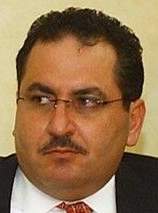
S. Bashir |
Bashir, Salah(eddin), Arabic Salah al-Din al-Bashir (b. 1966, Jordan), foreign minister of Jordan (2007-09); son of Muhammad al-Bashir. He was also minister of industry and trade (2001-03) and justice (2003-05).
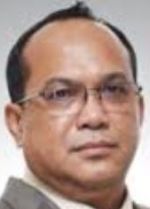
Bashir A. |
Bashir (bin) Alias, Datuk (b. 1966?), chairman of Labuan Corporation (2022- ). He was awarded the title Datuk in 2011.
Bashmakov, Lev (Polievktovich) (b. 1938, Shuya, Ivanovo oblast, Russian S.F.S.R. - d. Dec. 30, 2018, Yegoryevsk, Moscow oblast, Russia), chairman of the Executive Committee (1988-90) and head of the administration (1991-94) of Ryazan oblast.
Bashungwa, Innocent (Lugha) (b. May 5, 1979), defense minister of Tanzania (2022- ). He was also minister of industry and trade (2019-20) and information, culture, arts, and sports (2020-22).
Basil, Sam (b. Nov. 16, 1969 - d. [road accident] May 11, 2022), finance minister of Papua New Guinea (2019). He was also minister of national planning (2011-12 [O'Neill government], 2019), communications, information technology, and energy (2017-19), health, housing, and higher education (2019), treasury (2019-20), commerce and industry (2020-22), and transport and infrastructure (2022), deputy prime minister (2020, 2020-22), and leader of the Pangu Pati (2014-19), the Melanesian Alliance Party (2019), and the United Labour Party (2019-22).
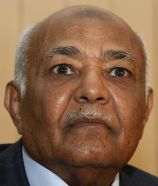
Basindwah |
Basindwah, Muhammad Salim (b. January 1935, Aden [now in Yemen]), foreign minister (1993-94) and prime minister (2011-14) of Yemen. He was also minister of social affairs and labour (1974), development (1977-78), and information and culture (1978-79) and permanent representative to the United Nations (1985-88) of Yemen (Sana) and information minister of Yemen (1994-95).
Basiyev, Oleg (Aleksandrovich) (b. 1919 - d. ...), chairman of the Council of Ministers (1962-75) and chairman of the Presidium of the Supreme Soviet (1975-81?) of the North Ossetian A.S.S.R.
Baska, Jaroslav (b. April 5, 1975, Povazská Bystrica, Slovakia), defense minister of Slovakia (2008-10).
Baskayev, Dzambolat (Timofeyevich) (b. 1903, Ksurt, Terek oblast [now in North Ossetia-Alania republic], Russia - d. ...), chairman of the Council of Ministers of the North Ossetian A.S.S.R. (1952-55). He was also people's commissar/minister of finance (1939-52) and deputy premier (1941-42).
Basnet, Hari Bahadur (b. May 23, 1942, Sapatel, Nepal), foreign minister of Nepal (1990). He was also minister of law, justice, and parliamentary affairs, education and sports, industry, commerce, and supplies (2003-04).
Basnet, Shakti Bahadur (b. April 14, 1971, Khalanga, Jajarkot district, Nepal), home affairs minister of Nepal (2015-16). He was also minister of health and population (2011) and forests and environment (2018-20).
Basombrío (Iglesias), Carlos (Miguel Ramón) (b. Aug. 31, 1957, Miraflores, Lima province, Peru), interior minister of Peru (2016-17); great-great-grandson of Miguel Iglesias and Mariano Castro Zaldívar; great-great-great-grandson of José Rufino Echenique.
Basov, Aleksandr (Vasilyevich) (b. March [February, O.S.] 1912 - d. Aug. 15, 1988, Moscow, Russian S.F.S.R.), Soviet politician. He was chairman of the Executive Committee (1955-60) and first secretary of the party committee (1960-62) of Rostov oblast, agriculture minister of the Russian S.F.S.R. (1965), and Soviet ambassador to Romania (1966-71), Chile (1971-73), and Australia (1975-79).
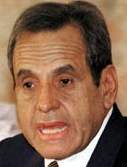
Basri |
Basri, Driss, Arabic Idris al-Basri (b. Nov. 8, 1938, Settat, Morocco - d. Aug. 27, 2007, Paris, France), interior minister of Morocco (1979-99). He started his career as a police commissioner in Rabat. In January 1973 he was appointed head of the counter-intelligence unit (Direction générale de la Surveillance du territoire). He joined the government for the first time in April 1974 as secretary of state for the interior. He became interior minister in March 1979. He was long considered Morocco's de facto prime minister and was in charge of the country's thorny Western Sahara file. In 1992, the increasingly strong role of Basri in government resulted in the delay of power sharing with the Moroccan opposition, representatives of which told King Hassan that it was "him or us." As the king was unwilling to compromise Basri's role in government, opposition parties decided not to enter government. Six years later, in 1998, the opposition was finally forced to accept Basri's role. The socialist opposition leader was appointed prime minister but Basri remained a major challenge to the new cabinet. Since King Muhammad VI ascended the throne in July 1999 the departure of the unpopular Basri had been considered inevitable, and he was sacked in November. He then left Morocco to live in Paris.
Bass, Karen (Ruth) (b. Oct. 3, 1953, Los Angeles, Calif.), mayor of Los Angeles (2022- ).
Bassaleng, Andi Baso (b. Dec. 28, 1946, Palopo, Netherlands East Indies [now in Sulawesi Selatan, Indonesia]), acting governor of Papua (2005-06).
Bassamoungou, Ferdinand (b. June 17, 1915, Rafai, Oubangui-Chari [now Central African Republic]), Central African Republic politician. He was minister of public works (1962-63), transport, posts, and telecommunications (1963-64), and health (1964).
Bassett, Michael (Edward Rainton) (b. Aug. 28, 1938, Auckland, New Zealand), internal affairs minister of New Zealand (1987-90). He was also minister of health (1984-87), local government (1984-90), and civil defense, arts and culture (1987-90).
Bassett, Richard (b. April 2, 1745, Cecil county, Maryland - d. Sept. 15, 1815, Cecil county), governor of Delaware (1799-1801).
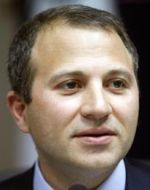
Bassil |
Bassil, Gebran (Gergi) (b. June 21, 1970, Batroun, Lebanon), foreign minister of Lebanon (2014-20); son-in-law of Michel Aoun. He was also minister of telecommunications (2008-09) and energy and water (2009-14).
Bassilekin, Simon (b. 1933 - d. July 14, 2015, Yaoundé, Cameroon), finance minister of Cameroon (1990-91).
Bassøe, Johannes Gerckens (b. April 23, 1878, Råde, Smaalenenes amt [now Østfold fylke], Norway - d. July 30, 1962, Oslo, Norway), governor of Svalbard (1925-35), Troms (1928-38), and Vestfold (1938-48).

D. Bassolé | 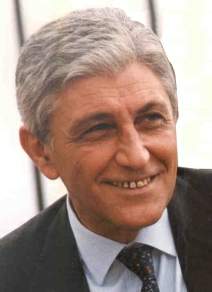
Bassolino |
Bassolé, Djibrill (Yipènè), also spelled Djibril (b. Nov. 30, 1957, Nouna, Upper Volta [now Burkina Faso]), foreign minister of Burkina Faso (2007-08, 2011-14). He was security minister in 2000-07.
Bassolé, (Bazomboué) Léandre (b. Sept. 21, 1946, Koudougou, Upper Volta [now Burkina Faso]), foreign minister of Burkina Faso (1986-87). He was permanent representative to the United Nations (1983-86) and ambassador to the U.S. (1986), Canada (1988-91), and Côte d'Ivoire (1991-2001).
Bassolino, Antonio (b. March 20, 1947, Afragola, near Naples, Italy), Italian politician. He joined the Italian Communist Party aged 17 and progressed quickly up the ranks. He was elected to parliament in 1987, but quit to run for mayor of Naples in 1993. As mayor (1993-2000), the popular and charismatic Bassolino was feted for cleaning up his crime-ridden southern port city. In 1998-99 he was labour and Southern affairs minister in the government of Massimo D'Alema. In 2000-10 he was president of Campania.
Bassols García, Narciso (b. Oct. 22, 1897, Tenango del Valle, México, Mexico - d. July 24, 1959, Mexico City, Mexico), interior minister (1934) and finance minister (1934-35) of Mexico; great-nephew of Sebastián Lerdo de Tejada. He was also minister of education (1931-34) and ambassador to the United Kingdom (1936-37), France (1938-39), and the Soviet Union (1945-46).
Bastari, Achmad (b. 1910? - d. Oct. 13, 1992, Jakarta, Indonesia), governor of Sumatera Selatan (1959-64).
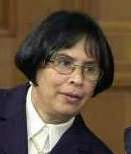
Bastidas |
Bastidas (Castillo), Adina (Mercedes) (b. June 11, 1943, Caracas, Venezuela), executive vice-president of Venezuela (2000-02). She was also production and commerce minister (2002).
Bastjanis, (Ernests) Voldemars, original surname Basens (b. Aug. 17, 1884, Pociema, Russia [now in Latvia] - d. May 19, 1975, Boston, Mass.), finance minister of Latvia (1926-28).
Bastola, Chakra (Prasad) (b. Nov. 26, 1946, Ilam, Nepal - d. Oct. 13, 2018, Khumaltar, Lalitpur district, Nepal), foreign minister of Nepal (2000-01). He was also ambassador to India (1991-95).
Bastos, Carlos (Manuel) (b. 1949?), infrastructure and housing minister of Argentina (2001).
Bastos, José Luiz Lopes (b. 1779? - d. April 20, 1850), acting president of Paraíba (1834-35).
Bastos, José Tavares (b. May 5, 1813, Maceió, Alagoas, Brazil - d. Aug. 8, 1893, Rio de Janeiro, Brazil), president of São Paulo (1866-67).
Bastos, Márcio Thomaz (b. July 30, 1935, Cruzeiro, São Paulo, Brazil - d. Nov. 20, 2014, São Paulo, Brazil), justice minister of Brazil (2003-07).
Bastyan, Sir Edric (Montague) (b. April 5, 1903, Seaforth, Lancashire, England - d. Oct. 6, 1980, North Adelaide, S.Aus.), governor of South Australia (1961-68) and Tasmania (1968-73). He trained at Sandhurst and served in several regiments, mainly in the administrative staff, before World War II broke out. During the postwar period he held major appointments in the British Army of the Rhine, as chief of staff, Eastern Command (1949-50), and as director of staff duties at the War Office (1950-52). From 1957 until his retirement in 1960 he was commander of the British forces in Hong Kong. He was a popular governor in South Australia, where Labor premiers, ignoring party policy that only Australians should hold gubernatorial office, extended his term. He was knighted in 1957.
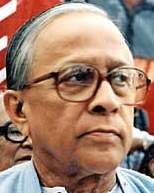
Basu |
Basu, Jyoti (Kiran) (b. July 8, 1914, Calcutta [now Kolkata], India - d. Jan. 17, 2010, Kolkata), Indian politician. He became chief minister of West Bengal in 1977, leading a left-wing government. But in the 1990s, he supported private managements against union militants. He surprised many when he allowed the R.P. Goenka group to take over Calcutta's state-owned electricity generation company. It was the biggest takeover in the 1980s in corporate India. Calcutta was one of the few Indian cities with privately-run transport services. In 1994, Basu introduced a radically new industrial policy that opened the floodgates to private investment - foreign and domestic. In 1995, West Bengal approved 385 private investment proposals amounting to 102 billion rupees ($2.9 billion), one of the highest totals among India's states. Rolls-Royce, Motorola, Philips, Gujarat Ambuja, Matsushita, and Delta Corporation of the United States were some of the multinational firms to pledge fresh investments. India's best-known Communist, he was thrust into national politics when the United Front alliance projected him as its consensus candidate for prime minister in 1996. By then India's longest-serving chief minister, Basu would defy stereotyping and push on with economic reforms, encouraging the private sector, colleagues said. But after a flurry of back-room bargaining, H.D. Deve Gowda was chosen to lead the coalition. Basu's Communist Party of India (Marxist) opted out of the United Front. He resigned as chief minister in 2000.
Baswedan, Anies (Rasyid) (b. May 7, 1969, Kuningan, Jawa Barat, Indonesia), governor of Jakarta (2017-22). He was also Indonesian minister of culture and education (2014-16).
Bata, István (b. March 5, 1910, Tura, Pest-Pilis-Solt-Kiskun [now in Pest] county, Hungary - d. Aug. 17, 1982, Budapest, Hungary), defense minister of Hungary (1953-56).
Batagayev, Aleksey (Nikolayevich) (b. Jan. 18, 1950 - d. Dec. 3, 2002), chairman of the Executive Committee (1990-91) and head of the administration (1991-96) of Ust-Ordynsky Buryat autonomous okrug.
Batakis, Silvina (Aída) (b. Dec. 27, 1968, Río Grande, Tierra del Fuego, Argentina), economy minister of Argentina (2022).
Batalin, Yury (Petrovich) (b. July 28, 1927, Kalkanovo, Bashkir A.S.S.R. [now Bashkortostan], Russian S.F.S.R. - d. July 22, 2013, Moscow, Russia), Soviet politician. He was chairman of the state committees for Labour and Social Affairs (1983-85) and Construction (1986-89) and a deputy premier (1985-89).
Batalla (Parentini), Hugo (Félix) (b. July 12, 1926, La Teja, Uruguay - d. Oct. 3, 1998, Montevideo, Uruguay), vice president of Uruguay (1995-98). He began his political career with the conservative Colorado Party, and was a Colorado Party congressman from 1968 to 1969. But he then split from the party and, with Zelmar Michelini, formed the centre-left Party for the People's Government (PPG). In 1971, he helped establish a coalition known as the Popular Front, which included Socialists and Communists. Two years later, a military dictatorship took national power. Educated as a lawyer, Batalla defended several political prisoners during the dictatorship. Among them was Raúl Sendic, head of the left-wing National Tupamaro Liberation Front. Batalla was decorated by France and Italy for his human rights efforts, and until his death was a member of the Human Rights Committee of the World Parliamentary Union. With the return of democracy to Uruguay in 1984, Batalla became a senator with the PPG until 1990. In 1994, he returned to the Colorados, joined Julio Sanguinetti to win the elections, and became vice president.
Batalov, Amandyk (Gabbasovich) (b. Nov. 22, 1952, Nukus, Uzbek S.S.R.), head of Almaty oblast (2014-21).
Batayneh, Alaa (Arif) (b. 1969, Amman, Jordan), Jordanian politician; son of Arif Batayneh; son-in-law of Hassan (ibn Talal). He was minister of transport (2007-09, 2010-12, 2012-13), public works and housing (2009-10), and energy and mineral resources (2012-13).
Batayneh, Arif (b. 1933, al-Bariha, near Irbid, Transjordan [now Jordan]), Jordanian politician. He was minister of health (1991-93, 1994-97).

Batbold | 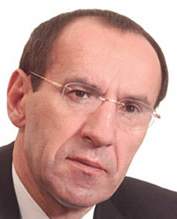
Batdyev |
Batbold, Sükhbaataryn (b. June 24, 1963, Ulaanbaatar, Mongolia), foreign minister (2008-09) and prime minister (2009-12) of Mongolia. He was also minister of industry and trade (2004-06).
Batdyev, Mustafa (Azret-Aliyevich) (b. Dec. 24, 1950, Kazakh S.S.R.), president of Karachayevo-Cherkessia (2003-08).
Bates, Edward (b. Sept. 4, 1793, Goochland county, Va. - d. March 25, 1869, St. Louis, Mo.), U.S. attorney general (1861-64); brother of Frederick Bates.
Bates, Frederick (b. June 23, 1777, Goochland county, Va. - d. Aug. 4, 1825, St. Louis county, Mo.), governor of Missouri (1812-13 [acting], 1824-25).
Bates Hidalgo, Luis (Sergio) (b. 1934), justice minister of Chile (2003-06).
Bath, Thomas Thynne, (1st) Marquess of (b. Sept. 13, 1734 - d. Nov. 19, 1796, London, England), lord lieutenant of Ireland (1765); great-grandnephew of Thomas Thynne, Viscount Weymouth. He was also British secretary of state for the Northern (1768, 1779) and Southern (1768-70, 1775-79) departments. He succeeded as (3rd) Viscount Weymouth in 1751 and was created Marquess of Bath in 1789.
Bath, William Pulteney, (1st) Earl of (b. March 22, 1684 - d. July 7, 1764, Westminster [now part of London], England), British secretary at war (1714-17) and first lord of the treasury (1746). He was created Earl of Bath, Viscount Pulteney, and Baron Hedon in 1742.
Bathily, Abdoulaye (b. 1947, Tiyabu [now in Bakel département], Senegal), Senegalese politician. He has been a minor presidential candidate (1993, 2007), minister of environment and protection of nature (1993-98) and energy and water resources (2000-01), UN special representative for Central Africa (2014-16), and special adviser of the UN secretary-general on Madagascar (2018- ).
Bathurst, Henry Bathurst, (2nd) Earl (b. May 20, 1714, Westminster, London, England - d. Aug. 6, 1794, Oakley Grove, near Cirencester, Gloucestershire, England), British politician. He was lord chancellor (1771-78) and lord president of the council (1779-82). He was created Baron Apsley in 1771 and succeeded as earl in 1775.
Bathurst, Henry Bathurst, (3rd) Earl (b. May 22, 1762 - d. July 27, 1834, London, England), British foreign secretary (1809) and war and colonial secretary (1812-27); son of Henry Bathurst, (2nd) Earl Bathurst. He was also president of the Board of Trade (1807-12) and lord president of the council (1828-30). He succeeded as earl in 1794.
Batikyan, Bagrat (S.), first secretary of the Communist Party committee of Nagorny Karabakh (1933-34).
Batinic, Mirko (b. May 30, 1956, Travnik [now in Federation of Bosnia and Herzegovina]), premier of Central Bosnia (1998-99).
Batista, Abdon (b. July 30, 1851, Salvador, Bahia, Brazil - d. March 15, 1922, Joinville, Santa Catarina, Brazil), acting president (1889) and acting governor (1906) of Santa Catarina. He was also mayor of Joinville (1893-94, 1915-21).
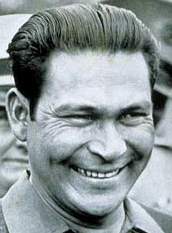
F. Batista |
Batista (y Zaldívar), (Rubén) Fulgencio, original name Rubén Zaldívar (b. Jan. 16, 1901, Banes, Oriente province, Cuba - d. Aug. 6, 1973, Marbella, Spain), president of Cuba (1940-44, 1952-59). He rose from the ranks of the army in which he enlisted in 1921, becoming sergeant and developing a large personal following. He played a leading part in the "sergeants' revolt" of September 1933, which toppled Carlos Manuel de Céspedes, the provisional president who had just replaced the dictatorial regime of Gerardo Machado y Morales. Batista became the most powerful man in Cuba, but he preferred to consolidate his control through patronage rather than terror, cultivating the support of the army, the civil service, and organized labour. Ruling through associates the first few years, he was elected president in 1940. While greatly enriching himself, he also governed the nation most effectively, expanding the educational system, sponsoring a huge program of public works, and fostering economic growth. Retiring from office in 1944, he traveled abroad and lived for a while in Florida. He returned in 1949 when he was elected a senator. During the eight years that he was out of power in Cuba, there was a resurgence of corruption on a grand scale, and his return to power through another army revolt in March 1952 was widely welcomed. But he returned as a brutal dictator, suspending constitutional guarantees, banning strikes, canceling elections, controlling the press, and embezzling huge sums from the soaring economy. His regime was finally toppled by rebel forces led by Fidel Castro. Faced with the collapse of his regime, Batista fled with his family to the Dominican Republic on Jan. 1, 1959. Later he went into exile on the Portuguese island of Madeira and finally to Estoril, near Lisbon.
Batista, Nilo (b. April 17, 1944, Natal, Rio Grande do Norte, Brazil), acting governor of Rio de Janeiro (1994-95).
Batista, Paulo Nogueira (b. Oct. 4, 1929, Recife, Brazil - d. July 31, 1994, Rio de Janeiro, Brazil), Brazilian diplomat. He was permanent representative to the United Nations (1987-90).
Batista, Pedro Ernesto (b. Sept. 25, 1884, Recife, Pernambuco, Brazil - d. Aug. 10, 1942, Rio de Janeiro, Brazil), federal interventor (1931-34) and prefect (1935-36) of Distrito Federal.
Batiuk, Viktor (Havrylovych) (b. March 15, 1939, Mostovka, Sverdlovsk oblast, Russian S.F.S.R. - d. [automobile accident] Dec. 2, 1996, near Latorytsia village, Zakarpattya oblast, Ukraine), Ukrainian diplomat. He was permanent representative to the United Nations (1992-93) and ambassador to Canada (1994-96).
Batliner, Gerard (b. Dec. 9, 1928, Eschen, Liechtenstein - d. June 25, 2008, Eschen), head of government of Liechtenstein (1962-70). He was also president of the Diet (1974-78).
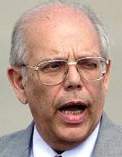
Jorge Batlle | 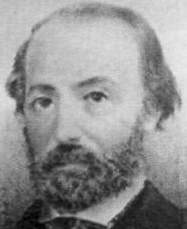
Lorenzo Batlle |
Batlle (Ibáñez), Jorge (Luis) (b. Oct. 25, 1927, Montevideo, Uruguay - d. Oct. 24, 2016, Montevideo), president of Uruguay (2000-05); son of Luis Batlle Berres. He was an unsuccessful presidential candidate in 1971, 1989, and 1994 before winning in 1999.
Batlle (y Grau), Lorenzo (Cristóbal Manuel) (b. Aug. 10, 1810, Montevideo, Uruguay - d. May 8, 1887, Montevideo), president of Uruguay (1868-72). He was also minister of war (1847-51, 1853, 1854-55, 1865-68) and finance (1856-57).
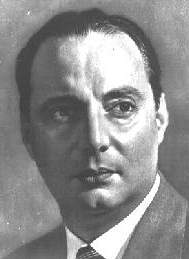
Luis Batlle |
Batlle Berres, Luis (Conrado) (b. Nov. 26, 1897, Montevideo, Uruguay - d. July 15, 1964, Montevideo), president of Uruguay (1947-51); nephew of José Batlle y Ordóñez. He was a member of the Chamber of Deputies in 1923-33 and 1942-47 and was president of that body in 1943-45. A fiery democrat, he was elected vice president in 1946 and succeeded to the presidency when the incumbent, Tomás Berreta, died in office. His stable and peaceful administration attracted large amounts of foreign investment capital. He founded the newspaper Acción in Montevideo in 1948 and made it the mouthpiece of his political faction. After Uruguay adopted a form of government in which the executive branch consisted of a nine-man council, Batlle was elected head of the council for 1955-56 and remained a member of it until 1959, after his Colorado Party was overwhelmed by the opposition Blanco Party in the November 1958 elections. When he paid a visit to the U.S. in December 1955, he was warmly welcomed as leader of one of the most democratic nations in the world. He criticized the U.S. for encouraging "strongman" governments in Latin America, which he said were the "very best breeding ground" of Communism. His visit provoked an editorial fight between his newspaper and El Nacional, published by opposition congressman Washington Guadalupe. Guadalupe challenged Batlle to a duel, but a three-man court of honour ruled that there were no grounds for one. On Nov. 22, 1957, however, he fought a sabre duel with Gen. Juan Pedro Ribas, a former defense minister. Batlle resented a charge by Ribas that the former president had ordered him shadowed by the police. Batlle was cut on the right arm and Ribas on the right hand; a physician then ordered the duel stopped.
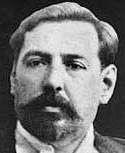
José Batlle |
Batlle y Ordóñez, José (Pablo Torcuato) (b. May 21, 1856, Montevideo, Uruguay - d. Oct. 20, 1929, Montevideo), president of Uruguay (1903-07, 1911-15); son of Lorenzo Batlle. On June 16, 1886, he founded the newspaper El Día, which became the mouthpiece of the Colorado Party, one of Uruguay's two ruling political parties. In the 1890s he was elected to the Chamber of Deputies and later to the Senate. He soon became president of the Senate and a member of his party's National Executive Commission. In 1900 he unsuccessfully ran for president. He was elected president in 1903, but by a narrow margin that produced tension with the opposition Blanco Party and led to a civil war in 1904. He and his followers emerged victorious in 1905, with the Colorado Party in undisputed control of the country. He held honest new elections in 1905, which he and his party won. At the end of his term in 1907, he freely stepped down from the presidency. After a triumphant tour of Europe, he was reelected in 1911 and continued the reforms he had started earlier. During his two periods in office, he inaugurated labour reforms, limited the profits of foreign-owned businesses, encouraged migration, nationalized and developed public works, ended the death penalty, and protected illegitimate children. At the end of his presidency, fearing the power of a one-man executive, he sought to reform the constitution by creating a collegiate executive. This effort aroused great opposition, and a new constitution established in 1918 provided for a bifurcated executive - a president and national executive council - which was considered a defeat for Batlle. Nevertheless, he agreed to serve as president of the council in 1921-23 and 1927-28.
Batmanov, Aleksey (Vasilyevich) (b. Aug. 15, 1939, Syktyvkar, Komi A.S.S.R., Russian S.F.S.R.), first secretary of the Communist Party committee of the Komi A.S.S.R. (1990-91).

Batmönkh |
Batmönkh, Jambyn, also spelled Jambyn Batmönh, or Zhambyn Batmunkh (b. March 10, 1926, Khyargas district, Ubsa-Nur region, Mongolia - d. April 14, 1997), head of state of Mongolia (1984-90). Joining the Mongolian People's Revolutionary Party in 1948, he was elected a Central Committee (CC) candidate member in 1971 and a full member three years later, when he also became a member of the Politburo. In 1973 he was made head of the CC department of science and education. The following year he was appointed deputy chairman and then chairman of the Council of Ministers, thus taking over the premiership from Yumjaagiyn Tsedenbal, who became head of state. Tsedenbal was removed from his posts as head of state and party chief in August 1984 at an extraordinary session of the CC. Batmönkh replaced him as first secretary of the party and, on December 12, as chairman of the Presidium of the People's Great Khural (head of state). Tsedenbal's poor state of health was said to be the reason for the change of leadership. One of Batmönkh's first functions after taking over as head of state was to welcome Soviet Communist Party General Secretary Mikhail Gorbachev to Ulaanbaatar in August 1985. Replying to Gorbachev's toast at a state banquet, Batmönkh proclaimed Mongolia a faithful ally of the Soviet Union and a partner in joint efforts to maintain peace and security in the Far East.
Batocki-Friebe, Adolf (Max Johannes Otto Tortilowicz) von (b. July 31, 1868, Bledau, near Königsberg, Prussia [now part of Zelenogradsk, Kaliningrad oblast, Russia] - d. May 22, 1944, Bledau), Oberpräsident of Ostpreussen (1914-16, 1918-19). He was also German "food dictator" (1916-17).
Batolov, Kosta, byname of Konstantin Dobrev Batolov (b. Jan. 3, 1878 [Dec. 22, 1877, O.S.], Sopot, Ottoman Empire [now in Bulgaria] - d. Aug. 2, 1938, Paris, France), foreign minister of Bulgaria (1934-35). He was also mayor of Sofia (1910-11, 1920-22) and minister to France (1931-34, 1935-38), Spain (1932-34), and Belgium (1933-34).
Batovy, Manoel de Almeida da Gama Lobo Coelho d'Eça, barão de (b. April 15, 1828, Desterro [now Florianópolis], Santa Catarina, Brazil - d. [executed] April 25, 1894, Fortaleza de Anhatomirim, Santa Catarina), president of Mato Grosso (1883-84). He was made baron in 1879.
Batran, Mustapha (b. 1922, Mao, Chad), Chadian politician. He was minister of transport (1963-64) and civil service (1971-73) and ambassador to the Central African Republic (1970-71).
Batres (Galeano), César A(ugusto) (b. Oct. 29, 1934, Gracias, Honduras - d. Oct. 25, 2016, Tegucigalpa, Honduras), foreign minister of Honduras (1972-74). His daughter Mireya Batres Mejía (b. Jan. 3, 1962), ex-fiancée of Ricardo Maduro, was minister of culture, arts, and sports (2002-04).
Batres, Marco Antonio (b. June 10, 1902, Gracias, Honduras - d. 1984, Tegucigalpa, Honduras), finance minister of Honduras (1949-54). He was also minister to El Salvador (1941-43), ambassador to Nicaragua (1945-48), and permanent representative to the United Nations (1957).
Batshu, Edwin (Jenamiso) (b. June 21, 1947, Maitengwe, Bechuanaland [now Botswana]), acting defense minister (2011) and home affairs minister (2011- ) of Botswana. He was also police commissioner (2004-07).
Batsiua, Mathew (Jansen Detumarong) (b. May 26, 1971), foreign minister of Nauru (2011). He was also chief secretary (1999-2002), minister of health (2007-11) and justice (2008-11), and minister assisting the president (2011).
Batt, Phil(ip Eugene) (b. March 4, 1927, Wilder, Idaho - d. March 4, 2023), governor of Idaho (1995-99). The Republican was elected to the state House in 1964, became a state senator in 1967, was elected lieutenant governor in 1978, and ran for governor in 1982, losing to John Evans by a 51%-49% margin. In a state as sparsely populated as Idaho, genuinely talented politicians are fairly rare; Batt seems to have shown talent in the legislature and had great success as Republican state chairman in 1992. He believed "the private sector can do nearly anything better than the government," and opposed higher taxes and heavy regulation. Batt's election in 1994 came only after a serious contest. He won his primary 48%-33% and then had to face Attorney General Larry EchoHawk. EchoHawk is a Pawnee Indian, and newspapers in and out of Idaho dwelled on the possibility that he would be the first Native American elected governor of any state. But other factors were more important. One was his profession of friendship for Pres. Bill Clinton - a distinct minus in the state, despite EchoHawk's opposition to gun control and some Clinton Interior policies. Another was the fact that EchoHawk is a Mormon, and he received many contributions from prominent Utah Republican Mormons. In November EchoHawk split the Idaho Mormon vote evenly and, as a result, ran even with Batt in usually Republican eastern Idaho. But Batt narrowly carried the often Democratic panhandle 48%-47%, for a 52%-44% final victory. During the campaign both candidates were able to agree on one issue: Idaho had a ballot proposition banning gay-rights laws; it was opposed by both Batt and EchoHawk and lost 50.4%-49.6%.
Batthyány (de Németújvár), Tivadar gróf (b. Feb. 23, 1859, Zalaszentgrót, Hungary - d. Feb. 2, 1931, Budapest, Hungary), interior minister of Hungary (1918). He was also minister a latere (1917, 1918) and minister of public welfare and labour (1917-18).
Battle, John S(tewart) (b. July 11, 1890, New Bern, N.C. - d. April 9, 1972, Charlottesville, Va.), governor of Virginia (1950-54).
Battle, William C(ullen) (b. Oct. 9, 1920, Charlottesville, Va. - d. May 31, 2008, Charlottesville), U.S. diplomat; son of John S. Battle. He was ambassador to Australia (1962-64).

Battsetseg |
Battsetseg, Batmunkh (b. 1973, Bayankhongor province, Mongolia), foreign minister of Mongolia (2021- ).
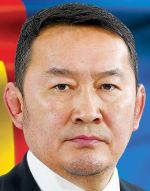
Battulga | 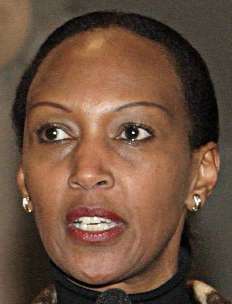
Batumubwira |
Battulga, Khaltmaa(giyn) (b. March 3, 1963, Ulaanbaatar, Mongolia), president of Mongolia (2017-21). A prominent wrestler, he was also minister of roads, transport, construction, and urban planning (2008-12) and industry and agriculture (2012-14).
Batu, Inal (b. Sept. 24, 1936, Ankara, Turkey - d. Aug. 5, 2013, Istanbul, Turkey), Turkish diplomat. He was ambassador to Cyprus (1979-84), North Cyprus (1984), Pakistan (1984-87), Czechoslovakia/Czech Republic (1989-93), and Italy (1998-99) and permanent representative to the United Nations (1993-95).
Batumubwira, Antoinette (b. 1956, Ngozi, Burundi), foreign minister of Burundi (2005-09); wife of Jean-Marie Ngendahayo.
Batyev, Salikh (Gilimkhanovich) (b. Nov. 24 [Nov. 11, O.S.], 1911, Novo-Dyumeyevo, Ufa province [now in Bashkortostan republic], Russia - d. Dec. 7, 1985), chairman of the Presidium of the Supreme Soviet of the Tatar A.S.S.R. (1960-83).
Batyrmurzayev, Abdul-Gamid (Nukhayevich) (b. 1903, Aktay, Dagestan oblast [now republic], Russia - d. 1957), chairman of the Presidium of the Supreme Soviet of the Dagestan A.S.S.R. (1950-52).
Batyrov, Shadzha (Batyrovich) (b. Oct. 3 [Sept. 20, O.S.], 1908, Desht, Zakaspiyskaya oblast, Russia [now in Turkmenistan] - d. Oct. 14, 1965, Ashkhabad, Turkmen S.S.R. [now Ashgabat, Turkmenistan]), first secretary of the Communist Party of the Turkmen S.S.R. (1947-51). He was also chairman of the Supreme Soviet (1947-48) and president of the Academy of Sciences (1959-65).
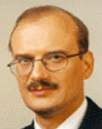
Bauc | 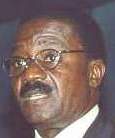
J. Baudin |
Bauc, Jaroslaw (b. Dec. 1, 1957, Lódz, Poland), finance minister of Poland (2000-01).
Baudin, Auguste (Laurent François) (b. Nov. 21, 1800, Hoogstraeten, Belgium - d. Aug. 1, 1877, Douai, Nord, France), governor of Senegal (1847-50), commandant of the Naval Division of the Western Coasts of Africa (1848, 1851-54), and governor of French Guiana (1856-59).
Baudin, Jacques (b. Aug. 14, 1939, Diourbel, Senegal - d. Nov. 25, 2018, Dakar, Senegal), foreign minister of Senegal (1998-2000). He was also minister of tourism and environment (1990-93) and justice (1993-98).
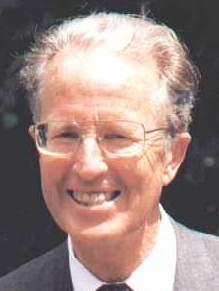
Baudouin |
Baudouin I (Dutch Boudewijn, German Balduin), in full Baudouin Albert Charles Léopold Axel Marie Gustave of Saxe-Coburg-Gotha (b. Sept. 7, 1930, Stuyvenberg Castle, near Brussels, Belgium - d. July 31, 1993, Motril, Spain), king of Belgium (1951-93). The elder son of Léopold III and Queen Astrid, he lost his mother in a motor accident just before he was five and he was almost ten when Belgium was invaded by the Germans during World War II. Baudouin shared his father's internment by the Germans (June 1944-May 1945) and his subsequent voluntary exile in Switzerland. He was for the most part privately educated but during his father's stay at Pregny, near Geneva (1945-50), he attended a state college at Geneva. After Leopold stepped down, Baudouin acted as head of state from Aug. 11, 1950, and on July 17, 1951, he became the fifth king of the Belgians. During his long reign Baudouin served effectively as a unifying force in a country deeply divided into Flemish- and French-speaking factions, and he was respected for the impartiality with which he treated the two groups. He recognized early the imminence of Congolese independence and made a fact-finding tour of the Belgian Congo (now Congo [Kinshasa]) in December 1959; he proclaimed its independence at Léopoldville (now Kinshasa) on June 30, 1960. Baudouin was criticized, however, for his 1990 decision to step down for one day rather than assent to a government bill legalizing abortion; he was reinstated by parliament after its passage. On Dec. 15, 1960, Baudouin married a Spanish noblewoman, Doña Fabiola (Fernanda María de las Victorias Antonia Adelaida) de Mora y Aragón (b. June 11, 1928, Madrid - d. Dec. 5, 2014, Brussels). Because the royal couple were childless, Baudouin was succeeded by his brother, who became Albert II.
Baudys, Antonín (b. Sept. 9, 1946, Prague, Czechoslovakia [now in Czech Republic] - d. Aug. 24, 2010, Prague), defense minister of the Czech Republic (1992-94). He was also a deputy premier of the Czech Socialist Republic (1990-92) and a deputy prime minister and minister of transport and communications of Czechoslovakia (1992).

G. Bauer |
Bauer, Gustav (Adolf) (b. Jan. 6, 1870, Darkehmen, Prussia [now Ozersk, Kaliningrad oblast, Russia] - d. Sept. 16, 1944, Berlin, Germany), chancellor of Germany (1919-20). He joined the Social Democratic Party (SPD) in 1891. He was a co-founder of the Office Employees Association in 1895 and was its chairman until 1908. Entrusted with the leadership of the Central Workers' Secretariat of the Free Trade Unions in Berlin (1903), he subsequently served as second chairman of the General Commission of Trade Unions for all of Germany (1908-18). In 1912 he was elected to the Reichstag. He was appointed secretary of the new Labour Ministry in the last imperial cabinet under Prinz Max von Baden (October 1918), and later he served as minister of labour in the government of Philipp Scheidemann (February-June 1919). He was raised to the chancellorship after the resignation of Scheidemann (June 1919) and was charged with the thankless task of securing ratification of the Treaty of Versailles. Resigning the chancellorship shortly after an abortive coup (the Kapp Putsch of March 1920) during which the cabinet, with the exception of the vice chancellor, had left Berlin, he was subsequently retained in the governments of Hermann Müller and Joseph Wirth as minister of the treasury (1920, 1921), minister of transportation (1920), and vice chancellor (1921-22). Because of his alleged involvement in a corruption affair he was asked to resign his Reichstag seat and was expelled from the SPD in 1925. This was reversed in 1926, but in 1928 he withdrew from politics. In 1933 he was arrested for a week, accused of being involved in vast embezzlements of funds of a building and loan association of whose governing board he was a member; the charges were dropped in 1935.
Bauer, Otto (b. Sept. 5, 1881, Vienna, Austria - d. July 4, 1938, Paris, France), foreign minister of Austria (1918-19).

Baugh |
Baugh, Kenneth (Lee O'Neil) (b. Feb. 24, 1941, Montego Bay, Jamaica - d. Sept. 1, 2019), deputy prime minister and foreign minister of Jamaica (2007-12). He was health minister in 1980-89.
Baughman, U(rbanus) E(dmund) (b. May 21, 1905, Camden, N.J. - d. Nov. 6, 1978, Toms River, N.J.), chief of the U.S. Secret Service (1948-61).
Baukol, Andy, byname of Andrew P. Baukol (b. Sept. 1, 1964), acting U.S. treasury secretary (2021).
Baum, Gerhart(-Rudolf) (b. Oct. 28, 1932, Dresden, Germany), interior minister of West Germany (1978-82).
Baumanis, Aivars (b. Dec. 23, 1937, Riga, Latvia - d. Aug. 15, 2019), Latvian diplomat. He was permanent representative to the United Nations (1991-97) and ambassador to Denmark and Iceland (1998-2003).
Baumann, Johannes (b. Nov. 27, 1874, Herisau, Appenzell Ausserrhoden, Switzerland - d. Sept. 8, 1953, Herisau), president of Switzerland (1938). He was also Landammann of Appenzell Ausserrhoden (1910-13, 1916-19, 1921-24, 1927-30), president of the Council of States (1920-21), and minister of justice and police (1934-40) and foreign affairs (acting, 1940).
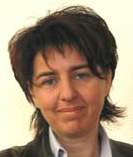
Baume-Schneider |
Baume-Schneider, Elisabeth (b. Dec. 24, 1963, Les Bois, Jura, Switzerland), president of the government of Jura (2006, 2008, 2012) and Swiss minister of justice and police (2023- ).
Baumgartner, Wilfrid (Siegfried) (b. May 21, 1902, Paris, France - d. June 1, 1978, Paris), governor of the Banque de France (1949-60) and French minister of finances and economic affairs (1960-62).

Baunsgaard |
Baunsgaard, Hilmar (Tormod Ingolf) (b. Feb. 26, 1920, Slagelse, Denmark - d. June 30, 1989), prime minister of Denmark (1968-71). He joined the youth organization of the Radical Liberal Party in 1936 and was on the executive committees of both the youth branch (1948-55; chairman 1948-51) and the party itself (1948-57, 1960-76). He entered the Folketing (parliament) in 1957 and served as minister of commerce (1961-64) in the cabinet of Viggo Kampmann. He was a leading spokesman of the non-Socialist opposition during the 1960s and '70s and prime minister of the "bourgeois" Conservative-Liberal coalition that displaced the Socialist government from 1968 to 1971. As prime minister, Baunsgaard supported the abolition of the pornography laws and worked for Denmark's entry into the European Communities. During his tenure, however, the economy worsened, and the government was forced to increase taxes. After the Socialists regained power in the 1971 general election, Baunsgaard remained leader of the Radical Liberals. He retired from the Folketing in 1977.
Baur, Charles (b. Dec. 20, 1929, Paris, France - d. Jan. 2, 2015, Morocco), president of the Regional Council of Picardie (1976-78, 1985-2004).
Baust, Gundolf (b. July 24, 1941 - d. Dec. 9, 2004), chairman of the District Council of Frankfurt (1989-90).
Bautista Castillo, Gonzalo (b. Jan. 1, 1896, Puebla, Puebla, Mexico - d. Oct. 7, 1952), governor of Puebla (1941-42). He was also mayor of Puebla (1940-41).
Bautista O'Farril, Gonzalo (b. April 16, 1922, Puebla, Puebla, Mexico - d. July 16, 2006), governor of Puebla (1972-73); son of Gonzalo Bautista Castillo. He was also mayor of Puebla (1972).

Bauzá |
Bauzá, Eduardo (b. Nov. 16, 1939, Mendoza province, Argentina - d. Feb. 17, 2019), cabinet chief of Argentina (1995-96). He was also minister of interior (1989) and public health (1989-90).
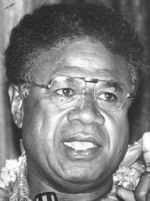
Bavadra |
Bavadra, Timoci (Uluivuda) (b. Sept. 22, 1934, Namoi village, near Lautoka, Fiji - d. Nov. 3, 1989, Suva, Fiji), prime minister of Fiji (1987). He was an ethnic Fijian and the leader of the centre-left Fiji Labour Party (FLP), which was primarily supported by the Indian community. After the April 1987 general election he was named to head a coalition cabinet with the National Federation Party (NFP) to end 17 years of rule by the conservative Alliance Party of Kamisese Mara. His election resulted in demonstrations against the government by ethnic Fijians who feared that ethnic Indians would be favoured. After only a month in office Bavadra was ousted in a military coup led by Lt.Col. Sitiveni Rabuka. He was briefly held under house arrest while Rabuka established a military government. After Bavadra's death, his widow, Adi Kuini Bavadra, later known as Adi Kuini Speed (b. Dec. 23, 1949 - d. Dec. 31, 2004), took over as FLP president until 1991, and became leader of the Fijian Association Party in 1998, serving as deputy prime minister in 1999-2000.
Bavier, Johann Baptist (baptized Sept. 3, 1795, Chur, Switzerland - d. Sept. 19, 1856, Zürich, Switzerland), president of the Small Council of Graubünden (1838); son-in-law of Valentin Roffler.
Bavier, Simeon (b. Sept. 16, 1825, Chur, Switzerland - d. Jan. 27, 1896, Basel, Switzerland), president of Switzerland (1882); son of Johann Baptist Bavier. He was also minister of finance and customs (1879) and posts and railways (1880-81) and minister to Italy (1883-95).
Bavuidi Babingi, Séraphin (b. Oct. 30, 1946), governor of Bas-Congo (1999-2001).
Bawa, Mohammed (Inua) (b. April 6, 1954, Yauri [now in Kebbi state], Nigeria - d. May 26, 2017, Jos, Nigeria), administrator of Ekiti (1996-98) and Gombe (1998-99).
Bawoyeu, Jean Alingué (b. Aug. 18, 1937, Fort-Lamy [now N'Djamena] or Draï-Ngolo, Chad), acting president (1990) and prime minister (1991-92) of Chad. He was also ambassador to the United States (1974-76) and France (1977-79), permanent representative to the United Nations (1974-75), speaker of parliament (1990), minister of agriculture (1990-91), justice (2008-10), and posts and new information technologies (2010-13), and a presidential candidate in 1996 (8.3% of the vote) and 2001 (2.2%).
Baxter, Percival P(roctor) (b. Nov. 22, 1876, Portland, Maine - d. June 12, 1969, Portland), governor of Maine (1921-25).
Bay Valenzuela, Alejo (R.) (b. Jan. 15, 1891, Alamos, Sonora, Mexico - d. Jan. 30, 1952, Rochester, Minn.), governor of Sonora (1923-27).
Bayalinov, Kamil (Marklenovich) (b. Dec. 15, 1959, Frunze, Kirgiz S.S.R. [now Bishkek, Kyrgyzstan]), Kyrgyz diplomat. He was ambassador to Austria, Hungary, and the Czech Republic (1996-2000) and permanent representative to the United Nations (2001-04).
Bayandin, Lev (Sergeyevich) (b. Jan. 2, 1942, Cherdyn, Molotov oblast, Russian S.F.S.R. [now in Perm kray, Russia] - d. Feb. 14, 2018), chairman of the executive committee (1988-90) and head of the administration (1991-94) of Yamalo-Nenets autonomous okrug.
Bayar, (Burhan) Cahit (b. 1935, Sivas, Turkey - d. Dec. 10, 2022, Ankara, Turkey), interior minister of Turkey (1999). He was also governor of Diyarbakir (1977-78), Malatya (1978), Erzurum (1979-81), Ankara (1984-88), and Istanbul (1988-91) and ambassador to North Cyprus (1991-95).

M.C. Bayar |
Bayar, Mahmut Celal, before 1935 Mahmut Celal Bey (b. May 15, 1883, Umurbey, near Bursa, Ottoman Empire [now in Turkey] - d. Aug. 22, 1986, Istanbul, Turkey), president of Turkey (1950-60). He became involved with the Committee of Union and Progress directed against Sultan Abdülhamit's autocratic rule, and served as the secretary of its Smyrna branch. With the collapse of the Ottoman Empire at the end of World War I, he joined the movement of Mustafa Kemal (later Atatürk) to resist the Allied occupation of Anatolia. In January 1920 he was elected to the last Ottoman parliament; when the parliament was suppressed and the British arrested the nationalists, he escaped to Ankara, where Mustafa Kemal had convened the Grand National Assembly (GNA). Bayar served as economy minister (1921-22) in the government of the GNA and for a time (1922-24) as minister of reconstruction and settlement. In 1932 Bayar, then an exponent of a state-operated economy, became economy minister and contributed to the development of Turkey's industries and mines. In 1937-39 he was prime minister. In 1945 he resigned from parliament and from the Republican People's Party. In January 1946 he helped organize the Democrat Party, which under his leadership won a landslide victory at the election of May 1950, whereupon he was elected president. He was reelected in 1954 and 1957. He was the architect of an economic policy which gave priority to private enterprise. Arrested during the military coup of May 1960, he was tried on dubious charges of crimes against the state and was sentenced to death (September 1961). Because of his advanced age, the sentence was commuted to life imprisonment. Released for reasons of health in 1964, he was pardoned in 1966, though his civil rights were not restored until 1974.

S. Bayar |
Bayar, Sanj(aagiyn) (b. 1956, Ulaanbaatar, Mongolia), prime minister of Mongolia (2007-09). He was also ambassador to Russia (2001-05) and the United Kingdom (2017-18).
Bayard, Richard H(enry) (b. Sept. 26, 1796, Wilmington, Del. - d. March 4, 1868, Philadelphia, Pa.), U.S. politician; grandson of Richard Bassett. He was a senator from Delaware (1836-39, 1841-45) and chargé d'affaires in Belgium (1851-53).
Bayard, Thomas F(rancis) (b. Oct. 29, 1828, Wilmington, Del. - d. Sept. 28, 1898, Dedham, Mass.), U.S. secretary of state (1885-89); nephew of Richard H. Bayard. He was also ambassador to the United Kingdom (1893-97).
Bayardelle, (Ange Marie Charles) André (b. Feb. 18, 1896, Basse-Pointe, Martinique - d. May 3, 1947, Paris, France), governor of French Somaliland (1942-43) and governor-general of French Equatorial Africa (1944-46).
Bayardi (Lozano), José (Arturo) (b. June 30, 1955, Montevideo, Uruguay), defense minister of Uruguay (2008-09, 2019-20). He was also minister of labour and social security (2013-15).
Bayati, Hamid al- (b. 1952, Baghdad, Iraq), Iraqi diplomat. He was permanent representative to the United Nations (2006-12).
Baybakov, Nikolay (Konstantinovich) (b. March 7 [Feb. 22, O.S.], 1911, Sabunchi, Baku province, Russia [now Sabunchu, Azerbaijan] - d. March 31, 2008, Moscow, Russia), Soviet politician. He was people's commissar/minister of oil industry (1944-46, 1948-55) and oil industry in southern and western regions (1946-48), chairman of the State Commission for Advanced Planning of the National Economy (1955-57), the state committees for Chemical Industry (1963), Chemical and Oil Industry (1963-64), and Oil Industry (1964-65), and the State Planning Committee (1965-85), and a deputy premier (1965-85) of the U.S.S.R. and first deputy premier and chairman of the State Planning Commission of the Russian S.F.S.R. (1957-58).
Baybek, Bauyrzhan (Kadyrgaliyevich) (b. March 19, 1974, Alma-Ata, Kazakh S.S.R. [now Almaty, Kazakhstan]), head of Almaty city (2015-19).
Baychurin, Gumer (Gilyazetdinovich) (b. 1890, Srednyaya Mesha, Kazan province [now in Tatarstan republic], Russia - d. [executed] May 9, 1938, Kazan, Tatar A.S.S.R., Russian S.F.S.R.), chairman of the Central Executive Committee of the Tatar A.S.S.R. (1934-37). He was also people's commissar of workers' and peasants' inspection (1927-34).
Baydur, Mehmet (b. 1918, Gerze, Ottoman Empire [now in Sinop province, Turkey] - d. Jan. 25, 1993, Ankara, Turkey), Turkish politician/diplomat. He was minister of trade (1960-61) and ambassador to West Germany (1961-64), Canada (1965-68), Australia (1968-72), Sweden (1976-79), and Spain (1979-83).
Bayekenov, Bulat (Abdrakhmanovich) (b. Nov. 21, 1942, Guryev, Kazakh S.S.R. [now Atyrau, Kazakhstan]), interior minister of Kazakhstan (1994-95). He was also chairman of the Committee for State Security (from 1992, National Security) (1991-93) and secretary of the Security Council (1994).
Bayev, Nikolay (Ivanovich) (b. May 9, 1945, Vasilevka, Saratov oblast, Russian S.F.S.R.), head of Mangistau oblast (1997-99). He was also first secretary of the party committee (1988-91) and mayor (1991-94) of Shevchenko/Aktau and Kazakh minister of ecology and bioresources (1995-97).
Baygeldi, Omirbek (Baygeldiyevich) (b. April 15, 1939, Kzyl-Oktyabr, Dzhambul [now Zhambyl] oblast, Kazakh S.S.R.), chairman of the Executive Committee (1990), first secretary of the party committee (1990-91), and head (1992-95) of Zhambyl oblast.
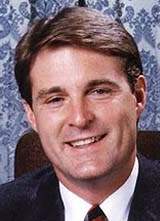
Bayh |
Bayh, Evan, byname of Birch Evans Bayh III (b. Dec. 26, 1955, Shirkieville, Ind.), governor of Indiana (1989-97). A Democrat, he was first elected governor of Indiana at 32, running as a determined opponent of higher taxes and a less venturesome government activist than his Republican opponent, Lieutenant Governor John Mutz. He was reelected in 1992 by a wide margin. In office, Bayh abolished the license plate fund and made Indiana one of only two states not to raise taxes since 1989. He helped attract a 7,500-worker United Airlines repair facility to Indianapolis, but failed in his push for a third Chicago regional airport in Gary. Bayh squeezed spending out of non-education programs and sponsored innovations in education. He is proud of the "world-class" standards enforced by written tests now required in Indiana for high school graduation. Other innovations include adult literacy, healthcare access and other services for pre-schoolers, experimental Discovery Schools for high schoolers and college tuition for at-risk youths who pledge to graduate from high school and stay off drugs. Bayh argues that high schools now are not adequately preparing kids. In national politics, Bayh attacked Republican governors for elbowing Democrats out of the national debate on the balanced budget amendment. Some Democrats saw Bayh as an attractive national candidate. Bayh's popularity helped Democrats win other offices, though they were set sharply back in 1994. His ally Joe Hogsett was elected secretary of state in 1990 but lost Senate and House races in 1992 and 1994; Democrat Pam Carter, a black woman, was elected attorney general in 1992. Bayh could not run again in 1996. He was elected to the U.S. Senate in 1998 and again in 2004.
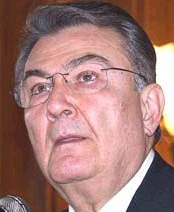
Baykal |
Baykal, Deniz (b. July 20, 1938, Antalya, southeastern Turkey - d. Feb. 11, 2023, Ankara, Turkey), finance minister (1974) and foreign minister and deputy prime minister (1995-96) of Turkey. He was also minister of energy and natural resources (1978-79). The suave and dynamic head of Turkey's oldest political party, the Republican People's Party, Baykal's leftists held the balance of power in parliament before 1999. But he lost ground to his left-wing rival Bülent Ecevit and in the 1999 election his party failed to beat the 10% barrier needed to win seats in parliament. In the wake of this defeat he stepped down as leader of the party, but he was reelected to the position on Sept. 30, 2000. He resigned on May 10, 2010, after an Internet video appeared to show him in a bedroom with a female lawmaker from his party.
Baykenov, Kadyr (Karkabatovich) (b. Oct. 10, 1944, Kumashkino [now Kurchum], Vostochno-Kazakhstan oblast, Kazakh S.S.R. - d. Aug. 31, 2022), Kazakh politician. He was a deputy premier of the Kazakh S.S.R. (1987-89), first secretary of the Communist Party committee of Alma-Ata city (1989-91), and a deputy prime minister (1991-93) and minister of energy and fuel resources (1992-94) of Kazakhstan.
Baykhanov, Asain (Kuandykovich) (b. Dec. 6, 1978, Bayanaul rayon, Pavlodar oblast, Kazakh S.S.R.), head of Pavlodar oblast (2022- ). He was also mayor of Pavlodar (2021-22).

A.D. Bayle |
Bayle, Abdirahman Duale, Somali Cabdiraxmaan Ducaale Bayle (b. 1955?), foreign minister (2014-15) and finance minister (2017-22) of Somalia.
Bayle, Pierre (Marie) (b. Dec. 15, 1952, Epernay, Marne, France), prefect of Mayotte (1998-2001). He was also prefect of the départements of Aveyron (2001-04) and Aisne (2009-13).
Baylón Chacón, Óscar (b. April 24, 1927, Chihuahua, Chihuahua, Mexico - d. Aug. 9, 2020, Tijuana, Baja California, Mexico), governor of Baja California (1989).
Baylot, Jean (Félix) (b. March 27, 1897, Pau, France - d. Feb. 3, 1976, Paris, France), prefect of police of Paris (1951-54). He was also prefect of the départements of Basses-Pyrénées (1944-46), Haute-Garonne (1946-47), and Bouches-du-Rhône (1948-51).
Bayma, Henrique Smith (b. Dec. 20, 1891, Brotas, São Paulo, Brazil - d. June 28, 1974, São Paulo, Brazil), governor of São Paulo (1936-37).
Baymaganbetov, Serik (Nurtayevich) (b. Sept. 8, 1958, Kyzyl-Tu, Kokchetav oblast [now in Severo-Kazakhstan oblast], Kazakh S.S.R.), interior minister of Kazakhstan (2009-11).
Baynes, Edward, commissioner of Montserrat (1889-1900).
Baynes, Edward William (b. 1880 - d. March 30, 1962), administrator of Saint Lucia (1935-38); son of Edward Baynes.
Bayramov, Amangeldy (Ovezovich), economy and finance minister of Turkmenistan (1992-93). He was also ambassador to Ukraine (2000-05).

J. Bayramov |
Bayramov, Jeyhun (Aziz oglu) (b. 1973, Baku, Azerbaijan S.S.R.), foreign minister of Azerbaijan (2020- ). He was also education minister (2018-20).
Bayrou, François (René Jean Lucien) (b. May 25, 1951, Bordères, Basses-Pyrénées [now Pyrénées-Atlantiques], France), justice minister of France (2017). He was education minister in 1993-97 and a presidential candidate in 2002, 2007, and 2012. From 1998 he was president of the Union for French Democracy, and in 2007 he founded the centrist Democrat Movement.
Bayülken, (Ümit) Haluk (b. July 6, 1921, Constantinople, Ottoman Empire [now Istanbul, Turkey] - d. April 26, 2007, Ankara, Turkey), foreign minister (1971-74) and defense minister (1980-83) of Turkey and secretary-general of the Central Treaty Organization (1975-77). He was also ambassador to the United Kingdom (1966-69) and Malta (1968-69) and permanent representative to the United Nations (1969-71).
Baz Prada, Gustavo (b. Jan. 31, 1894, Tlalnepantla, México, Mexico - d. Oct. 12, 1987, Mexico City, Mexico), governor of México (1914-15, 1957-63). He was also rector of the National Autonomous University of Mexico (1938-40) and Mexican minister of health and welfare (1940-46).
Bazán (Olmos), José Dominador (b. Aug. 27, 1917, Colón, Panama - d. Oct. 20, 1996, Panama City, Panama), Panamanian politician. A conservative and free-market advocate, he was elected second vice president under Roberto Chiari (1960-64) and served as acting president for some days in April 1962. In 1968, he was elected second vice president under Arnulfo Arias, but that government was overthrown by a military coup 11 days later. The engineers of the coup offered to install Bazán as president, but he declined. Bazán also served as mayor of Colón (1948-56), interior and justice minister (1959, 1965-67), congressman, and ambassador to Brazil and Guatemala.
Bazarbayev, Muslim (Bazarbayevich) (b. May 15, 1927 - d. Nov. 9, 1995), foreign minister of the Kazakh S.S.R. (1976-81). He was also minister of culture (1970-76).
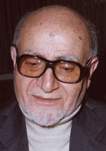
Bazargan |
Bazargan, Mehdi (b. September 1907 [other sources say 1905], Tehran, Iran - d. Jan. 20, 1995, Zürich, Switzerland), prime minister of Iran (1979). In 1951 Prime Minister Mohammad Mossadegh made him head of the newly nationalized oil industry. In 1953 the shah returned to power, and Bazargan co-founded the opposition National Resistance Movement. He left it in 1961 and took part in the formation of the Freedom Movement of Iran (FMI). In 1963 he joined the Iranian Committee for Defense of Liberty and Human Rights founded by Ayatollah Ruhollah Khomeini. He was appointed as the first prime minister of the Islamic Republic of Iran by Khomeini after the latter's return to Iran. Khomeini exercised the supreme power through a series of committees headed by younger ayatollahs, some of which acted as summary courts-martial. When Bazargan tried to transform this revolutionary procedure into a more civilized administration of justice, Khomeini accused him of weakness. He continued to override and act apart from Bazargan administratively. On several occasions Bazargan offered his resignation, which was not accepted. He represented Iran at the 25th anniversary of the Algerian nationalist uprising on Nov. 1, 1979, and met in Algiers with Zbigniew Brzezinski, U.S. president Jimmy Carter's national security advisor. On his return to Tehran he was charged by the students who had seized the U.S. embassy on November 4 with having treacherously conversed with an American. On November 6 he resigned. As a member of parliament for the FMI (the only legal opposition) in 1980-84, he criticized the Iran-Iraq war and human rights abuses. He was briefly kidnapped and roughed up in 1986 but was spared more serious persecution apparently because of Khomeini's protection.
Bazarov, Babamurad (Atamuradovich), Turkmen Babamyrat (Atamyradowiç) Bazarow (b. 1939, Chardzhou, Turkmen S.S.R. [now Türkmenabat, Turkmenistan] - d. [car accident] Feb. 1, 2002, Moscow oblast, Russia), a deputy prime minister of Turkmenistan (1992-93). He was also rector of the Turkmen Institute of National Economy (1993-97).
Bazarov, Batyr (Aganazarovich), Turkmen Batyr (Aganazarowiç) Bazarow (b. 1976, Sayat, Turkmen S.S.R. [now in Lebap velayat, Turkmenistan]), finance and economy minister of Turkmenistan (2017-20). He was also minister of economy and development (2016-17).
Bazarov, Redzhep, Turkmen Rejep Bazarow (b. 1958, Amudarya, Tashauz oblast, Turkmen S.S.R. [now Dashoguz velayat, Turkmenistan]), a deputy prime minister of Turkmenistan (2016-17). He was also minister of agriculture (2012-14).
Bazarova, Roza (Atamuradovna) (b. July 1933, Novy Chardzhuy, Turkmen S.S.R. [now Türkmenabat, Turkmenistan]), foreign minister (1985-88) and chairman of the Presidium of the Supreme Soviet (1988-90) of the Turkmen S.S.R. She was also a deputy premier (1975-85).
Bazhanov, Ivan (Mikhailovich) (b. 1896, Chistopol, Kazan province [now in Tatarstan republic], Russia - d. 1938), acting executive secretary of the Communist Party committee of the Tatar A.S.S.R. (1924). He was also people's commissar of workers' and peasants' inspection (1925-27) and commerce (1927-30).
Bazilevsky, Pyotr (Ivanovich) (b. March 17, 1831, Pustovoytovo, Poltava province, Russia [now in Ukraine] - d. Oct. 6, 1883), governor of Kovno (1874-79).
Bazin, Jean-François (Marie Henri) (b. July 26, 1942, Dijon, France - d. April 17, 2020, Dijon), president of the Regional Council of Bourgogne (1993-98).
Bazin, Marc (Louis) (b. March 6, 1932, Saint-Marc, Haiti - d. June 16, 2010, Laboule, Haiti), finance minister (1982) and prime minister and acting president (1992-93) of Haiti. He was a presidential candidate in 1990 (winning 15% of the vote) and 2006 (0.7%).
Bazo, Lorenzo, finance minister of Peru (1829, 1838-39).
Bazoche, Charles (Louis Joseph) (b. Oct. 21, 1784, Nancy, Meurthe-et-Moselle, France - d. June 22, 1853, Brest, Finistère, France), governor of Île Bourbon (1841-46).
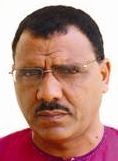
Bazoum |
Bazoum, Mohamed (b. Jan. 1, 1960, N'Guigmi, Zinder region, Niger), foreign minister (1995-96, 2011-15), interior minister (2016-20), and president (2021- ) of Niger. In 2015-16 he was minister of state at the presidency.
Bazovsky, Vladimir (Nikolayevich) (b. July 28 [July 15, O.S.], 1917, Novozybkov, Bryansk province, Russia - d. May 4, 1993, Moscow, Russia), Soviet politician. He was first secretary of the party committee of Novgorod oblast (1961-72) and ambassador to Bulgaria (1972-79) and Hungary (1982-85).
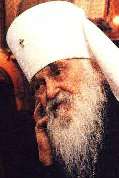
Bazyli |
Bazyli, original name Wlodzimierz Doroszkiewicz (b. March 15, 1914, Cisy village [now in Podlaskie województwo], northeastern Poland - d. Feb. 11, 1998, Warsaw, Poland), metropolitan of Warsaw and All Poland (1970-98). He attended the Orthodox Spiritual Seminary in Wilno (Vilnius). World War II stopped his higher theological studies. He completed them graduating from the Spiritual Academy with the title M.A. of theology, in Zagorsk (now Sergiyev Posad) in 1960. He obtained his first ordination in 1937, and in 1938 he received priest ordination. He led his spiritual work in the parishes of Lyskow, Hornostajewicze near Wolkowysk, Swislocz, Michalowo, and Grodek. Having taken holy orders in 1960, he obtained ordination as bishop, and became metropolitan's suffragan, with the title of bishop of Bielsk. In 1962 he became bishop of the Wroclaw-Szczecin diocese. There he stayed until his election to the metropolitan's throne. In the Wroclaw-Szczecin diocese he turned out to be a responsible organizer among the Orthodox people who appeared in these areas as a result of the "Vistula action" (resettlement of Ukrainians). After the death of Metropolitan Stefan, he was appointed to the post of Metropolitan of Warsaw and All Poland. He held the post from 1970 until his death, which followed after a long and serious illness. Thanks to his efforts two dioceses were restituted: Przemysl-Nowy Sacz and Lublin-Chelm; also the Orthodox Ordinariate of the Polish Army was created. In addition, with the metropolitan's blessing the School of Writing (Painting) Icons in Bielsk Podlaski and the Psalmist's Study in Hajnówka were formed. He also actively worked in the Polish Ecumenical Council and the World Council of Churches.
Bazzaz, Abdul Rahman al- (b. Feb. 20, 1913, Baghdad, Ottoman Empire [now in Iraq] - d. June 28, 1973, Baghdad), foreign minister (1965), prime minister (1965-66), acting president (1966), and interior minister (1966) of Iraq. He was also ambassador to the United Arab Republic (1963) and the United Kingdom (1963-64) and secretary-general of the Organization of Petroleum Exporting Countries (1964-65).








































































































































































